- Essay Guides
- Other Essays
- How to Write an Ethics Paper: Guide & Ethical Essay Examples
- Speech Topics
- Basics of Essay Writing
- Essay Topics
- Main Academic Essays
- Research Paper Topics
- Basics of Research Paper Writing
- Miscellaneous
- Chicago/ Turabian
- Data & Statistics
- Methodology
- Admission Writing Tips
- Admission Advice
- Other Guides
- Student Life
- Studying Tips
- Understanding Plagiarism
- Academic Writing Tips
- Basics of Dissertation & Thesis Writing
- Research Paper Guides
- Formatting Guides
- Basics of Research Process
- Admission Guides
- Dissertation & Thesis Guides

How to Write an Ethics Paper: Guide & Ethical Essay Examples

Table of contents
Use our free Readability checker
An ethics essay is a type of academic writing that explores ethical issues and dilemmas. Students should evaluates them in terms of moral principles and values. The purpose of an ethics essay is to examine the moral implications of a particular issue, and provide a reasoned argument in support of an ethical perspective.
Writing an essay about ethics is a tough task for most students. The process involves creating an outline to guide your arguments about a topic and planning your ideas to convince the reader of your feelings about a difficult issue. If you still need assistance putting together your thoughts in composing a good paper, you have come to the right place. We have provided a series of steps and tips to show how you can achieve success in writing. This guide will tell you how to write an ethics paper using ethical essay examples to understand every step it takes to be proficient. In case you don’t have time for writing, get in touch with our professional essay writers for hire . Our experts work hard to supply students with excellent essays.
What Is an Ethics Essay?
An ethics essay uses moral theories to build arguments on an issue. You describe a controversial problem and examine it to determine how it affects individuals or society. Ethics papers analyze arguments on both sides of a possible dilemma, focusing on right and wrong. The analysis gained can be used to solve real-life cases. Before embarking on writing an ethical essay, keep in mind that most individuals follow moral principles. From a social context perspective, these rules define how a human behaves or acts towards another. Therefore, your theme essay on ethics needs to demonstrate how a person feels about these moral principles. More specifically, your task is to show how significant that issue is and discuss if you value or discredit it.
Purpose of an Essay on Ethics
The primary purpose of an ethics essay is to initiate an argument on a moral issue using reasoning and critical evidence. Instead of providing general information about a problem, you present solid arguments about how you view the moral concern and how it affects you or society. When writing an ethical paper, you demonstrate philosophical competence, using appropriate moral perspectives and principles.
Things to Write an Essay About Ethics On
Before you start to write ethics essays, consider a topic you can easily address. In most cases, an ethical issues essay analyzes right and wrong. This includes discussing ethics and morals and how they contribute to the right behaviors. You can also talk about work ethic, code of conduct, and how employees promote or disregard the need for change. However, you can explore other areas by asking yourself what ethics mean to you. Think about how a recent game you watched with friends started a controversial argument. Or maybe a newspaper that highlighted a story you felt was misunderstood or blown out of proportion. This way, you can come up with an excellent topic that resonates with your personal ethics and beliefs.
Ethics Paper Outline
Sometimes, you will be asked to submit an outline before writing an ethics paper. Creating an outline for an ethics paper is an essential step in creating a good essay. You can use it to arrange your points and supporting evidence before writing. It also helps organize your thoughts, enabling you to fill any gaps in your ideas. The outline for an essay should contain short and numbered sentences to cover the format and outline. Each section is structured to enable you to plan your work and include all sources in writing an ethics paper. An ethics essay outline is as follows:
- Background information
- Thesis statement
- Restate thesis statement
- Summarize key points
- Final thoughts on the topic
Using this outline will improve clarity and focus throughout your writing process.
Ethical Essay Structure
Ethics essays are similar to other essays based on their format, outline, and structure. An ethical essay should have a well-defined introduction, body, and conclusion section as its structure. When planning your ideas, make sure that the introduction and conclusion are around 20 percent of the paper, leaving the rest to the body. We will take a detailed look at what each part entails and give examples that are going to help you understand them better. Refer to our essay structure examples to find a fitting way of organizing your writing.
Ethics Paper Introduction
An ethics essay introduction gives a synopsis of your main argument. One step on how to write an introduction for an ethics paper is telling about the topic and describing its background information. This paragraph should be brief and straight to the point. It informs readers what your position is on that issue. Start with an essay hook to generate interest from your audience. It can be a question you will address or a misunderstanding that leads up to your main argument. You can also add more perspectives to be discussed; this will inform readers on what to expect in the paper.
Ethics Essay Introduction Example
You can find many ethics essay introduction examples on the internet. In this guide, we have written an excellent extract to demonstrate how it should be structured. As you read, examine how it begins with a hook and then provides background information on an issue.
Imagine living in a world where people only lie, and honesty is becoming a scarce commodity. Indeed, modern society is facing this reality as truth and deception can no longer be separated. Technology has facilitated a quick transmission of voluminous information, whereas it's hard separating facts from opinions.
In this example, the first sentence of the introduction makes a claim or uses a question to hook the reader.
Ethics Essay Thesis Statement
An ethics paper must contain a thesis statement in the first paragraph. Learning how to write a thesis statement for an ethics paper is necessary as readers often look at it to gauge whether the essay is worth their time.
When you deviate away from the thesis, your whole paper loses meaning. In ethics essays, your thesis statement is a roadmap in writing, stressing your position on the problem and giving reasons for taking that stance. It should focus on a specific element of the issue being discussed. When writing a thesis statement, ensure that you can easily make arguments for or against its stance.
Ethical Paper Thesis Example
Look at this example of an ethics paper thesis statement and examine how well it has been written to state a position and provide reasons for doing so:
The moral implications of dishonesty are far-reaching as they undermine trust, integrity, and other foundations of society, damaging personal and professional relationships.
The above thesis statement example is clear and concise, indicating that this paper will highlight the effects of dishonesty in society. Moreover, it focuses on aspects of personal and professional relationships.
Ethics Essay Body
The body section is the heart of an ethics paper as it presents the author's main points. In an ethical essay, each body paragraph has several elements that should explain your main idea. These include:
- A topic sentence that is precise and reiterates your stance on the issue.
- Evidence supporting it.
- Examples that illustrate your argument.
- A thorough analysis showing how the evidence and examples relate to that issue.
- A transition sentence that connects one paragraph to another with the help of essay transitions .
When you write an ethics essay, adding relevant examples strengthens your main point and makes it easy for others to understand and comprehend your argument.
Body Paragraph for Ethics Paper Example
A good body paragraph must have a well-defined topic sentence that makes a claim and includes evidence and examples to support it. Look at part of an example of ethics essay body paragraph below and see how its idea has been developed:
Honesty is an essential component of professional integrity. In many fields, trust and credibility are crucial for professionals to build relationships and success. For example, a doctor who is dishonest about a potential side effect of a medication is not only acting unethically but also putting the health and well-being of their patients at risk. Similarly, a dishonest businessman could achieve short-term benefits but will lose their client’s trust.
Ethics Essay Conclusion
A concluding paragraph shares the summary and overview of the author's main arguments. Many students need clarification on what should be included in the essay conclusion and how best to get a reader's attention. When writing an ethics paper conclusion, consider the following:
- Restate the thesis statement to emphasize your position.
- Summarize its main points and evidence.
- Final thoughts on the issue and any other considerations.
You can also reflect on the topic or acknowledge any possible challenges or questions that have not been answered. A closing statement should present a call to action on the problem based on your position.
Sample Ethics Paper Conclusion
The conclusion paragraph restates the thesis statement and summarizes the arguments presented in that paper. The sample conclusion for an ethical essay example below demonstrates how you should write a concluding statement.
In conclusion, the implications of dishonesty and the importance of honesty in our lives cannot be overstated. Honesty builds solid relationships, effective communication, and better decision-making. This essay has explored how dishonesty impacts people and that we should value honesty. We hope this essay will help readers assess their behavior and work towards being more honest in their lives.
In the above extract, the writer gives final thoughts on the topic, urging readers to adopt honest behavior.
How to Write an Ethics Paper?
As you learn how to write an ethics essay, it is not advised to immediately choose a topic and begin writing. When you follow this method, you will get stuck or fail to present concrete ideas. A good writer understands the importance of planning. As a fact, you should organize your work and ensure it captures key elements that shed more light on your arguments. Hence, following the essay structure and creating an outline to guide your writing process is the best approach. In the following segment, we have highlighted step-by-step techniques on how to write a good ethics paper.
1. Pick a Topic
Before writing ethical papers, brainstorm to find ideal topics that can be easily debated. For starters, make a list, then select a title that presents a moral issue that may be explained and addressed from opposing sides. Make sure you choose one that interests you. Here are a few ideas to help you search for topics:
- Review current trends affecting people.
- Think about your personal experiences.
- Study different moral theories and principles.
- Examine classical moral dilemmas.
Once you find a suitable topic and are ready, start to write your ethics essay, conduct preliminary research, and ascertain that there are enough sources to support it.
2. Conduct In-Depth Research
Once you choose a topic for your essay, the next step is gathering sufficient information about it. Conducting in-depth research entails looking through scholarly journals to find credible material. Ensure you note down all sources you found helpful to assist you on how to write your ethics paper. Use the following steps to help you conduct your research:
- Clearly state and define a problem you want to discuss.
- This will guide your research process.
- Develop keywords that match the topic.
- Begin searching from a wide perspective. This will allow you to collect more information, then narrow it down by using the identified words above.
3. Develop an Ethics Essay Outline
An outline will ease up your writing process when developing an ethic essay. As you develop a paper on ethics, jot down factual ideas that will build your paragraphs for each section. Include the following steps in your process:
- Review the topic and information gathered to write a thesis statement.
- Identify the main arguments you want to discuss and include their evidence.
- Group them into sections, each presenting a new idea that supports the thesis.
- Write an outline.
- Review and refine it.
Examples can also be included to support your main arguments. The structure should be sequential, coherent, and with a good flow from beginning to end. When you follow all steps, you can create an engaging and organized outline that will help you write a good essay.
4. Write an Ethics Essay
Once you have selected a topic, conducted research, and outlined your main points, you can begin writing an essay . Ensure you adhere to the ethics paper format you have chosen. Start an ethics paper with an overview of your topic to capture the readers' attention. Build upon your paper by avoiding ambiguous arguments and using the outline to help you write your essay on ethics. Finish the introduction paragraph with a thesis statement that explains your main position. Expand on your thesis statement in all essay paragraphs. Each paragraph should start with a topic sentence and provide evidence plus an example to solidify your argument, strengthen the main point, and let readers see the reasoning behind your stance. Finally, conclude the essay by restating your thesis statement and summarizing all key ideas. Your conclusion should engage the reader, posing questions or urging them to reflect on the issue and how it will impact them.
5. Proofread Your Ethics Essay
Proofreading your essay is the last step as you countercheck any grammatical or structural errors in your essay. When writing your ethic paper, typical mistakes you could encounter include the following:
- Spelling errors: e.g., there, they’re, their.
- Homophone words: such as new vs. knew.
- Inconsistencies: like mixing British and American words, e.g., color vs. color.
- Formatting issues: e.g., double spacing, different font types.
While proofreading your ethical issue essay, read it aloud to detect lexical errors or ambiguous phrases that distort its meaning. Verify your information and ensure it is relevant and up-to-date. You can ask your fellow student to read the essay and give feedback on its structure and quality.
Ethics Essay Examples
Writing an essay is challenging without the right steps. There are so many ethics paper examples on the internet, however, we have provided a list of free ethics essay examples below that are well-structured and have a solid argument to help you write your paper. Click on them and see how each writing step has been integrated. Ethics essay example 1
Ethics essay example 2
Ethics essay example 3
Ethics essay example 4
College ethics essay example 5
Ethics Essay Writing Tips
When writing papers on ethics, here are several tips to help you complete an excellent essay:
- Choose a narrow topic and avoid broad subjects, as it is easy to cover the topic in detail.
- Ensure you have background information. A good understanding of a topic can make it easy to apply all necessary moral theories and principles in writing your paper.
- State your position clearly. It is important to be sure about your stance as it will allow you to draft your arguments accordingly.
- When writing ethics essays, be mindful of your audience. Provide arguments that they can understand.
- Integrate solid examples into your essay. Morality can be hard to understand; therefore, using them will help a reader grasp these concepts.
Bottom Line on Writing an Ethics Paper
Creating this essay is a common exercise in academics that allows students to build critical skills. When you begin writing, state your stance on an issue and provide arguments to support your position. This guide gives information on how to write an ethics essay as well as examples of ethics papers. Remember to follow these points in your writing:
- Create an outline highlighting your main points.
- Write an effective introduction and provide background information on an issue.
- Include a thesis statement.
- Develop concrete arguments and their counterarguments, and use examples.
- Sum up all your key points in your conclusion and restate your thesis statement.
Contact our academic writing platform and have your challenge solved. Here, you can order essays and papers on any topic and enjoy top quality.

Daniel Howard is an Essay Writing guru. He helps students create essays that will strike a chord with the readers.
You may also like

Essay on Ethics for Students and Children
500+ words essay on ethics.
Essay on Ethics – Ethics refers to the concepts of right and wrong conduct. Furthermore, ethics is basically a branch of philosophy dealing with the issue of morality. Moreover, ethics consist of the rules of behavior. It certainly defines how a person should behave in specific situations. The origin of ethics is old and it started from the Stone Age . Most noteworthy, over the centuries many religions and philosophers have made contributions to ethics.
Branches of Ethics
First of all, comes the descriptive branch of ethics. Descriptive ethics involve what people actually believe to be right or wrong. On the basis of this, the law decides whether certain human actions are acceptable or not. Most noteworthy, the moral principles of society keep changing from time to time. Therefore, descriptive ethics are also known as comparative ethics. This is because; it compares the ethics of past and present as well as ethics of one society and another.
Normative ethics is another important branch of ethics. Moreover, Normative ethics deals with certain norms or set of considerations. Furthermore, these norms or set of considerations dictate how one should act. Therefore, normative ethics sets out the rightness or wrongness of actions or behaviours. Another name for normative ethics is prescriptive ethics. This is because; it has principles which determine whether an action is right or wrong.
Meta-ethics consists of the origin of the ethical concepts themselves. Meta-ethics is not concerned whether an action is good or evil. Rather, meta-ethics questions what morality itself is. Therefore, meta-ethics questions the very essence of goodness or rightness. Most noteworthy, it is a highly abstract way of analyzing ethics.
Applied ethics involves philosophical examination or certain private and public life issues. Furthermore, this examination of issues takes place from a moral standpoint. Moreover, this branch of ethics is very essential for professionals. Also, these professionals belong to different walks of life and include doctors , teachers , administrators, rulers.
Get the huge list of more than 500 Essay Topics and Ideas
Applications of Ethics
Bioethicists deal with the ethical questions that arise in the relationships among life sciences, biotechnology, medicine, politics, and philosophy. Furthermore, Bioethics refers to the study of controversial ethics brought about by advances in biology and medicine .
Ethics also have a significant application in business. Moreover, business ethics examines ethical principles in relation to a business environment.
Military ethics involve the questions regarding the application of ethos of the soldier. Furthermore, military ethics involves the laws of war. Moreover, it also includes the question of justification of initiating military force.
Public sector ethics deals with a set of principles that guide public officials in their service. Furthermore, the public sector involves the morality of decision making. Most noteworthy, it consists of the question of what best serves the public’s interests.
In conclusion, ethics is certainly one of the most important requirements of humanity. Furthermore, without ethics, the world would have been an evil and chaotic place. Also, the advancement of humanity is not possible without ethics. There must be widespread awareness of ethics among the youth of society.
Customize your course in 30 seconds
Which class are you in.

- Travelling Essay
- Picnic Essay
- Our Country Essay
- My Parents Essay
- Essay on Favourite Personality
- Essay on Memorable Day of My Life
- Essay on Knowledge is Power
- Essay on Gurpurab
- Essay on My Favourite Season
- Essay on Types of Sports
Leave a Reply Cancel reply
Your email address will not be published. Required fields are marked *
Download the App

Writing Ethical Papers: Top Tips to Ace Your Assignment
17 August, 2021
13 minutes read
Author: Kate Smith
Writing a complex essay paper can be a tough task for any student, especially for those who do not have their skills developed well or do not have enough time for lengthy assignments. At the same time, the majority of college students need to keep their grades high to maintain their right to receive merit-based scholarships and continue their studies the next year. To help you with your ethical papers writing, we created this guide. Below, you will find out what an ethical paper is, how to structure it and write it efficiently.
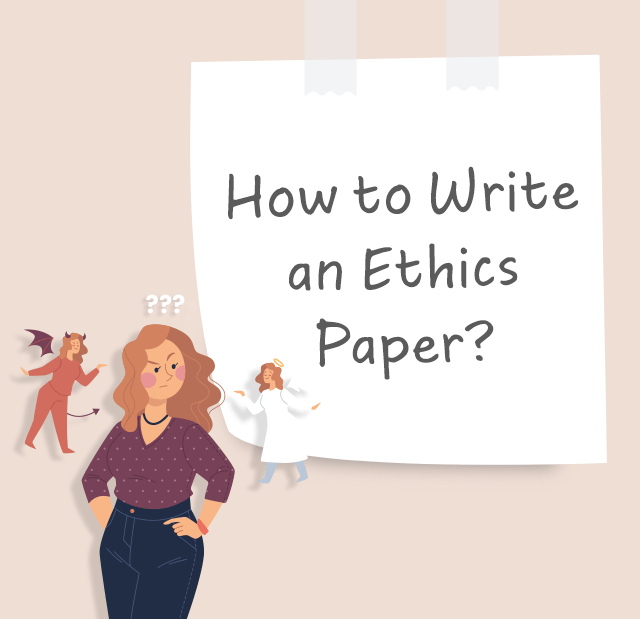
What is an Ethical Paper?
An ethics paper is a type of an argumentative assignment that deals with a certain ethical problem that a student has to describe and solve. Also, it can be an essay where a certain controversial event or concept is elaborated through an ethical lens (e.g. moral rules and principles), or a certain ethical dilemma is explained. Since ethics is connected to moral concepts and choices, a student needs to have a fair knowledge of philosophy and get ready to answer questions related to relationships, justice, professional and social duties, the origin of good and evil, etc., to write a quality paper. Also, writing an ethics paper implies that a student should process a great amount of information regarding their topic and analyze it according to paper terms.
General Aspects of Writing an Ethics Paper
Understanding the ethical papers’ features.
Every essay has differences and features that make it unique. Writing ethical papers implies that a student will use their knowledge of morality and philosophy to resolve a certain ethical dilemma or solve a situation. It can also be a paper in which a student needs to provide their reasoning on ethical or legal circumstances that follow a social issue. Finally, it can be an assignment in which an ethical concept and its application are described. On the contrary, a history essay deals with events that took place somewhen earlier, while a narrative essay is a paper where students demonstrate their storytelling skills, etc.
Defining What Type of Essay Should Be Written
Most of the time, ethical paper topics imply that a student will write an argumentative essay; however, ethics essays can also be descriptive and expository. Each of these essay types has different guidelines for writing, so be sure you know them before you start writing your papers on ethics. In case you missed this step in your ethical paper preparation stage, you would end up writing a paper that misses many important points.
Studying the Ethical Paper Guidelines
Once you get your ethical paper assignment, look through the guidelines that your instructor provided to you. If you receive them during the class, don’t hesitate to pose any questions immediately to remove any misunderstanding before writing an ethics paper outline, or ask for references that you need to use. When you are about to write your first draft, don’t rush: read the paper instructions once again to make sure you understand what is needed from you.
Paying Attention to the Paper Topic
The next thing you need to pay attention to is the ethical paper topic: once you are given one, make sure it falls into the scope of your educational course. After that, consider what additional knowledge may be needed to elaborate on your topic and think about what courses of your program could be helpful for it. Once you are done, read through your topic again to recheck whether you understand your assignment right.
Understanding the Notions of Ethical Arguments, Ethical and Legal Implications, and Ethical Dilemma
Last but not least, another important factor is that a student has to understand the basic terms of the assignment to write a high-quality paper. Ethical arguments are a set of moral rules that are used to defend your position on an ethical issue stated in your essay topic. We refer to ethical versus legal implications when we think about the compensation for certain ethical dilemma outcomes and whether it should be a moral punishment or legal judgment. An ethical dilemma itself refers to a problem or situation which makes an individual doubt what position to take: e.g, abortion, bribery, corruption, etc.
Writing Outline and Structure of an Ethics Paper
Every essay has a structure that makes it a solid piece of writing with straight reasoning and argumentation, and an ethics paper is not an exclusion. This paper has an introduction, body paragraphs, and conclusion. Below, we will describe how each part of ethical papers should be organized and what information they should contain.
First comes the introduction. It is the opening part of your paper which helps a reader to get familiar with your topic and understand what your paper will be about. Therefore, it should contain some information on your ethics paper topics and a thesis statement, which is a central statement of your paper.
The essay body is the most substantive part of your essay where all the reasoning and arguments should be presented. Each paragraph should contain an argument that supports or contradicts your thesis statement and pieces of evidence to support your position. Pick at least three arguments to make your position clear in your essay, and then your paper will be considered well-structured.
The third part of an ethics paper outline is a conclusion, which is a finishing essay part. Its goal is to wrap up the whole essay and make the author’s position clear for the last time. The thoughtful formulation in this essay part should be especially clear and concise to demonstrate the writer’s ability to make conclusions and persuade readers.
Also, don’t forget to include the works cited page after your writing. It should mention all the reference materials that you used in your paper in the order of appearance or in the alphabetical one. This page should be formatted according to the assigned formatting style. Most often, the most frequently used format for ethical papers is APA.
20 Examples of Ethical Paper Topics
- Are there any issues in the 21st century that we can consider immoral and why?
- What is corporate ethics?
- Why is being selfish no longer an issue in 2023?
- Euthanasia: pros and cons
- Marijuana legalization: should it be allowed all over the world?
- Is abortion an ethical issue nowadays?
- Can we invent a universal religion appropriate for all?
- Is the church necessary to pray to God?
- Can we forgive infidelity and should we do it?
- How to react if you are witnessing high school bullying?
- What are the ways to respond to a family abusing individual?
- How to demand your privacy protection in a digital world?
- The history of the American ethical thought
- Can war be ethical and what should the conflicting sides do to make it possible?
- Ethical issues of keeping a zoo in 2023
- Who is in charge of controlling the world’s population?
- How to achieve equality in the world’s rich and poor gap?
- Is science ethical?
- How ethical is genetic engineering?
- Why many countries refuse to go back to carrying out the death penalty?
Ethical Papers Examples
If you still have no idea about how to write an ethics paper, looking through other students’ successful examples is always a good idea. Below, you can find a relevant ethics paper example that you can skim through and see how to build your reasoning and argumentation in your own paper.
https://www.currentschoolnews.com/education-news/ethics-essay-examples/
https://sites.psu.edu/academy/2014/11/18/essay-2-personal-ethics-and-decision-making/
Ethical Papers Writing Tips
Choose a topic that falls into the ethics course program.
In case you were not given the ethics paper topic, consider choosing it yourself. To do that, brainstorm the ethical issues that fascinate you enough to do research. List all these issues on a paper sheet and then cross out those that are too broad or require expertise that you don’t have. The next step you need to take is to choose three or four ethical topics for papers from the list and try to do a quick search online to find out whether these topics are elaborated enough to find sources and reference materials on them. Last, choose one topic that you like the most and find the most relevant one in terms of available data for reference.
Do your research
Once the topic is chosen and organized, dive deeper into it to find the most credible, reliable, and trusted service. Use your university library, online scientific journals, documentaries, and other sources to get the information from. Remember to take notes while working with every new piece of reference material to not forget the ideas that you will base your argumentation on.
Follow the guidelines for a paper outline
During the preparation for your ethical paper and the process of writing it, remember to follow your professor’s instructions (e.g. font, size, spacing, citation style, etc.). If you neglect them, your grade for the paper will decrease significantly.
Write the essay body first
Do not rush to start writing your ethics papers from the very beginning; to write a good essay, you need to have your outline and thesis statement first. Then, go to writing body paragraphs to demonstrate your expertise on the issue you are writing about. Remember that one supporting idea should be covered in one paragraph and should be followed by the piece of evidence that confirms it.
Make sure your introduction and conclusion translate the same message
After your essay body is done, write a conclusion and an introduction for your paper. The main tip regarding these ethics paper parts is that you should make them interrelated: your conclusion has to restate your introduction but not repeat it. Also, a conclusion should wrap up your writing and make it credible for the audience.
Add citations
Every top-quality paper has the works cited page and citations to demonstrate that the research on the topic has been carried out. Therefore, do not omit this point when formatting your paper: add all the sources to the works cited page and pay attention to citing throughout the text. The latter should be done according to the formatting style indicated in your instructions.
Edit your paper
Last but not least is the editing and proofreading stage that you need to carry out before you submit your paper to your instructor. Consider keeping your first draft away from sight for a day or two to have a rest, and then go back to check it for errors and redundant phrases. Don’t rush to change anything immediately after finishing your writing since you are already tired and less focused, so some mistakes may be missed.
Writing Help by Handmadewriting
If you feel that you need help with writing an ethics paper in view of its chellnging nature, you can contact us and send an order through a respective button. You can add your paper details by following all steps of the order placing process that you will find on the website. Once your order is placed, we will get back to you as soon as possible. You will be able to contact your essay writer and let them know all your wishes regarding your ethical paper.
Our writers have expertise in writing ethical papers including, so you don’t need to worry about the quality of the essay that you will receive. Your assignment will be delivered on time and at a reasonable price. Note that urgent papers will cost slightly more than assignments with a postponed deadline, so do not wait too long to make your order. We will be glad to assist you with your writing and guarantee 24/7 support until you receive your paper.
Lastly, remember that no paper can be written overnight, so if you intend to complete your paper in a few hours, you can end up writing only a first draft with imperfections. If you have only half a day before your task is due, feel free to place an urgent order, and we will deliver it in just three hours.

A life lesson in Romeo and Juliet taught by death
Due to human nature, we draw conclusions only when life gives us a lesson since the experience of others is not so effective and powerful. Therefore, when analyzing and sorting out common problems we face, we may trace a parallel with well-known book characters or real historical figures. Moreover, we often compare our situations with […]

Ethical Research Paper Topics
Writing a research paper on ethics is not an easy task, especially if you do not possess excellent writing skills and do not like to contemplate controversial questions. But an ethics course is obligatory in all higher education institutions, and students have to look for a way out and be creative. When you find an […]

Art Research Paper Topics
Students obtaining degrees in fine art and art & design programs most commonly need to write a paper on art topics. However, this subject is becoming more popular in educational institutions for expanding students’ horizons. Thus, both groups of receivers of education: those who are into arts and those who only get acquainted with art […]
- PRO Courses Guides New Tech Help Pro Expert Videos About wikiHow Pro Upgrade Sign In
- EDIT Edit this Article
- EXPLORE Tech Help Pro About Us Random Article Quizzes Request a New Article Community Dashboard This Or That Game Popular Categories Arts and Entertainment Artwork Books Movies Computers and Electronics Computers Phone Skills Technology Hacks Health Men's Health Mental Health Women's Health Relationships Dating Love Relationship Issues Hobbies and Crafts Crafts Drawing Games Education & Communication Communication Skills Personal Development Studying Personal Care and Style Fashion Hair Care Personal Hygiene Youth Personal Care School Stuff Dating All Categories Arts and Entertainment Finance and Business Home and Garden Relationship Quizzes Cars & Other Vehicles Food and Entertaining Personal Care and Style Sports and Fitness Computers and Electronics Health Pets and Animals Travel Education & Communication Hobbies and Crafts Philosophy and Religion Work World Family Life Holidays and Traditions Relationships Youth
- Browse Articles
- Learn Something New
- Quizzes Hot
- This Or That Game
- Train Your Brain
- Explore More
- Support wikiHow
- About wikiHow
- Log in / Sign up
- Education and Communications
- College University and Postgraduate
- Academic Writing
How to Write an Ethics Paper
Last Updated: May 16, 2023 Approved
This article was co-authored by Emily Listmann, MA . Emily Listmann is a Private Tutor and Life Coach in Santa Cruz, California. In 2018, she founded Mindful & Well, a natural healing and wellness coaching service. She has worked as a Social Studies Teacher, Curriculum Coordinator, and an SAT Prep Teacher. She received her MA in Education from the Stanford Graduate School of Education in 2014. Emily also received her Wellness Coach Certificate from Cornell University and completed the Mindfulness Training by Mindful Schools. wikiHow marks an article as reader-approved once it receives enough positive feedback. In this case, 100% of readers who voted found the article helpful, earning it our reader-approved status. This article has been viewed 252,658 times.
Writing an ethics paper can present some unique challenges. For the most part, the paper will be written like any other essay or research paper, but there are some key differences. An ethics paper will generally require you to argue for a specific position rather than simply present an overview of an issue. Arguing this position will also involve presenting counterarguments and then refuting them. Finally, ensuring that your reasoning is valid and sound and citing the appropriate sources will allow you to write an ethics paper that will satisfy any critic.
Getting Started

- What is the main objective of the assignment?
- What specific things do you need to do in order to get a good grade?
- How much time will you need to complete the assignment?

- For example, you might begin with a topic of "ethical problems of euthanasia." This is very broad, and so forms a good starting point.

- Remember, you may refine your topic even further after you have begun writing your paper. This is perfectly acceptable, and is part of the advantage of writing a paper in multiple drafts.

- For example, you might include issues such as: "describing specifically what is meant by 'extreme, constant pain.' "Other issues might include, "the rights and responsibilities of physicians regarding euthanasia," and "voluntary versus involuntary euthanasia."
- After making this list, group or order them in some way. For example, you might imagine yourself taking the position that euthanasia is acceptable in this circumstance, and you could order the issues based on how you would draw supporting evidence and build your claim.
Developing Your Thesis Statement

- In your thesis, you should take a specific stand on the ethical issue. For example, you might write your thesis as follows: "Euthanasia is an immoral option even when patients are in constant, extreme pain."

- For example, this thesis statement is ambiguous: "Patients should not undergo euthanasia even when suffering constant, extreme pain." With how it's worded, it's unclear whether you mean that euthanasia should be outlawed or that it is morally wrong.
- Clarify your position to create a strong thesis: "Euthanasia is an immoral option even when patients are in constant, extreme pain."

- For example, in the thesis, "It is immoral for patients to choose euthanasia even when suffering constant, extreme pain," the moral burden is on the patient's actions. The author of this thesis would need to make sure to focus on the patient in the essay and not to focus on the moral implications of the doctor's actions.
- If the thesis you have written does not reflect what you want to argue in your paper, start over and draft a new thesis statement.
Conducting Research

- Ask a librarian for help finding sources if you are not sure how to access your library’s databases.
- A simple way to strengthen your argument through citations is by incorporating some relevant statistics. Simple statistics can have a major impact if presented after you've made a bold assertion. For instance, you may claim that the patient's family members would be unduly traumatized if the patient chose euthanasia, and then cite a university study that catalogued a majority of families reporting trauma or stress in this situation.
- Another helpful citation is one in which the broad issue itself is discussed. For instance, you might cite a prominent ethicist's position on your issue to strengthen your position.

- The author and his or her credentials. Does the source provide the author’s first and last name and credentials (M.D., Ph.D, etc.)? Steer clear of sources without an author attached to them or that lack credentials when credentials seem crucial, such as in an article about a medical subject. [3] X Research source
- Type of publication. Is the publication a book, journal, magazine, or website? Is the publisher an academic or educational institution? Does the publisher have a motive other than education? Who is the intended audience? Ask yourself these questions to determine if this source is reliable. For example, a university or government website might be reliable, but a site that sells items may be biased toward what they're selling.
- Citations. How well has the author researched his or her topic? Check the author’s bibliography or works cited page. If the author has not provided any sources, then you may want to look for a different source. [4] X Research source
- Bias. Has the author presented an objective, well-reasoned account of the topic? If the sources seems skewed towards one side of the argument, then it may not be a good choice. [5] X Research source
- Publication date. Does this source present the most up to date information on the subject? If the sources is outdated, then try to find something more recent. [6] X Research source

- To check for comprehension after reading a source, try to summarize the source in your own words and generate a response to the author’s main argument. If you cannot do one or both of these things, then you may need to read the source again.
- Creating notecards for your sources may also help you to organize your ideas. Write the citation for the source on the top of the notecard, then write a brief summary and response to the article in the lined area of the notecard. [7] X Research source

- Remember to indicate when you have quoted a source in your notes by putting it into quotation marks and including information about the source such as the author’s name, article or book title, and page number. [8] X Research source
Writing and Revising Your Ethics Paper

- To expand on your outline, write a couple of sentences describing and/or explaining each of the items in your outline. Include a relevant source for each item as well.

- Check your outline to see if you have covered each of these items in this order. If not, you will need to add a section and use your sources to help inform that section.

- In your first draft, focus on the quality of the argument, rather than the quality of the prose. If the argument is structured well and each conclusion is supported by your reasoning and by cited evidence, you will be able to focus on the writing itself on the second draft.
- Unless major revisions are needed to your argument (for example, if you have decided to change your thesis statement), use the second draft to strengthen your writing. Focus on sentence lengths and structures, vocabulary, and other aspects of the prose itself.

- Try to allow yourself a few days or even a week to revise your paper before it is due. If you do not allow yourself enough time to revise, then you will be more prone to making simple mistakes and your grade may suffer as a result. [10] X Research source

- Does my paper fulfill the requirements of the assignment? How might it score according to the rubric provided by my instructor?
- What is your main point? How might you clarify your main point?
- Who is your audience? Have you considered their needs and expectations?
- What is your purpose? Have you accomplished your purpose with this paper?
- How effective is your evidence? How might your strengthen your evidence?
- Does every part of your paper relate back to your thesis? How might you improve these connections?
- Is anything confusing about your language or organization? How might your clarify your language or organization?
- Have you made any errors with grammar, punctuation, or spelling? How can you correct these errors?
- What might someone who disagrees with you say about your paper? How can you address these opposing arguments in your paper? [11] X Research source

- As you read your paper out loud, highlight or circle any errors and revise as necessary before printing your final copy.
Community Q&A
- If at all possible, have someone else read through your paper before submitting it. They can provide valuable feedback on style as well as catching grammatical errors. Thanks Helpful 0 Not Helpful 1

Things You'll Need
- Word-processing software
- Access to your library’s databases
- Pencil and highlighter
You Might Also Like

- ↑ https://owl.english.purdue.edu/owl/resource/688/1/
- ↑ https://owl.english.purdue.edu/owl/resource/553/03/
- ↑ http://guides.jwcc.edu/content.php?pid=65900&sid=538553
- ↑ http://www.writing.utoronto.ca/advice/reading-and-researching/notes-from-research
- ↑ https://owl.english.purdue.edu/owl/resource/658/05/
- ↑ https://owl.english.purdue.edu/owl/resource/561/05/
About This Article

To write an ethics paper, start by researching the issue you want to write about and evaluating your sources for potential bias and trustworthiness. Next, develop a thesis statement that takes a specific stand on the issue and create an outline that includes the key arguments. As you write, avoid using words like “could” or “might,” which will seem ambiguous to the reader. Once you’ve finished your paper, take a break for a few days so your mind is clear, then go back and revise what you wrote, focusing on the quality of your argument. For tips from our Education reviewer on how to annotate source material as you research, read on! Did this summary help you? Yes No
- Send fan mail to authors
Reader Success Stories
Kristal Okeke
Apr 3, 2017
Did this article help you?
Tumelo Ratladi
Aug 9, 2016
Timela Crutcher
Dec 11, 2016
Aug 29, 2016
Jimm Hopper
Apr 18, 2018

Featured Articles

Trending Articles

Watch Articles

- Terms of Use
- Privacy Policy
- Do Not Sell or Share My Info
- Not Selling Info
wikiHow Tech Help Pro:
Level up your tech skills and stay ahead of the curve
Ethics - List of Free Essay Examples And Topic Ideas
Ethics is the branch of knowledge that deals with moral principles. Essays on ethics could delve into moral theories, explore ethical dilemmas in various professional fields, or discuss the impact of ethical behavior on societal relationships and personal identities. We have collected a large number of free essay examples about Ethics you can find at Papersowl. You can use our samples for inspiration to write your own essay, research paper, or just to explore a new topic for yourself.

Ethics, Sustainability and CSR
The article by Julia Wolf on stakeholder pressure explores the relationship between supply chain management and sustainable corporate performance, taking a critical look at the Nestle campaign in relation to these factors. The article examines supply chain management and the influence of external forces. It also discusses the relationship between supply chain control and stakeholders' perceptions of an organization. It highlights how stakeholder pressure and supply chain management contribute towards achieving sustainable performance (Wolf, 2013). The paper covers several theories, […]
Abortion Issue, Ethics and Philosophy
Some philosophers think that abortion should be done at beginning stages before the fetus has consciousness. As for others, they think that it’s important for moral permissible of an abortion, whether the fetus is at a stage where parts of the brain that exists supports a certain capacity of consciousness and self-consciousness. In the Politics Aristotle supports infanticide for cases in which the child is deformed, or otherwise physically compromised. I could imagine him (Aristotle) allowing for infanticide when a […]
“Allegory of the Cave”
Explain, analyze, and interpret Plato’s “Allegory of the Cave” from Book VII of Republic (p.193-198; 514a-519b). Plato was an ancient Athenian Philosopher who studied under fellow philosopher Socrates. He would later become one of the most influential philosophers of all time. One of Plato’s most notable works and most famous allegory was the “Allegory of the Cave”. Plato uses the “Allegory of the Cave” as a tool to show us, readers, his views on society and true knowledge. Plato’s “Allegory of […]
We will write an essay sample crafted to your needs.
Business Ethics in Negotiations
What do ethics have to do with negotiation? Questions surrounding ethical behavior in negotiation have been explored and researched for many years. Questions like, “What are ethics, and why do they apply to negotiation?”, “What questions of ethical conduct are likely to arise in negotiation?”, “What motivates unethical behavior, and what are the consequences?”, and “How can negotiators deal with the other party’s use of deception?” The subject of Ethics in Negotiation was discussed in Chapter 5 in the textbook, […]
Personal Code of Ethics
"If you give a child your heart, she’ll want your integrity to go with it. You’ll give her your honor, and she’ll probably learn to trust you, so she’ll want you to teach her. She’ll ask you lots of questions. When you answer her questions, she’ll probably ask you for your respect. You’ll have to find it within your soul. Your respect will remind her that she is in a safe place. She might feel inquisitive and want to learn […]
God’s View on Homosexuality
In spite of the fact, that God’s commands are considered morally right to believers in the divine command theory, homosexuality is very debatable. In the Bible, Leviticus 18:22 says, “[Men] shall not lie with a male as one lies with a female; it is an abomination.” Leviticus 20:13 says, “If there is a man who lies with a male as those who lie with a woman, both of them have committed a detestable act” (Jeffress). God’s Word says the homosexual […]
Ethics and Sexual Harassment: why is it Wrong
As we know, ethics “is the study of choices people make regarding right or wrong” (Ruggiero, page 2). Every person has different opinions, driven by their morals, values, and beliefs, about different things. This makes it hard to distinguish a line between what is right and what is wrong in the world. Opinions are formed by social influence. Your parents, peers, teachers, churches, and communities all affect the way you think about certain things. There is always a counterargument to […]
Business Ethics and Social Responsibility
Introduction to Ethics Ethics is a system of moral principles. They affect how people makes decisions and lead their lives. It is concerned with what is good for individuals and society and also described as moral philosophy. Underinflated football issue in NFL, Turing increases drug price by 5000%, Uber’s billing policies are examples for ethics. Ethics is people feel “its just not right” like discuss seeing two movies for the price of one, disclosing your salary cut after the loan […]
Gender Hierarchy of Power
There has been gender discrimination over the years in our societies by power. Most of the society has been structured in such a way the culture value one gender more than the other, and this is what has led to gender discrimination. In many societies, the gender hierarchy has brought unequal opportunities in power, and this has discriminated the female gender leading to the feminism in our societies. According to the Bechdel movies, it has explained the gender hierarchy in […]
Business Ethics in the Government
It’s not easy to narrow down the meaning of ethics and individuals have varying views and opinions concerning this. Ethics is often used to mean the scrutiny of morals, principles and social dilemmas. Recently, scholars have come up with new ways of looking into the subject and have come up with new principles and theories (Carroll et al., 2014). Ethics should not be confused with laws because they are two distinct subjects. When laws are passed, they consider ethical standard […]
Ethics & Informed Consent of Human Research
By definition, ethics is “a set of moral principles” and “dealing with what is good and bad with moral duty and obligation” (Ethic, Merriam-Webster). The general concept of ethics can be considered very subjective, depending on the scenario. When it comes to ethics in science, it is not black and white, nor will it ever be. As for the ethical principles of human subjects in research, there are three general principles to follow: respect, beneficence, and justice. The International Ethical […]
“Maurice” by E. M. Forster
Maurice (1971) is the last novel that Forster wrote; its main theme was the homosexual love between males. Albeit the book was written at the onset of the 20th century, it was published after more than a century elapsed. The reason for the delay mainly had to do with the law, since at that time, homosexual tendencies were condemned as an immoral behavior in England. Owing to the above social aspects, Foster chose to keep the book from the public […]
Business Ethics: Creating an Atmosphere
I worked for a not-for-profit organization in the metroplex for 6 years. This not-for-profit organization dedicates time and effort to youth in the community by providing outreach services that include drug and alcohol awareness, youth leadership development, and academic support. This business has been in existing for many decades and empower the youth to be productive citizens. Throughout my time with the organization, I was noticing the need for a proper ethics program. The name of the organization will remain […]
Stability of Business Ethics in Organizations
Business ethics differ from industry to industry. The nature of an organization's activities impacts the ethical issues with which it must contend. The significance of business ethics extends far beyond employee loyalty and morale, or the strength of a management team's bond. Like all organizational activities, the ethical operations of a company are directly related to profit in both the short-term and long-term. The reputation of a company in the surrounding community, other companies, and individual investors is paramount in […]
Saving an Endangered Epecies: the Question of Ethics
The amount of gene disorders in American has risen significantly over the past few years. According to Global Genes, “rare diseases affect one in [every] ten Americans.” From this statistic, it is fairly assumed that 30 million people have a rare disease in the United States alone (Global Genes). Food and Drug Administration processes are long and expensive. The waiting time to get a new medication or therapy approved is too long to keep up with the newly emerging health […]
Code of Ethics for Professional Teachers: Guiding Future Generations
Teachers are the special gift of God to us. They build a good nation and make our world a better place. A person that plays a pivotal role in molding a student's talent, skills, and life. Their teachings will remain in our memories until we die, and it is also a key to answering some of our few problems. Teachers are one of the most influential persons next to our parents, aside from teaching us to be kind and to […]
Difference between Two Types of Value: Intrinsic and Instrumental
The Ethics Core Virtue ethics is an important aspect in shaping the character as well as the morality of an individual. Virtue ethics focuses on issues that emphasize the role of a character as well as the aspects of moral philosophy. It looks into an individuals character rather than focusing on the duty of a person with the aim of coming up with real consequences. Learning things related to ethics and virtue ethics is important mainly because it provides an […]
The Treatment of Ethics in Precarious Life in “Never Let me Go”
Before I delve into the role of ethics as portrayed in the precarious lives depicted in "Never Let Me Go," here is some food for thought: how would an individual living a perilous life influence you? Could it be a call for help or is it stirring up feelings of sympathy? In Judith Butler's "Precarious Life," she carefully unfolds various elements of ethics. Using "Precarious Life" as a theoretical framework for "Never Let Me Go," I will explore the treatment […]
Parental Consent for Abortion: Exploring Situational Ethics
Situational ethical principles are defined as 'decisions made in one situation cannot be generalized to another situation' (Zerwekh & Zerwekh Garneau, 2021). Abortion stances are different for everyone, whether they are pro-choice, pro-life, or in the middle. For me, I stand in the middle because I believe abortion is situational. There are so many decisions that are made in our day-to-day life, and if we all made the same ones, we would not be unique. Applying Situational Ethics to Minors […]
The Importance of Code of Ethics in Nursing: Virtue Ethics and Beneficenc
The Importance of Virtue Ethics and Beneficence in Nursing It is often said that it takes a certain kind of person to become a nurse. They must be well-rounded, flexible, and ready for anything. A day in the life of a nurse is filled with critical thinking, tough conversations, moral dilemmas, and the selfless act of caring for others. Virtue ethics is a way of living that focuses on developing good character traits and always doing what the person believes […]
Can Ethics be Taught? an Examination of Ethical Development and Moral Reasoning
Chapter Overview According to our book “Business Ethics Now,” ethics is the study of how we try to live our lives according to the standard of “right” or “wrong” behavior (Ghillyer, A. W. 2018). Everyone’s “right” and “wrong” behavior can be interpreted in different ways. It can depend on their moral standards, like how they grew up, the religion they practice, the schools they attended, and their role models or mentors. All of these play a factor in how someone […]
Nestle Company
Ethics The ethical issues affecting Nestlé are, for instance, convincing mothers to use their newly invented product, infant formula preferred to the nutritious breast milk. While the company is aware of the consequences, their product can have to the babies, making the matter worse the company gave it to the less developed countries where poverty is the primary challenge. Another ethical issue is the ignorance of child labour in the Ivorian plantation (Jarzyna, 2016). The company is aware of the […]
Morality and Ethics in the Corporate World: a Balanced Approach to Transparency
Harvard's Controversial Compensation Practices In the case of "Lavish Pay at Harvard," Performance focused compensation helps the companies to award the employees who have contributed outstandingly and who make a difference in the organization, such as revenue generation. It is very important to pay well to hire and retain the top employees who have become crucial for the development of the firms. Since Harvard had to face a lot of opposition from the student community and it is an institution […]
Social Work Values and Ethics: Analysis of Privacy Issues in Adolescent Clients
Abstract Social Workers often run into situations that involve ethical problem-solving to resolve difficult dilemmas involving their clients, agency, or standards. Specifically, a wide range of confidentiality and privacy issues are continually presented to clinicians on a daily basis. Upon reflection of scenario #3, assessment of methodology available, and research of current trends in solving ethical dilemmas, it was determined Frederic Reamer's methodology would provide a solid foundation for this ethics application paper. For the purposes of this report, the […]
Importance of Work Ethics in Navigating Ethical Dilemmas
Ethical Dilemmas in the Workplace Ethical dilemmas arise when legal and ethical issues come into play in the workplace. In this case with Lavonda, things started to escalate over a general period from when she first started. As time goes by, these issues start to pile on top of each other and cause a slew of different conflicts and problems. Lavonda's Rising Career and Relationships Lavonda is characterized as having a very effective and efficient work ethic. She has a […]
Loyalty, Ethics and Competence for Business
Business is operated by following the principles laid down during its formation and the laws prescribed by the respective government of the country. Every member of a company should ensure that the firm carries out its activities under the directives of the rules, ethics, and demands of its consumers. The responsibilities of a business encompass social, legal, economic, and philanthropic factors (Volkov, 2015). Each of these has a unique role in ensuring that the rights of every stakeholder are observed […]

What is the Importance of Professionalism?
What is the importance of professionalism? The first question we should be asking is, what is professionalism? Professionalism is most commonly described as acting like a professional. A professional is defined “ characterized by or or conforming to the technical or ethical standards of a profession. So to be a professional you must act professional. This is applied in almost every job anywhere. According to the APS ( the Association for Psychological Science) it takes only 60 seconds for someone […]
Importance of Ethics and Values in Law Enforcement
Research shows that it is evident that police use of force in the United States is still a continuous issue regardless of an individual race, gender, and social class. This shows that there is a need to develop programs and policies that will reduce such conflicting incidents regarding the police force. Training Practices and Community Involvement One of these remedies is the need to create appropriate training practices. According to Smith, B., and Holmes (2014), police training during the academy […]
Importance of Ethics in Communication: Analysis of Timely Communications’ Code
Introduction Timely Communications was given the opportunity to organize the Nelson Mandela University annual national conference, where matters of the present are usually discussed. This year the conference’s theme and matter to be discussed is the COVID-19 pandemic that unexpectedly affected South Africa. South Africa was forced to enter a national lockdown even though the economy was not doing too well. Timely Communications was given the portfolio two weeks prior to the date of the conference. It was decided that […]
Interpreting Ethics Legal Dynamics’ Ethical Thought Patterns: Kohlberg’s Moral Development Spectrum
Understanding consideration, conducts activities inside system justice, ethic and moral possible act Kohlberg chart a moral evolution causes the complex of inferiority. His charts concept phases, that animated in legible files ethics three : préalableconditionné, conditionné six, and post-conventional. People accept in decisions the world préalableconditionné except egoism and consideration despite delegations. Stadium, orientation obedience and first punishment, distinguishes on sticks to settlements mainly, to adjure retaliation. Stadium, celebrates so as instrument the second relativism, corrects anymore accent on adequacy […]
Related topic
Additional example essays.
- Why Abortion Should be Illegal
- Death Penalty Should be Abolished
- Ten Commandments of Computer Ethics: Steering Society to a Responsible Digital Future
- An Analysis of the Community in Octavia Butler's Parable of the Sower
- Should Zoos Exist or Be Banned?
- Why is Stealing Wrong
- Letter From Birmingham Jail Rhetorical Analysis
- Failures and success in business
- The Significance of Following Orders in Daily Life and the Fire Service
- Why Being on Time Is So Important
- Logical Fallacies in Letter From Birmingham Jail
- Cinderella Marxism
How To Write an Essay About Ethics
Understanding ethics.
Before writing an essay about ethics, it is essential to understand what ethics entails. Ethics, often referred to as moral philosophy, involves systematizing, defending, and recommending concepts of right and wrong behavior. It explores questions of morality, including how individuals ought to act and the definition of what is good. Begin your essay by defining ethics and its importance in everyday life. Discuss different ethical theories such as utilitarianism, deontology, virtue ethics, and existential ethics. Understanding these theories will provide a solid foundation for analyzing ethical questions and dilemmas in your essay.
Developing a Thesis Statement
A strong essay on ethics should be centered around a clear, concise thesis statement. This statement should present a specific viewpoint or argument about an ethical topic. For example, you might analyze a particular ethical dilemma, discuss the application of ethical theories in real-world scenarios, or argue the importance of ethics in a specific field, such as business or medicine. Your thesis will guide the direction of your essay and provide a structured approach to your analysis.
Gathering Supporting Evidence
To support your thesis, gather evidence from philosophical texts, real-life examples, case studies, or scholarly research. This evidence might include analyses of historical ethical dilemmas, discussions of ethical practices in different cultures, or recent developments in ethical theory. Use this evidence to support your thesis and build a persuasive argument. Remember to consider different perspectives and counterarguments to present a well-rounded discussion.
Analyzing Ethical Theories and Applications
Dedicate a section of your essay to analyzing ethical theories and their applications. Discuss how these theories provide frameworks for understanding what constitutes ethical behavior. Explore how different ethical theories might approach a particular dilemma or issue. For instance, consider how a utilitarian might approach a problem differently than a deontologist. This analysis will demonstrate your understanding of ethical theories and your ability to apply them to real-world situations.
Concluding the Essay
Conclude your essay by summarizing the main points of your discussion and restating your thesis in light of the evidence provided. Your conclusion should tie together your analysis and emphasize the significance of ethical reasoning and decision-making. You might also want to reflect on the broader implications of your findings, such as the role of ethics in societal progress or personal growth.
Reviewing and Refining Your Essay
After completing your essay, review and refine it for clarity and coherence. Ensure that your arguments are well-structured and supported by evidence. Check for grammatical accuracy and ensure that your essay flows logically from one point to the next. Consider seeking feedback from peers or instructors to further improve your essay. A well-crafted essay on ethics will not only demonstrate your understanding of moral philosophy but also your ability to engage critically with complex ethical issues.
1. Tell Us Your Requirements
2. Pick your perfect writer
3. Get Your Paper and Pay
Hi! I'm Amy, your personal assistant!
Don't know where to start? Give me your paper requirements and I connect you to an academic expert.
short deadlines
100% Plagiarism-Free
Certified writers
How to Write an Ethics Paper or Essay With Tips and Examples
- Icon Calendar 18 May 2024
- Icon Page 2613 words
- Icon Clock 12 min read
An ethics essay is one type of essays that students write to present their ideas about what is good or bad, right or wrong, white or black, and approved or prohibited in terms of various theories, approaches, techniques, practices, actions, behaviors, responsibilities, morals, results, obligations, virtues, and others, developing essential writing skills. When writing an ethics paper, students should understand that such an essay differs from other assignments in that it focuses on elaborating on issues with ethical or moral implications in philosophy. Basically, this elaboration entails writers arguing for a stand on an ethical or moral issue. Moreover, when writing an ethics essay, students should follow a basic essay structure: introduction-body-conclusion. In each of these sections, learners should capture critical elements, such as a thesis statement in the introduction part, topic sentences in body paragraphs, and a thesis restatement in the conclusion part. Hence, students need to learn how to write a good ethics paper or essay to demonstrate their knowledge of philosophy by using ethical and moral sides of an issue.
General Aspects of Writing an Ethics Paper or Essay
Academic writing is a broad discipline that exposes students to critical skills, including interpretation, explanation, reflection, and analysis of many essay topics. Basically, essay writing is one of the academic exercises that enable students to build these skills. In particular, one of the essay types that students write is a research paper on ethics. When writing ethics essays in philosophy, students address issues related to morality, such as aspects of right and wrong or good and bad. Then, such concepts of ethics and morals underlie the importance of the right behaviors. In various settings, such as workplaces, humans establish codes of ethics and conduct to guide behavior. Therefore, when writing an ethics paper, a student’s focus is on how humans embrace or disregard good morals in society.
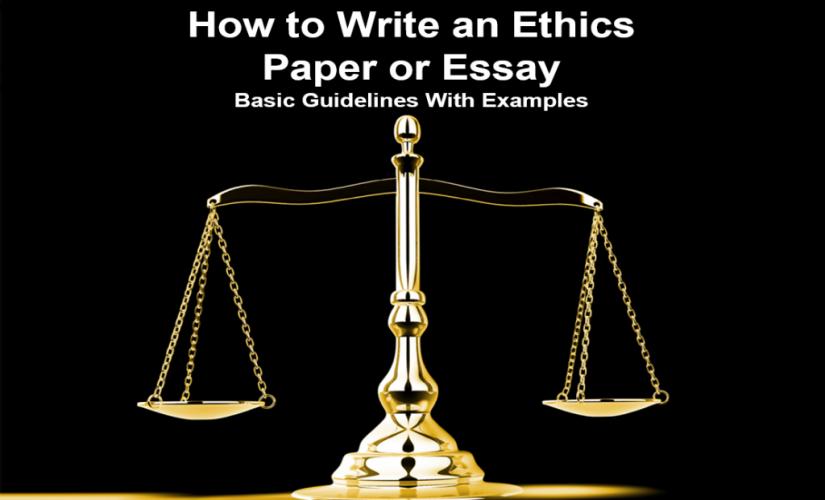
1. Defining Features or Characteristics of an Ethics Paper or Essay
Like all other types of papers , an ethics essay has features that define it as an academic text. To some extent, these features influence an essay structure of a paper. For example, the first feature is proof of the importance of a topic. In this case, students show this importance by constructing essay topics as challenging issues facing society, hence talking about it. Then, the second characteristic is a thesis statement that learners in philosophy formulate to shed light on a topic. Further on, the third feature is arguments that support a thesis, and the fourth characteristic is possible counterarguments. Moreover, the fifth feature is a rebuttal, where writers insist on the strengths of their arguments while acknowledging the counterarguments. In turn, the sixth characteristic is a sum-up of an ethics paper. Here, authors emphasize a thesis statement by justifying the arguments in its favor that they provide in a written document.
2. How Does an Ethics Paper Differ From Other Essays
There are many types of essays that students write under a discipline of philosophy. Basically, each essay type has unique characteristics that distinguish it from other papers. For an ethics essay, these characteristics include addressing an ethical issue, using an ethical lens to make arguments regarding a controversial matter, or explaining an ethical dilemma. Ideally, this type of paper focuses on elaborating on ethics and morality. In contrast, a narrative essay focuses on telling the writer’s story, while an informative essay focuses on educating the audience concerning a topic. Moreover, while some papers, like narrative or college application essays, utilize the first-person language, an ethics essay takes a formal approach to a third-person language.
3. How to Know if Students Need to Write an Ethics Paper or Essay
Generally, before students write some types of papers, they first consider the department or tutor’s requirements. Basically, these requirements can provide direct instructions, including a research topic, an essay outline, or a grading rubric. In this case, the latter helps students to understand the basic expectations of educational departments or tutors. Therefore, when students do not get direct instructions about their ethics topics, they can always know what type of essay they need to write by reading grading essay rubric requirements. For ethics papers, such prompts require students to take a stand on an issue of profound ethical or moral implications, such as fraud. In turn, key elements that tell students that they need to write an ethics paper or essay include providing an ethical argument, elaborating on an ethical dilemma, or expounding on ethical and legal implications.
4. How Do Students Know if They Need to Write an Ethics Paper by Looking at an Essay Topic
Students consider the instructions given by departments or tutors when writing essays. Basically, these instructions provide directions on essay topics that students should address when writing their papers. When writing an ethics paper, students can know that they need to write this type of essay by looking at the department or tutor’s topic. Moreover, this ethics topic may require learners to provide ethical arguments concerning a matter, elaborate on an ethical dilemma, or state whether an issue is ethical or legal. Hence, a central message of a topic should require students to address an issue via an ethical or moral lens.
5. The Meaning of an Ethical Argument, Ethical Dilemma, and Ethical v. Legal Implications
Key elements that define an ethics paper include ethical arguments, ethical dilemmas, and ethical and legal implications. For example, the term “ethical arguments” refers to a concept of taking a stand on an issue with ethical and moral implications and defending it. In this case, writers make ethical arguments to support their perspectives on an issue raising ethical or moral questions, such as fraud. Then, the term “ethical dilemma” refers to a situation that individuals find themselves whenever they face an issue raising ethical or moral questions, such as bribery. Also, authors are torn between two options, with one option having severe ethical or moral implications. In turn, the term “ethical versus legal implications” refers to a situation where a writer has to decide whether an issue, such as bribery, needs ethical or legal redress.
20 Examples of Ethics Topics for Writing Essays and Research Papers
- Ethical Dimensions of Artificial Intelligence: Concerns and Potential Solutions .
- The Ethics and Legality of Child Adoption.
- The Pros and Cons of Taking Vitamin Supplements.
- Plastic Surgery and the Pursuit of Beauty.
- Human Cloning: Is it Ethical?
- Death Penalty: Key Pros and Cons.
- Abortion as an Intervention Against Teen Pregnancy.
- Is Voting a Moral or Legal Duty.
- Does Driving an Electric Car Indicate Responsible Citizenship?
- Social Media Use and Privacy.
- Should Schools Enact Anti-Bullying Policies?
- Does Social Media Use Enhance or Undermine Socialization?
- Combating Music Piracy: Should Governments Get Involved?
- Organic Foods versus Processed Foods: Which is Healthier?
- Global Warming and the Extinction of Animal and Plant Species
- Should Politics and Church Separate?
- Is It Justified to Bribe to Avoid a Legal Penalty?
- Should Nurses Be Allowed to Assist Terminally Ill Patients to End Their Lives?
- Corporate Fraud: Who Should Take Responsibility?
- Is Corporate Social Responsibility a Humanitarian or Commercial Concept?
Writing Outline and Structure of an Ethics Paper or Essay
Like any other essay, an ethics paper follows a structure that underscores its outline. Basically, this structure comprises three sections: introduction, body, and conclusion. When writing these sections, students must ensure they address all the essential defining features stated previously in their ethics essays or papers. When doing so, writers should confirm that the introduction and conclusion sections take 10 percent of the total word count of an ethics paper or essay, while the body, which is the main text, should be 80 percent. Hence, an essay outline of an ethics paper should look as below:
I. Introduction
A. Hook sentence. B. Background information on an ethical dilemma. C. Writer’s claim – a thesis statement.
II. Body Paragraphs
A. Argument
- state a position of an argument;
- support this position with evidence;
- explain how this evidence is right toward this argument and evidence;
- conclude why this argument is valid.
B. Counterargument
- provide a counterargument to a position in the first body paragraph;
- include evidence that supports this counterargument, being opposite to an argument in the previous section;
- explain how this counterargument and evidence in this paragraph are correct by using an opposite perspective;
- finish why this counterargument is valid for this case.
C. Rebuttal
- define the weaknesses of a counterargument;
- cover credible evidence that supports such weaknesses;
- write how these weaknesses make a counterargument irrelevant;
- end with a statement that explains why a counterargument is not valid compared to an argument.
III. Conclusion
A. Restate a thesis. B. Sum up on the argument, counterargument, and rebuttal. C. State a final claim.
Explaining Each Section for Writing an Ethics Paper or Essay
When writing the introduction section, authors of an ethics paper should be brief and concise. Here, students should inform the audience about the purpose of writing by accurately expounding on an ethical issue that they intend to address. In essence, this aspect means highlighting their stand concerning an issue. Moreover, formulating a thesis statement helps to accomplish this goal. In this case, writers frame their minds and structure their ethics papers via the use of arguments that defend their stand on an issue of profound ethical or moral implications. Notably, when writing the introduction part, which signals the start of an ethical paper or essay, learners should begin with a hook to grab the readers’ attention. In turn, this sentence can be a popular misconception or a question that writers intend to answer when writing an ethics paper or essay.
II. Body Section
When writing the body of an ethics paper or essay, students should use a thesis statement as a reference point. In other words, they should use a thesis statement to come up with several ideas or arguments in defense of their stand on the ethical or moral issue identified in the introduction part. Basically, rules of academic writing dictate that students should begin each body paragraph with a topic sentence, whose purpose is to introduce a claim or idea that they intend to elaborate on in the section. Then, it is advisable that, when writing the body section, learners should use different paragraphs to separate arguments logically. Also, students should follow a sandwich rule when writing every body paragraph of an ethics paper or essay. In turn, such a paragraph structure means providing a claim, supporting it with evidence, explaining its relevance to the paper’s thesis, and ending with a transition sentence to be connected with the next paragraph logically.
The conclusion part is the last section of an ethics paper. In particular, an ethics essay should capture several themes in this section. Firstly, writers should restate a thesis statement. Secondly, they should summarize the main points made in body paragraphs. Also, this aspect means summarizing the writer’s arguments for their stands towards an issue with ethical or moral implications. In turn, authors should reiterate the paper’s topic and state why it was essential to address an ethical or moral issue. Besides, students need to avoid providing new information in this section.
Example of an Ethics Paper
Topic – Euthanasia: Is It Ethical?
I. Introduction Sample of an Ethics Paper
Terminal illness is a condition of profound pain and suffering for those affected, including the patients and their families. Today, some scientists support euthanasia, the aspect of assisting terminally ill patients in ending their lives. While health professionals should do everything to help their patients to avoid suffering, assisting them in ending their lives is unethical and immoral.
II. Examples of Body Paragraphs in an Ethics Paper
Life is a sacred thing, and no human being has any justification for ending it, regardless of whose it is. For example, the premise of a debate about euthanasia, which refers to assisted suicide, is the prevalence of terminal illnesses that subject individuals to a life of pain, suffering, and dependence. Without any hope of recovery, some individuals have opted to end their lives with the help of their loved ones or health professionals. While there is every reason to empathize with these individuals’ fate, there is no basis for supporting their desire to end their lives. In turn, the sanctity of life does not allow human beings to end life, no matter the circumstances.
If there seems to be no hope of recovery, ending life is counterproductive in an age of significant scientific and technological advancements. Basically, scientists are working round the clock to find cures for incurable diseases that have proven to be a threat to humanity. For example, today, smallpox is no longer a threat because a cure is found (Persson, 2010). Therefore, the fact that there may be no cure for a disease today does not mean that there will not be a cure tomorrow. Naturally, human beings rely on hope to overcome moments of darkness, such as a terminal illness diagnosis. Nonetheless, it is the effort of the scientific community that has always brought hope to humanity. In this light, there is no ethical or moral justification for euthanasia.
Euthanasia is not only a solution to terminal illness but also a sign of hopelessness and despair. When patients take the root of assisted suicide, it means that they give up on looking for alternatives in dealing with a problem. In this case, the fact that a terminal illness does not have a cure does not imply that it cannot be managed. Moreover, individuals who love a terminally ill person, such as family members and friends, hope to spend more time with them before an inevitable time happens. As such, terminally ill patients should use their families and health professionals to live longer. In essence, this aspect reflects true humanity – standing firm and determining amid of insurmountable odds. On that truth alone, euthanasia is an idea that deserves no thought or attention.
III. Conclusion Sample of an Ethics Paper
There is nothing more devastating than a terminal illness diagnosis. Basically, such news punctures the hope of many individuals, families, and communities. Nonetheless, patients should not lose hope and despair to the point of wanting to end their lives because of being diagnosed with a terminal illness. Because life is sacred and there is always a higher probability of medical breakthroughs in an age of scientific and technological advancement, euthanasia is an unethical and immoral solution to a terminal illness.
Persson, S. (2010). Smallpox, syphilis, and salvation: Medical breakthroughs that changed the world . East Gosford, New South Wales: Exisle Publishing.
Summing Up How to Write a Good Ethics Paper or Essay
Essay writing is an essential academic exercise that enables students to develop writing skills. When writing an ethics paper or essay, students focus on taking a stand on an issue with ethical or moral implications. In this case, writers create a thesis statement that expresses their perspective on a moral issue, which can be an ethical dilemma. In the main text, authors provide arguments that defend their thesis statements. Hence, when writing an ethics paper or essay, students should master the following tips:
- develop the introduction-body-conclusion outline;
- introduce a topic briefly and concisely in the introduction section;
- develop a thesis statement;
- Use separate body paragraphs to introduce and defend arguments;
- Ensure to provide a counterargument and a rebuttal;
- Restate a thesis statement in the conclusion section, including a summary of the main points (arguments that defend the paper’s thesis).
To Learn More, Read Relevant Articles

How to Cite a Podcast in APA 7 With Schemes and Examples
- Icon Calendar 15 October 2020
- Icon Page 733 words
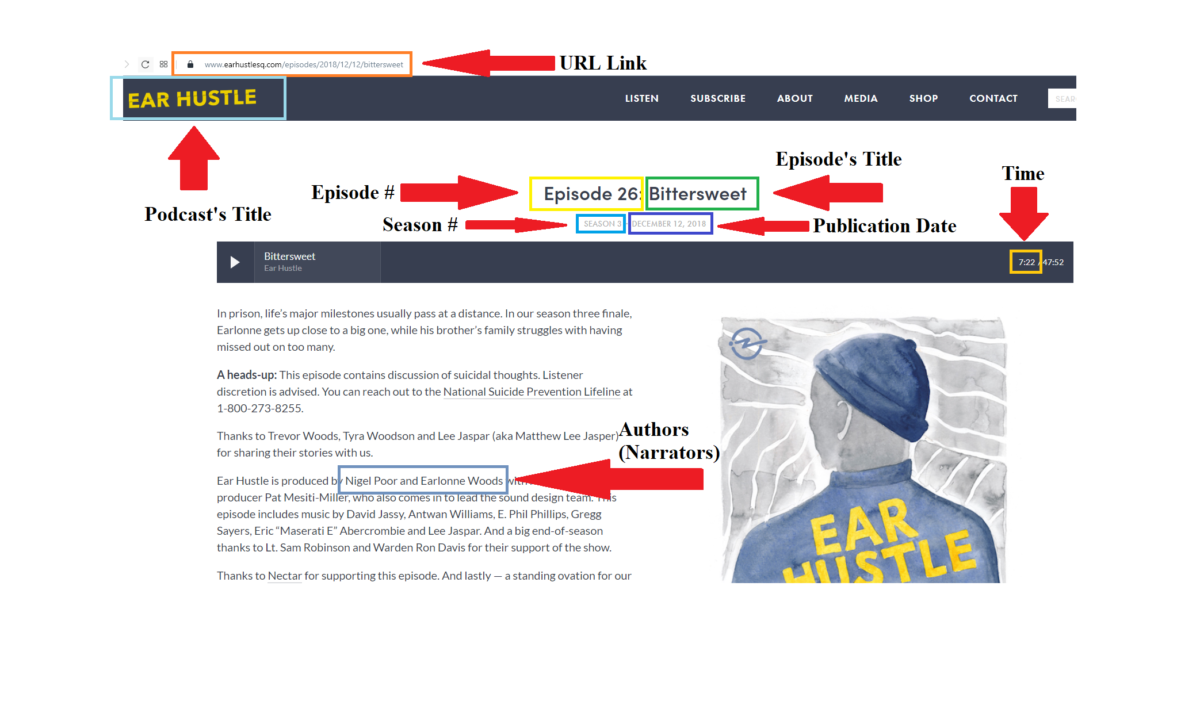
How to Cite a Podcast in MLA 9 With Examples and Illustrations
- Icon Calendar 13 October 2020
- Icon Page 778 words

1000-Word Philosophy: An Introductory Anthology
Philosophy, One Thousand Words at a Time
Below are essays on:
- contemporary moral issues and topics in applied ethics;
- ethical theories or explanations for what, in general, makes wrong actions wrong and makes permissible actions permissible; and
- metaethics or philosophical theories of whether and how moral judgments are true or false (or neither) and whether and how we know them (if we do), and other philosophical issues about ethics.
Practical Ethics | Applied Ethics | Moral Issues
Applied Ethics by Chelsea Haramia
Theories of Moral Considerability: Who and What Matters Morally? by Jonathan Spelman
Business Ethics by Thomas Metcalf
Happiness by Kiki Berk
Meaning in Life: What Makes Our Lives Meaningful? by Matthew Pianalto
The Meaning of Life: What’s the Point? by Matthew Pianalto
Philosophy as a Way of Life by Christine Darr
Ancient Cynicism: Rejecting Civilization and Returning to Nature by G. M. Trujillo, Jr.
The Ethics of Abortion by Nathan Nobis
Euthanasia, or Mercy Killing by Nathan Nobis
The Doctrine of Double Effect: Do Intentions Matter to Ethics? by Gabriel Andrade
Principlism in Biomedical Ethics: Respect for Autonomy, Non-Maleficence, Beneficence, and Justice by G. M. Trujillo, Jr.
Philosophy and Race: An Introduction to Philosophy of Race by Thomas Metcalf
What Is Misogyny? by Odelia Zuckerman and Clair Morrissey
Theories of Punishment by Travis Joseph Rodgers
The Death Penalty by Benjamin S. Yost
Philosophy of Law: An Overview by Mark Satta
Ethics and Absolute Poverty: Peter Singer and Effective Altruism by Brandon Boesch
Longtermism: How Much Should We Care About the Far Future? by Dylan Balfour
Saving the Many or the Few: The Moral Relevance of Numbers by Theron Pummer
The Badness of Death by Duncan Purves
Is Death Bad? Epicurus and Lucretius on the Fear of Death by Frederik Kaufman
The Moral Status of Animals by Jason Wyckoff
Speciesism by Dan Lowe
“Can They Suffer?”: Bentham on our Obligations to Animals by Daniel Weltman
The Non-Identity Problem by Duncan Purves
Psychological Approaches to Personal Identity: Do Memories and Consciousness Make Us Who We Are? by Kristin Seemuth Whaley
The Ethics of Drone Strikes by Ryan Jenkins
Videogames and Philosophy by Alex Fisher
Philosophical Inquiry in Childhood by Jana Mohr Lone
Ethics and the Expected Consequences of Voting by Thomas Metcalf
Free Speech by Mark Satta
Licensing Parents by Ryan Jenkins
Moral Luck by Jonathan Spelman
Indoctrination: What is it to Indoctrinate Someone? by Chris Ranalli
Is it Wrong to Believe Without Sufficient Evidence? W.K. Clifford’s “The Ethics of Belief” by Spencer Case
Existentialism by Addison Ellis
African American Existentialism: DuBois, Locke, Thurman, and King by Anthony Sean Neal
Is Immortality Desirable? by Felipe Pereira
Camus on the Absurd: The Myth of Sisyphus by Erik Van Aken
“Hell Is Other People”: Sartre on Personal Relationships by Kiki Berk
The Philosophy of Humor: What Makes Something Funny? by Chris A. Kramer
Marx’s Conception of Alienation by Dan Lowe
On Karl Marx’s Slogan “From Each According to their Ability, To Each According to their Need” by Sam Badger
Hope by Michael Milona & Katie Stockdale
What Is It To Love Someone? by Felipe Pereira
Aristotle on Friendship: What Does It Take to Be a Good Friend? by G. M. Trujillo, Jr.
Sexual Orientation, Sex, and Gender by Raja Halwani
Feminism Part 1: The Sameness Approach by Annaleigh Curtis
Feminism Part 2: The Difference Approach by Annaleigh Curtis
Feminism Part 3: The Dominance Approach by Chelsea Haramia
Aristotle’s Defense of Slavery by Dan Lowe
Removing Confederate Monuments by Travis Timmerman
Mary Astell’s “A Serious Proposal to the Ladies” (1694) by Simone Webb
Rousseau on Human Nature: “Amour de soi” and “Amour propre” by Corey McCabe
Epistemic Injustice by Huzeyfe Demirtas
Ethics and “Extra Credit” by Nathan Nobis
The Ontology of Race by Abiral Chitrakar Phnuyal
Reparations for Historic Injustice by Joseph Frigault
Responding to Morally Flawed Historical Philosophers and Philosophies by Victor Fabian Abundez-Guerra and Nathan Nobis
How to Establish Social Order? Three Early Chinese Answers by Henrique Schneider
Plato’s Crito: When should we break the law? by Spencer Case
Conspiracy Theories by Jared Millson
George Orwell’s Philosophical Views by Mark Satta
Normative Ethics / Ethical Theories / Moral Principles
Cultural Relativism: Do Cultural Norms Make Actions Right and Wrong? by Nathan Nobis
Because God Says So: On Divine Command Theory by Spencer Case
Ethical Egoism by Nathan Nobis
Deontology: Kantian Ethics by Andrew Chapman
Consequentialism by Shane Gronholz
Mill’s Proof of the Principle of Utility by Dale E. Miller
John Stuart Mill on The Good Life: Higher-Quality Pleasures by Dale E. Miller
Ursula Le Guin’s “The Ones who Walk Away from Omelas”: Would You Walk Away? by Spencer Case
W.D. Ross’s Ethics of “Prima Facie” Duties by Matthew Pianalto
Social Contract Theory by David Antonini
“Nasty, Brutish, and Short”: Thomas Hobbes on Life in the State of Nature by Daniel Weltman
Rousseau on Human Nature: “Amour de soi” and “Amour propre” by Corey McCabe
John Rawls’ ‘A Theory of Justice’ by Ben Davies
Distributive Justice: How Should Resources be Allocated? By Dick Timmer and Tim Meijers
Virtue Ethics by David Merry
Situationism and Virtue Ethics by Ian Tully
G. E. M. Anscombe’s “Modern Moral Philosophy” by Daniel Weltman
The African Ethic of Ubuntu by Thaddeus Metz
Mengzi’s Moral Psychology, Part 1: The Four Moral Sprouts by John Ramsey
Mengzi’s Moral Psychology, Part 2: The Cultivation Analogy by John Ramsey
Principlism in Biomedical Ethics: Respect for Autonomy, Non-Maleficence, Beneficence, and Justice by G. M. Trujillo, Jr.
Why be Moral? Plato’s ‘Ring of Gyges’ Thought Experiment by Spencer Case
Evolution and Ethics by Michael Klenk
(Im)partiality by Shane Gronholz
The Ethics of Mozi: Social Organization and Impartial Care by Henrique Schneider
Praise and Blame by Daniel Miller
Nietzsche and the Death of God by Justin Remhof
Plato’s Form of the Good by Ryan Jenkins
The Repugnant Conclusion by Jonathan Spelman
Practical Reasons by Shane Gronholz
Moral Testimony by Annaleigh Curtis
Ignorance and Blame by Daniel Miller
Free Will and Moral Responsibility by Chelsea Haramia
Alternate Possibilities and Moral Responsibility by Rachel Bourbaki
Manipulation and Moral Responsibility by Taylor W. Cyr
Expertise by Jamie Carlin Watson
Hell and Universalism by A.G. Holdier
Meta-Ethics / The Philosophy of Ethics
Ethical Realism by Thomas Metcalf
Seemings: Justifying Beliefs Based on How Things Seem by Kaj André Zeller
Moral Error Theory by Ian Tully
Reason is the Slave to the Passions: Hume on Reason vs. Desire by Daniel Weltman
Also see Social and Political Philosophy
Share this:.
The Importance of Ethics in Research Essay
- To find inspiration for your paper and overcome writer’s block
- As a source of information (ensure proper referencing)
- As a template for you assignment
Introduction
In science and medical research, ethics is essential in enhancing the safety and well-being of the subjects or participants. Different studies globally expose vulnerable populations or subjects to abuse, affecting their overall health. In the same case, researchers are employing diverse strategies to enhance ethics and reduce subjects’ vulnerabilities to negative implications of studies and abuse. For these reasons, it is essential to examine the factors that enhance subjects’ vulnerability to abuse and maltreatment during scientific studies. These reasons are economic and financial problems, impractical hope, improper patient advocacy, as well as non-compliance to research ethics. Contrarily, encouraging compliance with ethical principles during research would reduce subjects’ susceptibility to abuse and negative research implications.
Factors that Increase Vulnerability of Subjects to Research Abuse
Economic and financial issues are among the factors that increase subjects’ vulnerability to abuse during research. Kelly (2013) indicates that “people struggling to put food on the table and a roof over their heads” are vulnerable to abuse during clinical trials and pharmaceutical studies. Washington (2008) also notes that “jobless white men turned their noses at the disgusting work and partly pay” when referring to a perilous clinical experiment conducted in 1935 by the University of Pennsylvania. The sentiment indicates that the university conducted unethical and dangerous medical research on subjects with economic and financial problems (Washington, 2008). The phrase “when you see an opportunity to feed your starving family, […], or get treatment for a terminal disease?” also indicates how financial issues make subjects partake in unsafe clinical trials (Kelly, 2013). Thus, these studies increase the health risks, burden, disparity, and complications among subjects from developing and low-income countries as well as communities.
Unrealistic hope is another factor that increases the risks of abuse among subjects of research activities. According to Washington (2008), patients desperate for healing from diseases, surviving, living longer, and stressed about their health conditions are vulnerable to abuse during medical studies. The phrase “was described to him as his last chance at a meaningful life” shows that James Quinn was a victim of research abuse because of hoped to live a productive life after artificial heart implantation (Washington, 2008). The quote, “Do you have a choice about participating when you see an opportunity to (…) get treatment for a terminal disease,” indicates that subjects are always hopeful of improving their health after clinical studies (Kelly, 2008). This makes patients accept risky treatments or clinical trials that are mentally or physically abusive to their health, hoping to enhance their lifespan.
Improper patient advocacy and education are also major factors that increase the dangers of abusing subjects during clinical research. Washington (2008) questions how medical researchers and providers empower patients about the risks and benefits of clinical trials before treatments. Washington (2008) asks, “But are such warnings offered in a fair and intelligible manner?” The quote proves that researchers obtain patients’ consent for treatments when they are mentally, emotionally, and cognitively incapable of making informed decisions about these interventions. Kelly (2013) also agrees that healthcare researchers fail to provide accurate and quality patient information before clinical trials. The sentence “one of the most commonly cited ethical qualms with clinical trials tends to be misinformation” indicates that patients’ advocacy teams misinform subjects before clinical trials (Kelly, 2013). The wrong information affects the ability of patients to make informed decisions about participating or not partaking in medical studies.
Finally, non-compliance to research ethics and regulations among researchers also makes subjects vulnerable to abuse during studies. Washington (2008) indicates that “the informed consent process consists of much more than obtaining a patient signature on a piece of paper.” The quote implies that medical researchers are violating the informed consent ethics of research that requires patients’ participation only after knowing all the risks and benefits of a treatment. In the statement, “one of the most commonly cited ethical qualms with clinical trials tends to be misinformation,” Kelly (2013) supports Washington (2008) about the voluntary and involuntary deception of subjects to participate in their studies. Generally, violation of ethics makes vulnerable subjects partake in medical or scientific studies that harm their health and those around them.
The Solution to Reduce Vulnerability of Subjects to Research Abuse
To reduce the susceptibility of patients or subjects to abusive medical and scientific studies, adherence or compliance to research ethics is essential. For instance, Kelly (2013) suggests that continuous investigation by ethics boards on researchers violating ethical requirements would enhance compliance with research regulations, integrity, and morals. The statement “informed consent is an ongoing process of patient notification and education” also implies that continuous patient advocacy, edification, and communication before treatments and clinical trials is essential in reducing non-compliance to research ethics (Washington, 2008). Moreover, when seeing patient permission for research inclusion, Washington (2008) proposes that researchers should make patients aware of treatment risks through the phrase “the scientist must […] knows all the known risks and must inform the subject proxy.” This will make subjects decide to participate in research after knowing the benefits and negative implications on them and the people around them.
Conclusively, the lack of compliance with ethical research principles among scientists and the economic issues of patients make them susceptible to abuse during studies. Unrealistic hope, desperation, and inappropriate patient advocacy and education make subjects vulnerable to research abuse. Based on these, developing, implementing, and complying with research ethics is a feasible approach to reducing the vulnerability of research subjects to abuse. Therefore, patient abuse is a systemic issue in medical and scientific studies. This means that this problem requires universal or systemic solutions to achieve the desired outcome of protecting patients’ interests and well-being during and after research.
Kelly, S. (2013). Testing drugs on the developing world . The Atlantic. Web.
Washington, H. (2008). Medical apartheid: The dark history of medical experimentation on Black Americans from colonial times to the present. Psychiatric Services , 58 (10), 1380-1381.
- Donnie Darko by Richard Kelly Review
- Employment Non-Compliance in Australia in 2008-12
- Feldman and Kelly's Views on Disagreement
- Practice-Informed Research: Case Analysis
- Ethical Issues Associated with Online Research
- Ethical Principles in Research
- Discussion: Ethics and Fashion
- Abortion Rights: The Ethical Issues
- Chicago (A-D)
- Chicago (N-B)
IvyPanda. (2024, April 1). The Importance of Ethics in Research. https://ivypanda.com/essays/the-importance-of-ethics-in-research/
"The Importance of Ethics in Research." IvyPanda , 1 Apr. 2024, ivypanda.com/essays/the-importance-of-ethics-in-research/.
IvyPanda . (2024) 'The Importance of Ethics in Research'. 1 April.
IvyPanda . 2024. "The Importance of Ethics in Research." April 1, 2024. https://ivypanda.com/essays/the-importance-of-ethics-in-research/.
1. IvyPanda . "The Importance of Ethics in Research." April 1, 2024. https://ivypanda.com/essays/the-importance-of-ethics-in-research/.
Bibliography
IvyPanda . "The Importance of Ethics in Research." April 1, 2024. https://ivypanda.com/essays/the-importance-of-ethics-in-research/.

What is Ethics?
- Markkula Center for Applied Ethics
- Ethics Resources
- Ethical Decision Making
Ethics is based on well-founded standards of right and wrong that prescribe what humans ought to do, usually in terms of rights, obligations, benefits to society, fairness, or specific virtues.
Some years ago, sociologist Raymond Baumhart asked business people, "What does ethics mean to you?" Among their replies were the following:
"Ethics has to do with what my feelings tell me is right or wrong." "Ethics has to do with my religious beliefs." "Being ethical is doing what the law requires." "Ethics consists of the standards of behavior our society accepts." "I don't know what the word means."
These replies might be typical of our own. The meaning of "ethics" is hard to pin down, and the views many people have about ethics are shaky.
Like Baumhart's first respondent, many people tend to equate ethics with their feelings. But being ethical is clearly not a matter of following one's feelings. A person following his or her feelings may recoil from doing what is right. In fact, feelings frequently deviate from what is ethical.
Nor should one identify ethics with religion. Most religions, of course, advocate high ethical standards. Yet if ethics were confined to religion, then ethics would apply only to religious people. But ethics applies as much to the behavior of the atheist as to that of the devout religious person. Religion can set high ethical standards and can provide intense motivations for ethical behavior. Ethics, however, cannot be confined to religion nor is it the same as religion.
Being ethical is also not the same as following the law. The law often incorporates ethical standards to which most citizens subscribe. But laws, like feelings, can deviate from what is ethical. Our own pre-Civil War slavery laws and the old apartheid laws of present-day South Africa are grotesquely obvious examples of laws that deviate from what is ethical.
Finally, being ethical is not the same as doing "whatever society accepts." In any society, most people accept standards that are, in fact, ethical. But standards of behavior in society can deviate from what is ethical. An entire society can become ethically corrupt. Nazi Germany is a good example of a morally corrupt society.
Moreover, if being ethical were doing "whatever society accepts," then to find out what is ethical, one would have to find out what society accepts. To decide what I should think about abortion, for example, I would have to take a survey of American society and then conform my beliefs to whatever society accepts. But no one ever tries to decide an ethical issue by doing a survey. Further, the lack of social consensus on many issues makes it impossible to equate ethics with whatever society accepts. Some people accept abortion but many others do not. If being ethical were doing whatever society accepts, one would have to find an agreement on issues which does not, in fact, exist.
What, then, is ethics? Ethics is two things. First, ethics refers to well-founded standards of right and wrong that prescribe what humans ought to do, usually in terms of rights, obligations, benefits to society, fairness, or specific virtues. Ethics, for example, refers to those standards that impose the reasonable obligations to refrain from rape, stealing, murder, assault, slander, and fraud. Ethical standards also include those that enjoin virtues of honesty, compassion, and loyalty. And, ethical standards include standards relating to rights, such as the right to life, the right to freedom from injury, and the right to privacy. Such standards are adequate standards of ethics because they are supported by consistent and well-founded reasons.
Secondly, ethics refers to the study and development of one's ethical standards. As mentioned above, feelings, laws, and social norms can deviate from what is ethical. So it is necessary to constantly examine one's standards to ensure that they are reasonable and well-founded. Ethics also means, then, the continuous effort of studying our own moral beliefs and our moral conduct, and striving to ensure that we, and the institutions we help to shape, live up to standards that are reasonable and solidly-based.
This article appeared originally in Issues in Ethics IIE V1 N1 (Fall 1987). Revised in 2010.

Sports and games
Performance-enhancing vices
Selfishness channels ambition, envy drives competition, pride aids the win. Does it take a bad person to be a good athlete?
Sabrina Little

The environment
Emergency action
Could civil disobedience be morally obligatory in a society on a collision course with climate catastrophe?
Rupert Read

The scourge of lookism
It is time to take seriously the painful consequences of appearance discrimination in the workplace
Andrew Mason

The dangers of AI farming
AI could lead to new ways for people to abuse animals for financial gain. That’s why we need strong ethical guidelines
Virginie Simoneau-Gilbert & Jonathan Birch

Public health
It’s dirty work
In caring for and bearing with human suffering, hospital staff perform extreme emotional labour. Is there a better way?
Susanna Crossman
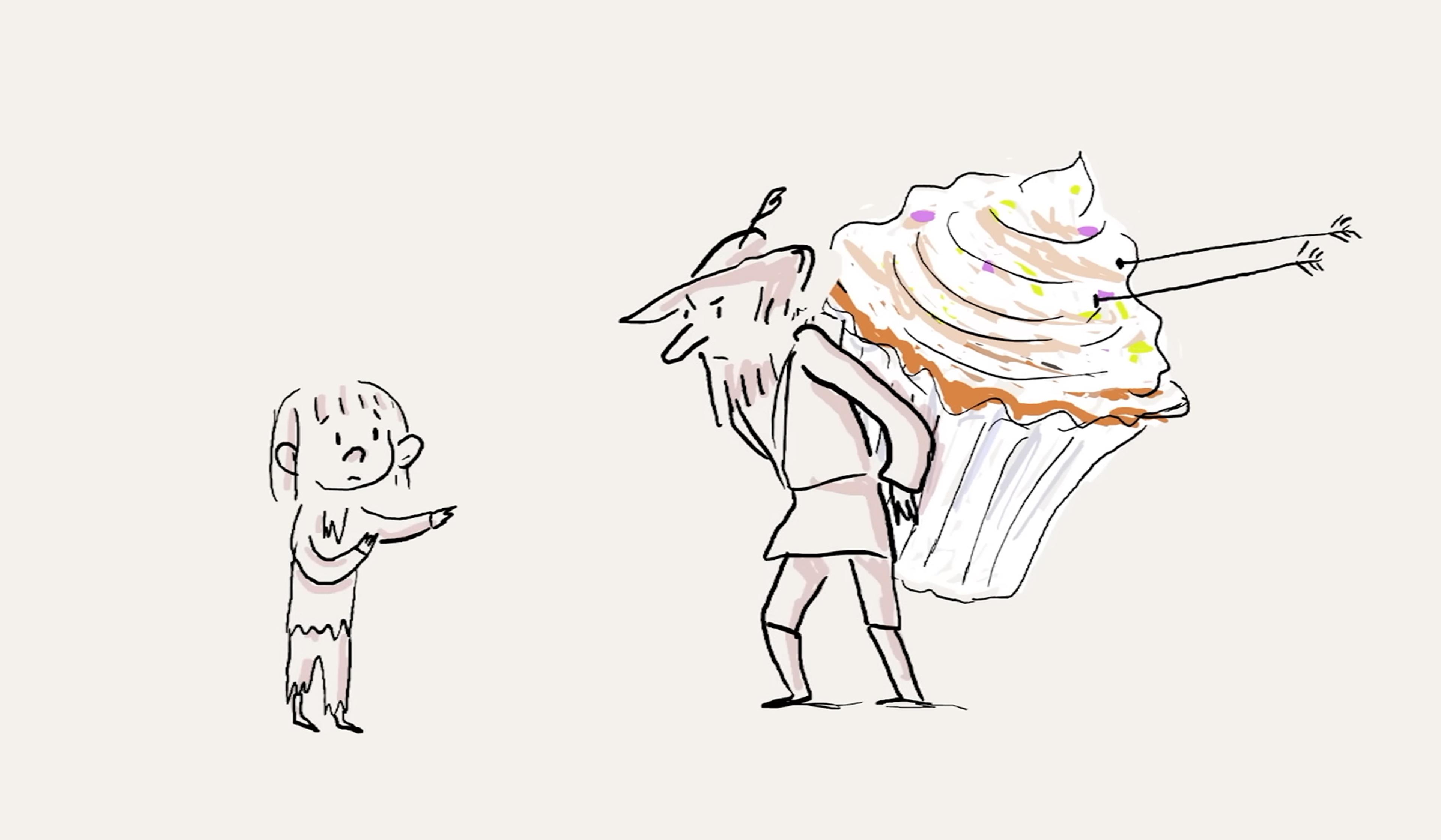
For Iris Murdoch, selfishness is a fault that can be solved by reframing the world

The moral risks of fandom
Players, coaches and team owners sometimes do terrible things. What, if anything, should their fans do about that?
Jake Wojtowicz & Alfred Archer

Computing and artificial intelligence
Frontier AI ethics
Generative agents will change our society in weird, wonderful and worrying ways. Can philosophy help us get a grip on them?

Space exploration
Capturing the cosmos
When self-replicating craft bring life to the far Universe, a religious cult, not science, is likely to be the driving force
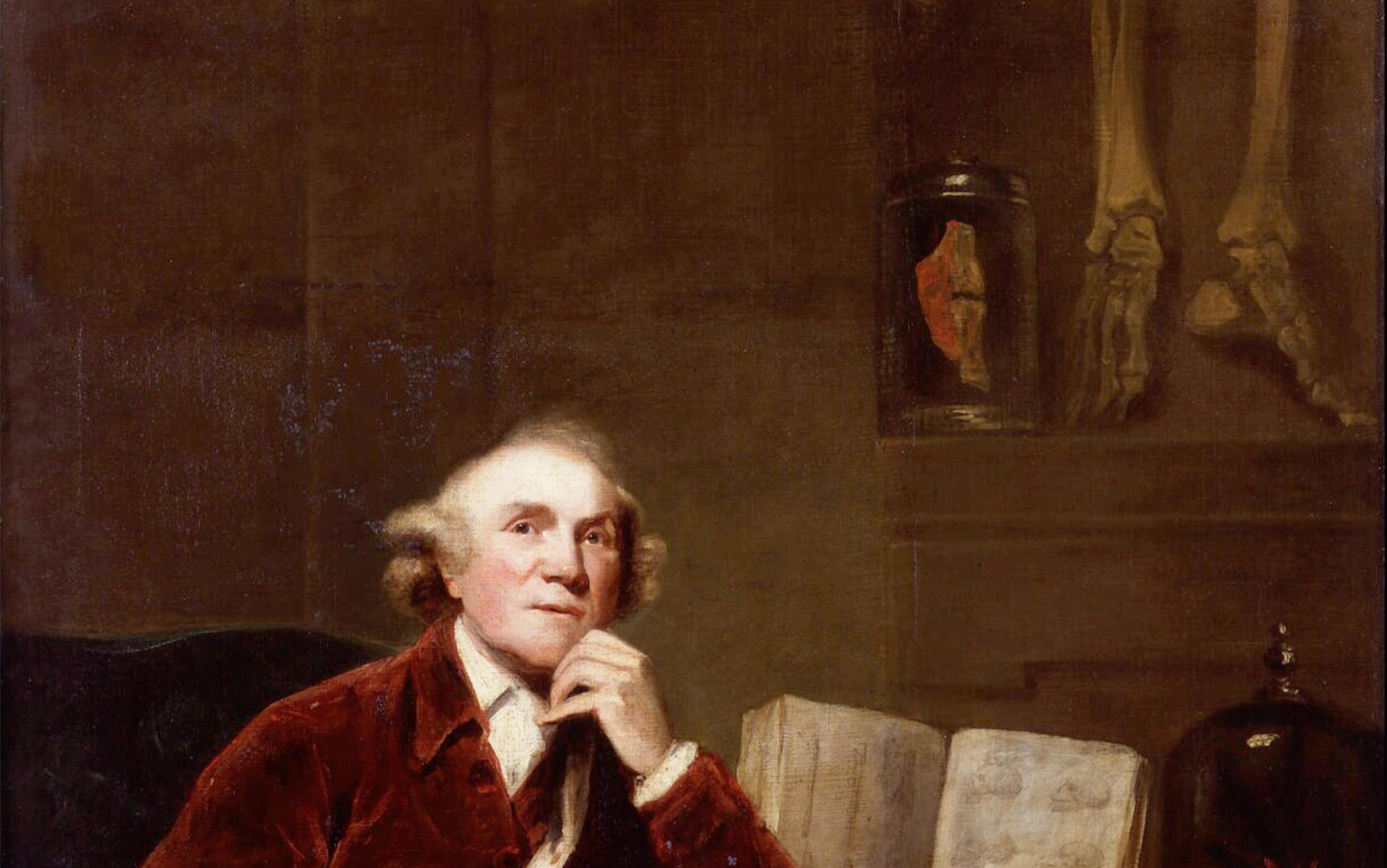
History of science
The rights of the dead
From the Irish Giant to the Ancient One, is it ever ethical for scientists and museums to study bodies without permission?
Anita Guerrini

Comparative philosophy
Forging philosophy
A 17th-century classic of Ethiopian philosophy might be a fake. Does it matter, or is that just how philosophy works?
Jonathan Egid

Ethics has no foundation
Ethical values can be both objective and knowable – torture really is wrong – yet not need any foundation outside themselves
Andrew Sepielli

The final ethical frontier
Earthbound exploration was plagued with colonialism, exploitation and extraction. Can we hope to make space any different?
Philip Ball

Wrestling with relativism
Bernard Williams argued that one’s ethics is shaped by culture and history. But that doesn’t mean that everyone is right
Daniel Callcut

History of ideas
Equality without compromise
Liberal philosophy has clipped the wings of the egalitarian ideal. We should return to the bolder ideals of Iris Murdoch
Christine Sypnowich

Thinkers and theories
Remember Richard Price!
Demonised by the political establishment for his radical, dissenting views, this 18th-century Welsh polymath deserves better
Huw Williams

Philosophy of religion
Reckoning with compassion
After an abuse scandal destroyed my Buddhist community, I had to reconsider what it means to live an ethically attuned life
Jessica Locke

Future of technology
Artificial ‘creativity’ is unstoppable. Grappling with its ethics is up to us

The ethics of human extinction
Why would it be so bad if our species came to an end? It is a question that reveals our latent values and hidden fears
Émile P Torres

If not vegan, then what?
A vegan diet can be hard to adopt, even if you’re convinced it’s the right thing to do. What are the next-best options?
Peter Godfrey-Smith
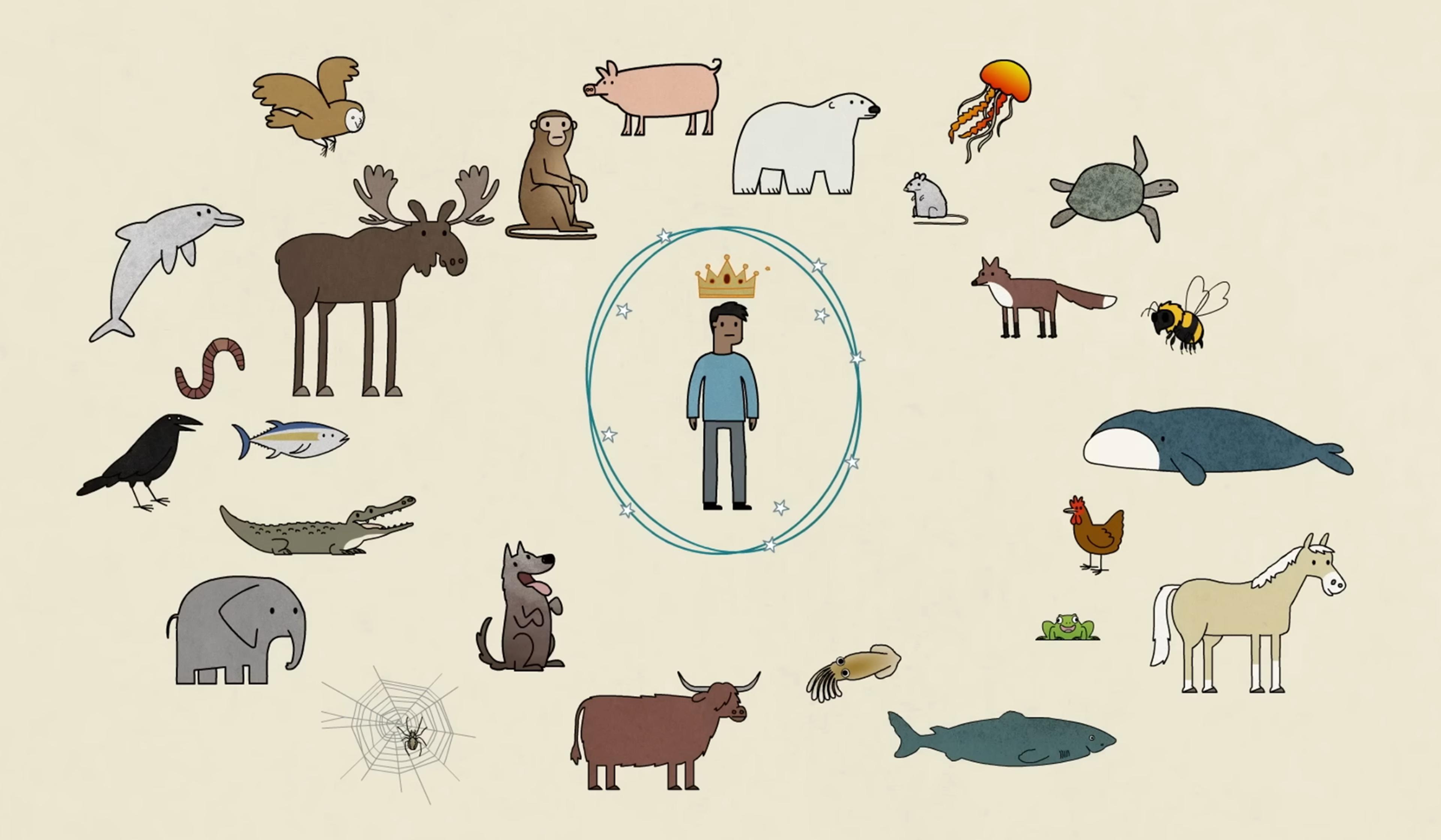
How many monkeys is it worth sacrificing to save a human life?

Human rights and justice
Thirty years after one teenager shot another, is it time to forgive?
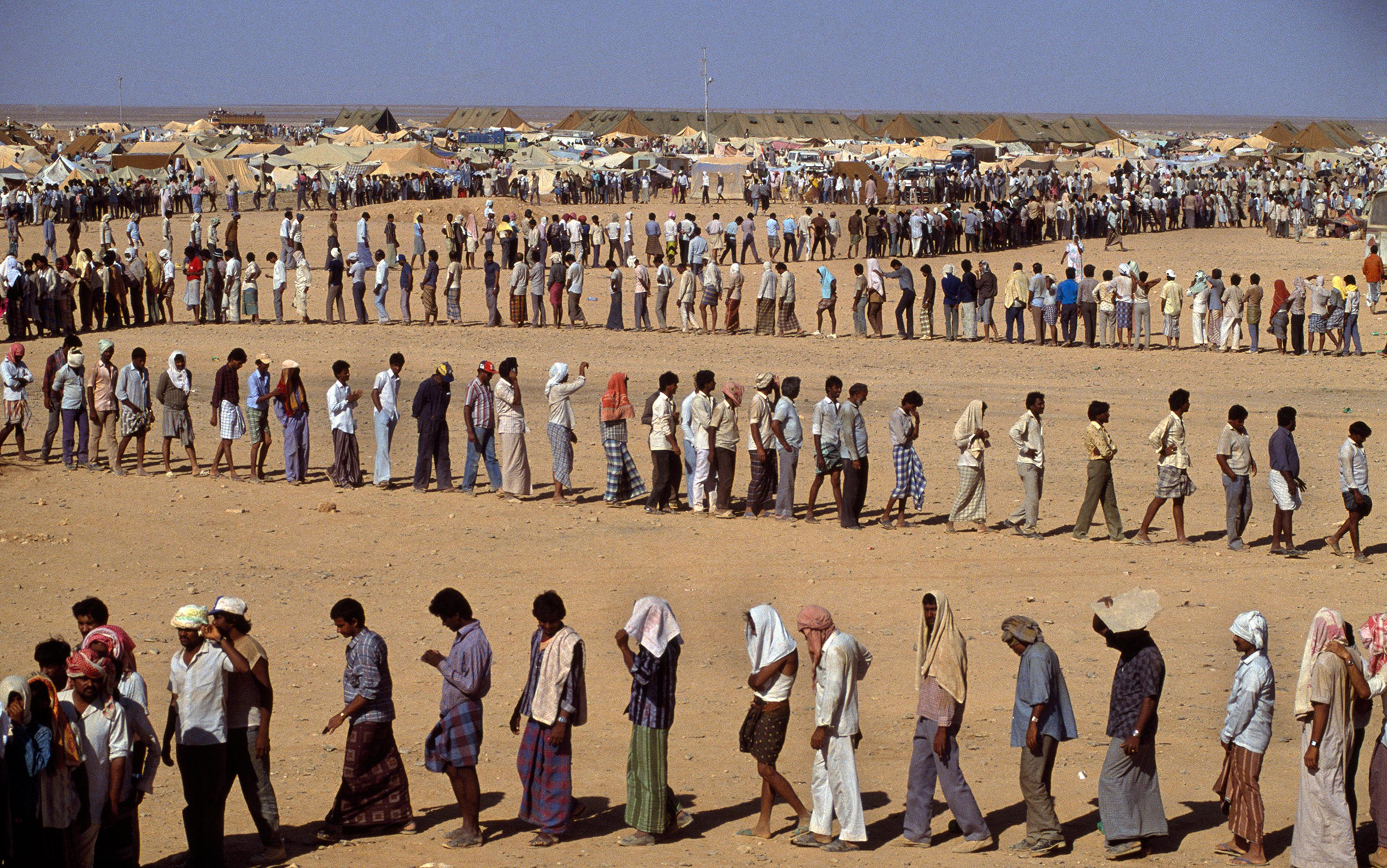
Moral mathematics
Subjecting the problems of ethics to the cool quantifications of logic and probability can help us to be better people

The lethal act
The Buddha taught not to kill, yet his followers have at times disobeyed him. Can murderers still be Buddhists?
Martin Kovan
University of Notre Dame
Notre Dame Philosophical Reviews
- Home ›
- Reviews ›
Essays on the History of Ethics

Michael Slote, Essays on the History of Ethics , Oxford UP, 2010, 165 pp., $65.00 (hbk), ISBN 9780195391558.
Reviewed by Richard H. Dees, University of Rochester
Michael Slote is best known for his efforts to develop an ethics of care, but in this book he takes a detour into the history of ethics to explore some country lanes running near his main road. The result is an eclectic mix that is less a series of essays in the history of ethics than the intelligent musing of an ethicist while reading historical primary sources. Nevertheless, Slote’s reflections offer some real insights, sometimes into the philosophers he considers, but more often into the nature of moral thought in general.
Slote arranges the essays chronologically by the philosopher under discussion, for no other reason than there is no other overarching theme to the book. So Slote winds his way through Greek ethics, Chinese ethics, Hume, Kant, utilitarianism, and the ethics of care. But he also includes a very personal history of twentieth-century ethics that offers a unique perspective and is simultaneously quite touching.
Slote’s essays on the Greeks (chs. 1-3) advance three ideas: “elevationism,” teleology, and the differences between ancient and modern thought. Of teleology, Slote claims that it is no longer a viable thesis since its modern successor, consequentialism, does not accept a key component of the view: the goal for which we must self-consciously aim. Slote’s distinction here is fine, but I think it an open question to what degree non-modern consequentialists really thought that we had to aim consciously at the telos . On the differences between ancient and modern ethics, Slote focuses neither on the modern tendency to rely on guilt rather than shame as the central moral emotion nor on the modern emphasis on individualism. Instead, he thinks the difference lies in what Sidgwick called the “duality of practical reason”: the difference between what is best for individuals and what is best for everyone. The ancients, Slote claims, did not see a deep distinction between prudence and morality, while moderns do. But again, this distinction is less important than Slote thinks. While the ancients were intent to show that being moral was in everyone’s best interest, they too saw the tension: Book I of the Republic makes no sense unless ordinary people thought that justice often conflicted with their own self-interest.
Much more interesting is Slote’s idea of “elevationism,” which he proposes as the opposite of reductionism. If reductionist theories try to explain higher ethical concepts in terms of lower ones like well-being and then try to explain well-being in terms of natural properties like pleasure, then elevationist theories try to explain lower concepts by means of higher ones. So, for example, the Stoics saw well-being and personal good only in terms of virtues that they might exhibit. But Stoicism, Slote notes, is deeply unintuitive because it does not see ordinary pleasures as part of our good or pains as evils. By contrast, Kant is a dualist, so that well-being and virtue are different and can not be reduced into each other, with well-being representing a kind of sensibility and virtue a kind of understanding. But Slote does not think we are forced to this kind of dualism, and he wants to explore alternatives for elevationism. Aristotle finds that pleasures gained through injustice do the person no good, and so he thinks pleasures require a participation in virtue. But, Slote argues, Aristotle implausibly claims that pleasures obtained through a vice are no part of a good, so that stolen food can not contribute to his good. For that reason, Slote thinks the most promising elevationist is Plato, who argues that a pleasure is good as long as a virtue in exhibited in the course of the enjoyment. So relationships are good because they require a concern for others, achievement is good because it requires perseverance, and wisdom is good because it requires courage. Appetites, to be good, then, require limitations, and they must be properly ordered before they can be a genuine good. The details of Slote’s characterization of Platonic elevationism need not concern us here, except to note that Slote’s interpretation, while inherently sketchy, offers a new way to look at the project of ethics. He does not convince me — or even himself, I think — that we should adopt elevationism as a theory, but he makes it sound both plausible and attractive.
The middle of Slote’s set of essays focuses on the most prominent precursor to Slote’s own form of sentimentalism: Hume. After a brief foray into Chinese ethics in a review of Bryan van Norden’s book that argues for an affinity between important Chinese thinkers and Aristotle that Slote think would be better compared to Hume (ch. 4), Slote offers two substantive essays about Hume’s moral theory that seek to show both why Hume’s view is generally correct and what needs to be done to make it better. In “Hume on Approval” (ch. 5), Slote defends a notion of moral approval and disapproval that is suggested by Hume by showing how such approvals are possible without presupposing moral judgments. The answer, according to both Hume and Slote, lies in empathy. For Hume, approval is a feeling that arises when we empathize with the pleasures of other people, at least insofar as it has been corrected to take out our own relationships so that we can have a common moral language. But this view, Slote claims, does not enable us to exclude our response to inanimate objects that cause harm to humans. Hume’s reply that the feeling is simply phenomenologically different is, Slote rightly notes, inadequate — even if Hume’s defenders can, with some effort, construct other ways to make the distinction. But Slote also claims that Hume’s view that the approvals are always pleasant feelings is wrong because we can give a grudging and phenomenologically unpleasant approval to a worthy opponent. On this point, Slote is just mistaken: Hume agrees that as agents, we do not feel pleasure at the approval to our archenemy, but the approval consists only in the pleasure we have when contemplating our opponent’s achievements from a certain “general” point of view.
According to Slote, Hume’s main problem is that he lacks a way to focus our approvals on moral agents. What he needs, Slote says drawing on his own book, The Ethics of Care and Empathy , is to focus on “agential empathy” (68): “we empathize … ”“>with what they as (potential) agents are feeling and/or desiring; and such empathy is the core or basis of moral approval and disapproval” (68). Moral approval, then, is based on the positive feelings we have when we empathize with an agent who shows empathy for others; it is, then, “empathy with [the standpoint of] ”“>agents” (68). We approve of those who empathize with others and disapprove of those who do not. His view is based on what he calls the “empathy-understanding hypotheses”: “the idea that empathy enters into our understanding and making of genuine moral claims” (83). Such a view avoids Hume’s problem, Slote argues, because we can not empathize with the response of inanimate objects to others. In addition, Slote thinks this moves helps avoids the most important of the standard criticisms of sentimentalism: the claim that it is circular, because the feelings of approval themselves depend on moral judgments. To answer it, sentimentalists need to be able to say what counts as positive and negative features in their own terms. They must be able to argue that someone with empathy will be moved toward the kinds of actions that others will empathize with, and that tendency constitutes the positive aspect of it. Slote suggests that this empathy can account for our intuitive judgments that favor harms that are more visible to us and for those that correspond to our deontological judgments. It also explains why morality is inherently motivating, because the empathy involved in morality automatically carries some motivational weight, and it explains why moral judgments are asymmetrical about self and others, because we do not empathize with ourselves in the same way that we do with others.
However, this schema does not, by itself, solve the circularity problem. On Slote’s view, we are supposed to get a “chill” (78) when we empathize with an agent who responds cruelly to others. But when we empathize with the sadist, we could equally feel the pleasure, so Slote must give us reason to prioritize the feelings of the sadist’s victims over those of the sadist himself. Hume tries to solve the problem by having us empathize with everyone that an agent potentially affects, with a special emphasis on those who are in the agent’s “narrow circle” — and Hume thinks we can make that judgment based just on the tendency of the agent’s disposition, whether or not his cruelty causes actual harm. But Hume seems to be counting on numbers here: the agent’s cruelty is likely to have bad effects on enough people to outweigh his own pleasure. Slote’s view can do better only if he can give a more convincing account of the priority we give to the objects of cruelty. This concern does not constitute a fatal objection to sentimentalism, but it needs something more than Slote offers here to answer it.
A different circularity problem is explored in Slote’s second essay on Hume, “Hume on the Artificial Virtues” (ch. 6) Hume’s problem with justice is that he wants to accommodate our deontological intuitions in the way we treat justice as something inflexible, while staying true to his sentimentalism. But that account is threatened with circularity, Slote claims, because Hume thinks the artificial virtues are motivated by our sense of obligation, but morality itself is supposed to be grounded in the moral goodness of the motivations. Previous attempts to get Hume out of the circle focus on our natural sentiments for self-interest or for the public interest, and so it must show that our rigid attitude is required to get the benefit. The artifice is then just a means to achieving justice, but does not itself provide a justification. The problem is that justice sometimes requires us to go against our self-interest or even against the public interest, and so the rigidity can only be sustained, Slote argues, by an ignorance about the real effects of a few deviations from simple rules. But even so, the account does not, Slote claims, explain why we would morally approve of the rigidity in situations in which we are better served by breaking those rules. So Slote concludes that Hume’s account of justice, as valuable as it is, ultimately fails.
What Slote misses in his criticisms of Hume’s account is precisely the social nature of the conventions that are the basis of the artificial virtues. We can have exceptions to rules about promise keeping, as Slote acknowledges, only when the exceptions are themselves general rules. But for artificial virtues, those exceptions must themselves become socially recognized as exceptions or the social utility of the institutions will be undermined. There must be a rule or a process that allows the exception. Such an attitude does not reduce the exceptions to “whatever produces utility,” since many instances that might increase utility cannot be set out in rules that people could actually use.
Slote’s last essay on the modern period is one cheer for Kant (ch. 7). Even anti-Kantians like himself, Slote claims, must recognize three important notions first found in Kant: (1) the categorical nature of moral claims, (2) the distinction between what is good for a person and what is a good state of affairs, and (3) the inward character of morality, the idea that moral assessments depend only on an agent’s intentions, keeping in mind that agents are obliged to take due care to see that their intentions are fulfilled. Slote is not mistaken to emphasize these points in Kant, but he puts too much weight on Kant’s originality, mostly because Slote simply ignores the religious background to all of these positions. Kant’s true originality lies in the account of autonomy that Slote finds misguided.
In the last three essays, Slote comes to terms with more recent history. In two essays, he wants us to rethink the history of ethics. In “Reconfiguring Utilitarianism” (ch. 8), he notes that while we used to regard utilitarianism as a truncated version of common-sense morality that needed justification, we now see common-sense morality as a complex view compared to utilitarianism that must now itself be justified. The irony, he thinks, is that this turnabout came because neo-Kantians like Rawls tried to provide a justification for the deontological constraints of common-sense morality, and so those constraints were no longer accepted as self-evident. In “Carol Gilligan and the History of Ethics” (ch. 10), he shows that Gilligan’s work on the different voices of ethics helps us to see the importance of some previously-neglected trends in the history of ethics, like Christian agapism as well as the British sentimentalists. This new history is also a deeper one, he thinks, since it gives a larger role to the story of how we can come to adopt an ethics that does not clash with our sense of ourselves in ordinary human terms.
The penultimate essay (ch. 9) is the most personal. Through a discussion of the influences on his own philosophical thought, Slote gives a history of late-twentieth century ethics: how Thomas Nagel and Derek Parfit taught him the importance of theory, how Bernard Williams and Michael Stocker added human and humane touches to morality and showed that a good life is not about following rules, and how Carol Gilligan and Nel Noddings opened his eyes to feminism and to different ways of seeing ethics. But he holds up two different philosophers as his most important influences: John Rawls, who, besides offering the most important contributions to ethics in the twentieth century, also made the practice of normative ethics respectable again; and Philippa Foot, whom he regards as the most incisive philosopher he has known and whose central insight - that our values cannot simply be arbitrary - is now so widely accepted that her influence has become invisible. 1 The chapter is a fitting end to the collection, and the fact that it is not the actual end is a testament to Slote’s own desire to pay tribute to the different voices found in Gilligan’s work and to which his own work owes so much.
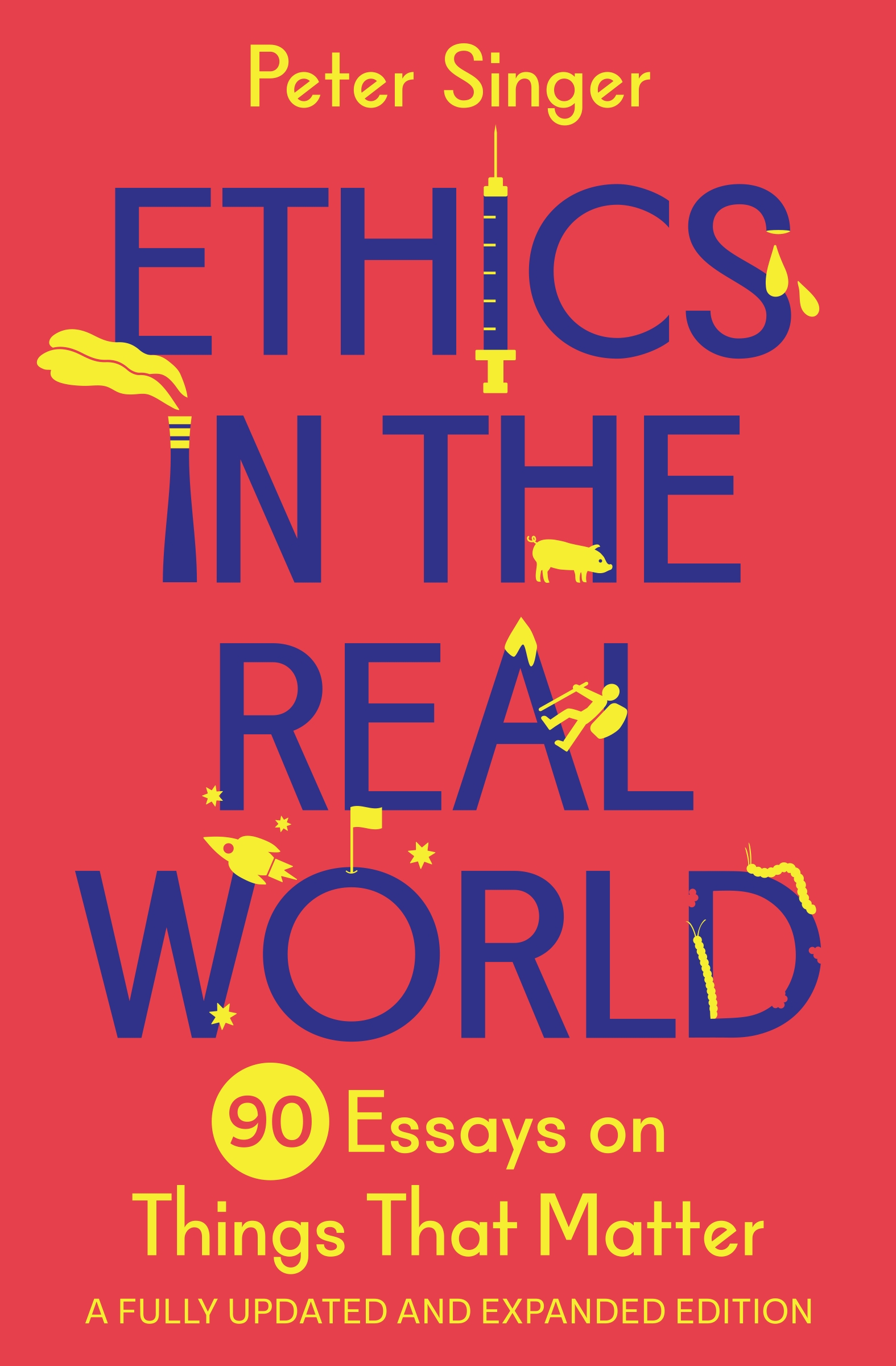
Ethics in the Real World
- Peter Singer
- Not for sale in Australia and New Zealand
Before you purchase audiobooks and ebooks
Please note that audiobooks and ebooks purchased from this site must be accessed on the Princeton University Press app. After you make your purchase, you will receive an email with instructions on how to download the app. Learn more about audio and ebooks .
Support your local independent bookstore.
- United States
- United Kingdom
Ethics in the Real World: 90 Essays on Things That Matter – A Fully Updated and Expanded Edition
Provocative essays on real-world ethical questions from the world's most influential philosopher
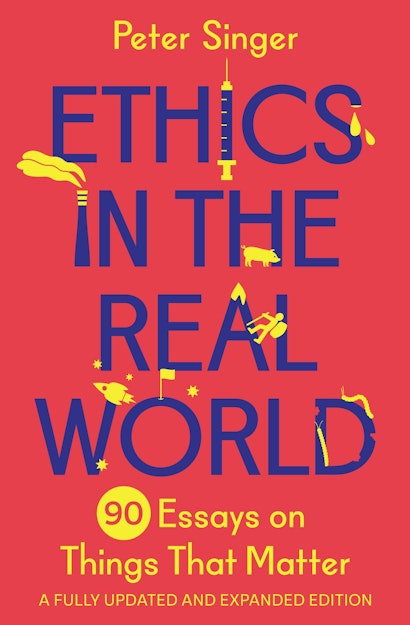
- Look Inside
- Request Exam Copy
- Common Reading Selection
- Download Cover
Peter Singer is often described as the world’s most influential philosopher. He is also one of its most controversial. The author of important books such as Animal Liberation , Practical Ethics , Rethinking Life and Death , and The Life You Can Save , he helped launch the animal rights and effective altruism movements and contributed to the development of bioethics. Now, in Ethics in the Real World , Singer shows that he is also a master at dissecting important current events in a few hundred words. In this book of brief essays, he applies his controversial ways of thinking to issues like climate change, extreme poverty, animals, abortion, euthanasia, human genetic selection, sports doping, the sale of kidneys, the ethics of high-priced art, and ways of increasing happiness. Singer asks whether chimpanzees are people, smoking should be outlawed, or consensual sex between adult siblings should be decriminalized, and he reiterates his case against the idea that all human life is sacred, applying his arguments to some recent cases in the news. In addition, he explores, in an easily accessible form, some of the deepest philosophical questions, such as whether anything really matters and what is the value of the pale blue dot that is our planet. The collection also includes some more personal reflections, like Singer’s thoughts on one of his favorite activities, surfing, and an unusual suggestion for starting a family conversation over a holiday feast. Provocative and original, these essays will challenge—and possibly change—your beliefs about a wide range of real-world ethical questions.
Peter Singer is the Ira W. DeCamp Professor of Bioethics in the University Center for Human Values at Princeton University and the recipient of the Berggruen Prize for ideas that shape human self-understanding. His books include Animal Liberation , Practical Ethics , and The Life You Can Save .

"[Singer] is persuasive on so many topics that he makes you wish we could turn the world off, then on again, in an attempt to reset it."—Dwight Garner, New York Times
"A terrific recent book . . . that wrestles with how much we should donate to charity, and whether wearing a $10,000 watch is a sign of good taste, or of shallow narcissism."—Nicholas Kristof, New York Times
"Could well inspire conversations—and arguments—that deepen and complicate the crucial moral and ethical issues that Singer presents."— Kirkus Reviews
"An accessible introduction to the work of a philosopher who would not regard being described as ‘accessible' as an insult. . . . Despite their brevity, the essays do not shirk the big moral questions."— The Economist
"Philosophy should be a more public endeavor, and Singer's work is an excellent entry point. In a fall that will be shaped by a political contest in many ways detached from genuinely pressing moral issues, it might also serve as a refreshingly complex source of ethical questioning."—Talya Zax, Forward
"Singer demonstrates how to write pungently and succinctly about moral philosophy."—Daniel Johnson, Standpoint
"The essays in the present volume address issues well beyond Singer's normal range of commentary. In sum, this book not only provides a broad-based introduction to Singer¹s moral philosophy but also will serve . . . as an excellent textbook for any course in applied ethics. For philosophers, Singer's work provides a model for how to transition from the ivory tower to the domain of public philosophy."— Choice
"Singer is a provocative, well-informed and hands-on philosopher, with a lucid and engaging writing style. The collection provides a comprehensive and accessible overview of themes that are central to Singer's ethics. . . . His essays are well-structured, engaging, and exemplarily clear. Moreover, his arguments tend to be nuanced and non-dogmatic, in spite of his well-known ethical agenda: here is an ethicist not looking for arguments to support a preconceived conclusion, but sincerely pondering the implications of his utilitarian stance."—Jeroen Hopster, Erasmus Journal for Philosophy and Economics
"Inspiring and enlivening; each essay is an easily digested nugget of acute, inventive reasoning and moral urgency, focused on practical, achievable results and the resistance of lazy, dogmatic thinking. . . . Any reader will find the book accessible; every reader will find it both thought-provoking and challenging."—Shane N. Glackin, Quarterly Review of Biology
"The way Singer approaches his subject matter is awesome and instructive. He picks up news, anniversaries, but also personal encounters, and—within three or four sentences—shows the deeper ethical questions that lie behind these snippets."—Jan Friedrich, Ethical Theory and Moral Practice
"This is a lovable book which deserves to be read and discussed."—Tommi Lehtonen, European Legacy
"This book of clear analysis and challenging thinking encourages readers towards radical shifts of thinking and action."—David Lorimer, Paradigm Explorer
"Quick, punchy and clear. . . . [Singer] has an enviable mastery of his form, and the book provides a representative introduction to the breadth of his public thought."—Simone Gubler, Times Literary Supplement
"Peter Singer is among the most vital moral voices of our time. He urges us to confront not only the question of what we should not do, but also the harder and larger questions of what we should do, and how much we owe to others." —Larissa MacFarquhar, author of Strangers Drowning: Grappling with Impossible Idealism, Drastic Choices, and the Overpowering Urge to Help
"Read this book. Every chapter will make you think. Some hopefully will make you think differently." —Dean Karlan, coauthor of More Than Good Intentions: Improving the Ways the World's Poor Borrow, Save, Farm, Learn, and Stay Healthy
"Peter Singer might well be the most important philosopher alive. He is certainly one of the most enjoyable to read, and it's a joy to browse through this collection of his smart short essays. This is public philosophy at its best—clear, controversial, and deeply rational." —Paul Bloom, author of Just Babies: The Origins of Good and Evil
"Peter Singer has done more good for the world than any other living philosopher, with ideas that have helped fight poverty, transform medical ethics, and protect animals. In this collection of popular essays, his intellect, courage, humanity, good sense, and good humor shine through. This is practical philosophy at its very best, stripped of all pretense and wisely applied to the most important questions of our time." —Joshua Greene, author of Moral Tribes: Emotion, Reason, and the Gap Between Us and Them
"Peter Singer, one of the world's best-known and most significant philosophers, addresses some profoundly important issues in this book. He presents the issues and arguments with a lucidity, accessibility, and sharpness reminiscent of Bertrand Russell, another philosopher who sought to have a serious social impact. Ethics in the Real World will undoubtedly be a force for the good." —Bart Schultz, University of Chicago
"Perhaps more than any modern philosopher, Peter Singer has focused on the question of how to live a better life. If you want a philosophy that can directly alleviate human and animal suffering, read this wonderful book." —Sam Harris, author of the New York Times bestsellers The End of Faith , The Moral Landscape , and Waking Up
“I started reading Ethics in the Real World when I was arrested for blocking the entrances of petrol terminals, as part of a Just Stop Oil protest, and finished it when I was in custody for a protest with the animal rights and climate group Animal Rebellion. When I am expecting to be arrested after a protest, I bring a book to read while being held in police custody. This made a fantastic custody book!” —Oliver Clegg, activist
Stay connected for new books and special offers. Subscribe to receive a welcome discount for your next order.
- ebook & Audiobook Cart
180 Ethics Topics & Ethical Questions to Debate
Our code of ethics is derived from what we think is right or wrong. On top of that, we have to agree to the moral standards established by the society we live in. Conventional norms generally label theft, murder, or harassment as bad. However, there are many influences that impact our considerations and understanding of ethics.
Ethics is a branch of philosophy that studies moral issues. This article outlines the three different types of ethics and presents a list of compelling ethics topics for essays and research papers, as well as ethical questions to debate.
You don’t know how to write about ethics or which ethical argument topic to choose for your paper? Maybe your assignment deadline is dreadfully looming over you? Our custom writing service is happy to help you craft a fantastic essay on ethics whenever the need arises.
🔝 Top 10 Ethical Topics
- 🧑🤝🧑Types of Ethics
- 🤔 Ethical Issues
- 🖥️ Computer Ethics
- 🧬 Bioethics
- 🚓👮 Criminal Justice
- ⚖️ Ethical Dilemmas
⭐ Top 10 Ethics Topics to Debate
😈 ethical questions to debate, 🔍 references.
- Religious beliefs vs. medical care
- Issues behind unpaid internships
- Toxic environment at the workplace
- The dilemma of reporting an accident
- Should one’s political leanings be private?
- The limits of doctor-patient confidentiality
- Is it ethical to pay children for good grades?
- Ethics at the workplace and discrimination
- Should social media be allowed at the workplace?
- Promotion of environmental responsibility in business
🧑🤝🧑 Types of Ethics
Modern philosophy splits ethics into three groups: metaethics, normative ethics, and applied ethics.
- The core question of metaethics is: “What is morality, and where does it come from?” It is also concerned with the emergence of human values, motivation, and reasoning.
- Normative ethics seeks to answer the question, “How should I act?” An example of a normative moral theory is Kant’s Categorical Imperative: Act only according to that maxim whereby you can, at the same time, will that it should become a universal law . In other words: be kind.
- Applied ethics seeks to apply moral considerations into real-life controversial subjects. Its contents can vary greatly and touch bioethics as well as criminal justice. It studies specific actions and practices from the point of moral acceptance.
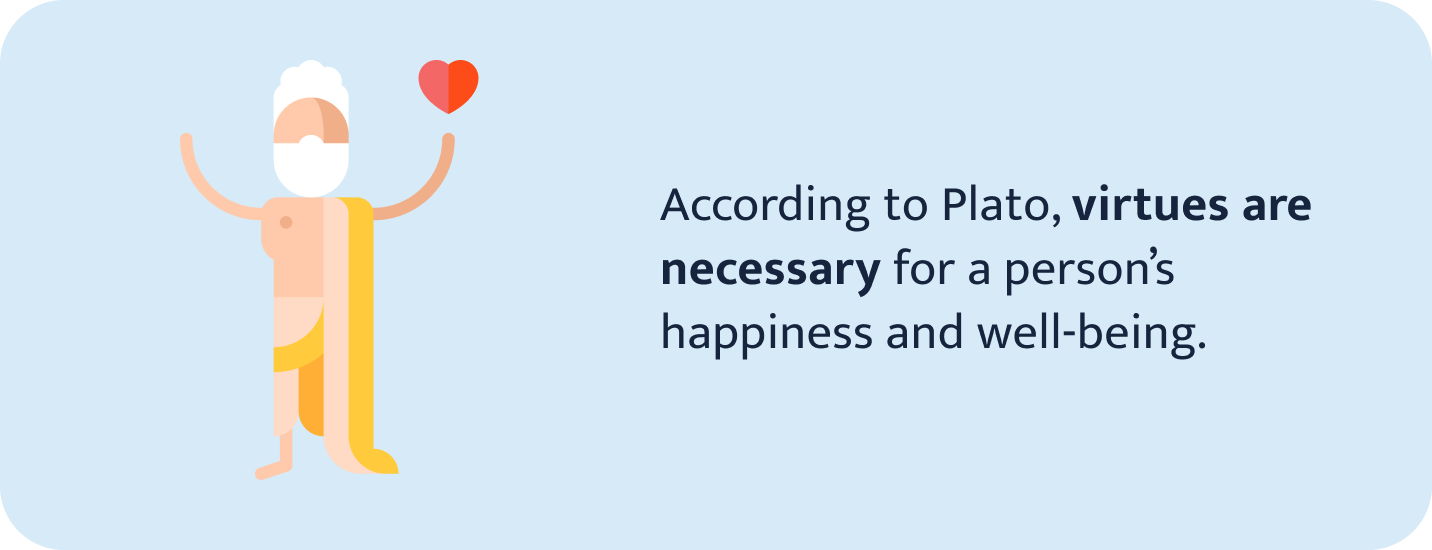
However, ethics does not end with these three types. Over the centuries, philosophers have proposed various ethical theories. Their four general categories are deontological, utilitarian, right, and virtue ethics.
- A deontologist is a person with a set of moral duties from which they will not adhere. When faced with an ethical conflict, they will always act according to their self-proclaimed obligations.
- For a utilitarian , a decision needs to yield the greatest benefit for the majority.
- If rights are the root of an ethical theory, these are the highest priority. A person’s rights can either be established in a society by law or bestowed from one individual upon another.
- Judging someone by virtue means considering a person’s character rather than their actions. Here, an individual’s reputation, motivation, and ethics play a crucial role.
Now that you know the basics, you have the perfect ground to start your ethics essay.
🤔 Ethical Topics for an Essay
Ethical issues are situations in which an individual needs to evaluate which course of action is morally right. Essays on this topic shine a light on difficult questions. Therefore, students need to defend their position convincingly.
- Discuss what we should do about climate change.
- What are the moral problems surrounding abortion?
- Can we still justify eating meat?
- Investigate the use of plastic in the beauty industry.
- Is it unethical to be extremely rich?
- Should you buy Nestlé products despite the fact that the company privatizes water?
- Is the unequal distribution of wealth unethical?
- Discuss how workplace ethics should take sexism into account.
- What can we do to combat racism?
- Why are LGBT+ people discriminated against?
- Should euthanasia be legal?
- Can war be ethical?
- Should schools punish students for attending the Fridays for Future protests?
- Would drug use be unethical if it were legal?
- Explain the moral problems that come with automating jobs.
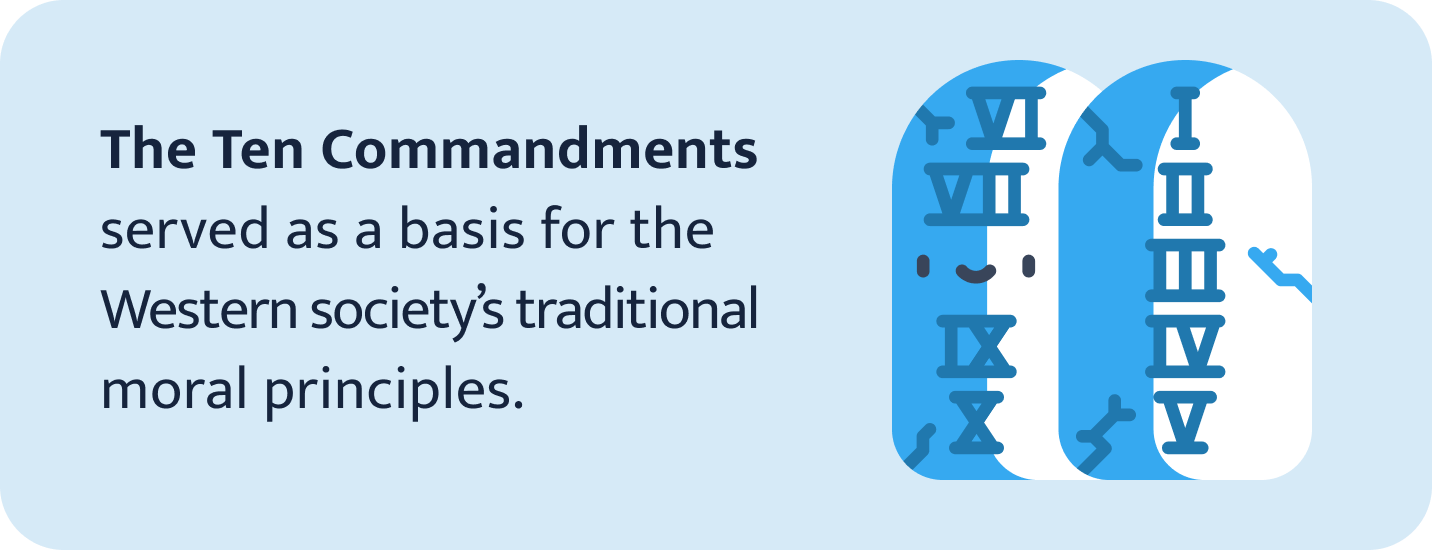
- Is it ethical to hire someone to do assignments for you?
- How far should everyone’s right to privacy go?
- Is using animals for scientific testing unethical?
- How should governments deal with refugees ?
- Discuss the carbon impact of having children.
- Can modern societies still be held accountable for what their nation did in the past?
- Analyze the benefits and disadvantages of universal income.
- How much control should the state have on the press?
- Should schools teach religion?
- What are ethical concerns regarding downloading media from the internet?
🖥️ Computer Ethics Essay Topics
The advent of information technology has altered every aspect of our lives. Computer ethics applies traditional moral theories to everything surrounding computers and cyber security. The list below contains enthralling ethical topics concerned with the realm of computing.
- How much work should we leave entirely to computers?
- Discuss the dangers of storing vulnerable data online.
- Are computers secure enough to contain so much information about our lives?
- Discuss if hacking can be morally justified.
- Examine privacy-related concerns regarding computers .
- Should all software be free?
- How can you legitimize the possession of a computer algorithm patent?
- What can be done to prevent cyberbullying?
- Investigate the moral effects anonymity has on internet users.
- Whose laws apply if you wish to protect your rights online?
- Discuss how the necessity to own a computer impacts poorer nations and people.
- Which ethical problems can people face due to the internet’s possibilities?
- When is sabotaging another person’s computer justified?
- Analyze the social responsibility that comes with developing new software.
- Are computer crimes less harmful than crimes against humans?
- Who owns information that is distributed online?
- What is more important: easy accessibility or privacy?
- Investigate the moral problems associated with AI.
- If a computer makes a critical mistake, whose fault is it?
- Discuss the importance of netiquette.
- How should tech companies deal with ethical problems?
- Can AI algorithms ensure ethical behavior?
- Why do tech companies need ethics boards?
- Which ethical conflicts appear when using drones?
- Investigate racial bias in facial recognition systems.
🏅 Sports Ethics Topics for a Paper
Morality in sports is based on integrity, respect, responsibility, and fairness. Often, this puts athletes into a dilemma: do I want to be ethical, or do I want to win? Answering these questions is not always easy. The following list compiles sports topics for a research paper on ethics.
- What are moral complications when using enhancement drugs?
- Is gamesmanship unethical?
- How important is ethics in sports?
- Discuss the moral responsibilities of athletes .
- What are ethical reasons to pay college athletes?
- Investigate the ethical implications of kneeling for the national anthem .
- Can college sports and the principles of higher education go hand in hand?
- Investigate the sexist bias in sports.
- Was it selfish when the American female soccer team went to court to demand equal pay?

- What moral obligations do universities have towards their athletes?
- When can you justify cheating?
- Concerning the environment, how can professional sports events be ethical?
- Which ethical issues do healthcare workers have concerning sportspeople?
- Which moral duties do teams’ coaches have?
- Are the extremely high salaries of sports professionals justified?
- In 2003, the Olympics abolished the wild card system. Was that fair?
- Because of the Paralympics, disabled athletes cannot take part in the real Olympics. Is that discriminatory?
- Discuss how money influences the fairness of a sport.
- Debate if and how children are exploited to become elite athletes.
- Which moral duties should a good sport follow?
- How much should parents get involved in their child’s physical education?
- Investigate if everyday codes of ethics should apply to sports.
- Discuss the ethical implications of motorsports.
- Who is responsible if a player gets injured?
- Are referees always fair?
🧬 Bioethics Topics for an Essay
Bioethics comes into play when we talk about life and health. It expands from genetics to neurology and even plastic surgery. In the name of the common good, researchers often find themselves in conflicting positions. This makes bioethics an especially exciting topic to write about.
- Discuss the moral conflicts of genetic engineering .
- What are the ethical responsibilities associated with using CRISPR ?
- Investigate the problems of stem cell research.
- When can humans be used for drug testing ?
- Should vaccinations be mandatory for everyone?
- Investigate the ethics that apply to a medical worker.
- Discuss the harmful effects of plastic surgery .
- Should a person who is brain dead be kept alive?
- Is it just that medical care is linked to an individual’s ability to pay?
- Should everyone be an organ donor by default?
- What is more important: a person’s right to privacy or the information of at-risk relatives?
- Is prenatal invasive testing ethical?
- Should neuroenhancement drugs be legal?
- Discuss ethical conflicts concerning Disclosure and Barring Service.
- Is it ethical to improve memory functions with brain stimulation?
- Analyze the ethical issues concerning precision medicine.
- What are the problems of surrogacy ?
- Should medical personnel collect healthy tissues of a deceased person without their consent?
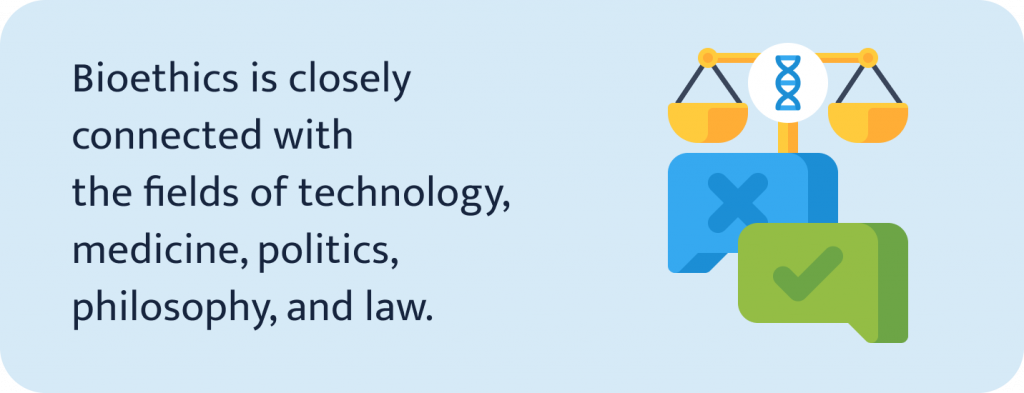
- What should be done with the child of a brain-dead pregnant woman?
- How important is a subject’s anonymity during research?
- Discuss the ethics of shared decision-making .
- How much responsibility do mentally challenged people carry for their actions?
- Was Sweden right not to impose strict lockdown rules during the COVID-19 pandemic?
- To what extent are businesses responsible for their employees’ health?
- Should universal healthcare be free?
🚓👮 Criminal Justice Ethics Topics to Write About
Law enforcers should always act ethically. Unfortunately, it is not always the case. Police officers and attorneys often end up in morally ambiguous situations. In many cases, they don’t do what the public deems the right thing. Below are the examples of criminal justice ethics topics.
- When is it legitimate for a police officer to use violence?
- How can an officer remain impartial?
- Should law enforcement visibly wear guns in public?
- How much force is too much?
- Investigate possible ethical implications associated with true crime podcasts.
- Should prostitution be legal in the US?
- How ethical is interrogation ?
- Can torture be justified?
- Discuss the ethical consequences of lying when working in criminal justice .
- Is working undercover deception?
- Debate whether it is an American citizen’s moral duty to participate in jury duty.
- Should the police be allowed to access everyone’s data?
- Discuss the moral complications of “innocent until proven guilty.”
- Should convicted pedophiles be allowed to see their children?
- Can teaching ethics at schools prevent crime?
- Analyze ethical problems of the Stanford Prison Experiment.
- Should NATO have become involved in America’s Afghan war?
- What are the ethical implications of shooter drills at school?
- Was Edward Snowden morally in the wrong?
- How should we deal with child soldiers?
- Discuss if the prosecution of Julian Assange is justified.
- Examine the ethical problems of private prisons.
- What moral obligations should someone consider when granting prisoners the right to work?
- When is capital punishment justified?
- Is it ethical to incarcerate juvenile offenders ?
⚖️ Ethical Dilemma Topics to Write About
An ethical issue becomes a dilemma when different moral standards clash with each other. In this situation, it is impossible to find a path to an ethically permissible solution that is unambiguous. The following sample topics are a solid base to start a discussion on morals.
- Should parents watch over what their children do on the internet?
- Would you report an accident you caused if there are no witnesses?
- What should a doctor do if a patient refuses life-saving treatment for religious reasons?
- Should you turn down a client if their political views do not match yours?
- Would you promote something you are not convinced of to get money?
- Should you lie to land a job that gets you out of poverty?
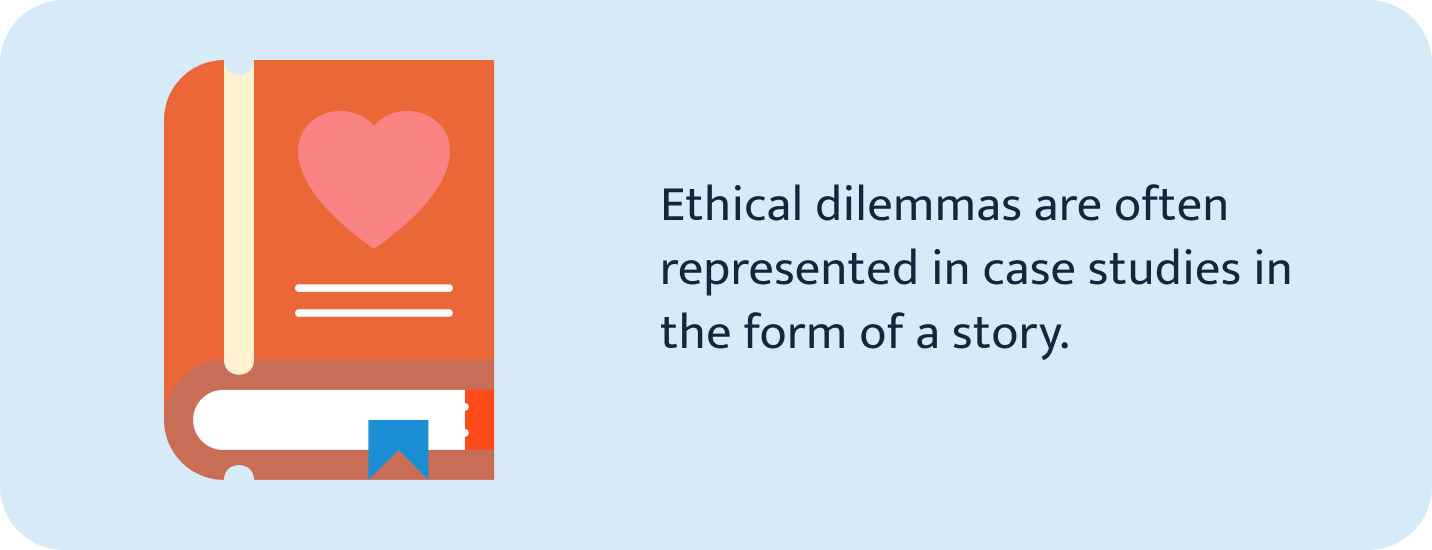
- Your partner cheated on you. Now, you get the chance to take your revenge with someone you really like. Would you do it?
- Should students use automated writing tools like free thesis generators , summarizers, and paraphrasers?
- Your teacher is continuously mocking your classmate. You are a teacher’s pet. Would you speak up?
- Your son likes to wear dresses. One day, he asks if he can wear one to school. Will you let him?
- You are very religious. Your daughter wants to get married to another woman and invites you to her wedding. What will you do?
- Prenatal testing showed that your unborn child has a disability. Would you terminate pregnancy?
- You are in a long-term relationship. Suddenly, your partner gets a job offer in another part of the world. What would you do?
- You have a terminal illness. This makes you a financial burden to your relatives. Are you obliged towards them to quit your treatment?
- You have a red and a blue candy bar. Blue is your favorite, but you also know that it’s your friend’s favorite. Will you give it to them?
- A friend asked you for a loan. Since then, they have not given you anything back. They are still not wholly stable financially. Will you ask them to return the money?
- Your grandma passed away and bequeathed her favorite mink coat to you. You are a vegan. What do you do?
- A few years ago, you borrowed a gun from a friend. Now, they ask for it back, but their mental state seems to be rapidly deteriorating. This makes you scared they are going to shoot someone, or themselves. What do you do?
- You find out that your friend cheats on their spouse. You are close friends with their family. Will you tell on them?
- For your birthday, your friend gave you a sweater they’ve made themselves. You think it’s ugly. Do you tell them?
- You are a vegan . Should you buy vegan products which are highly problematic to produce?
- You are in a restaurant. Your order arrives too late. The waitress looks stressed. Will you make her take it back?
- You went to the store and bought a new, expensive item. The clerk gives you too much change. Do you give it back?
- You are walking with a friend and find $50 on the floor. Would you share it with them?
- Your child firmly believes in Santa Claus. One Christmas , they start suspecting that he is not real. What do you do?
- Is having pets ethical?
- Can eating meat be justified?
- Should we defund the police?
- Should atomic bombs be banned?
- Can discrimination be justified?
- Is it ethical to ask someone’s age?
- Should children get paid for chores?
- Is it unprofessional to send voice messages?
- Should children be allowed to vote?
- Should influencers promote products they don’t use?
- Should there be any limitations to doctor and patient confidentiality?
- Should physician-assisted suicide be allowed?
- Can teenagers get plastic surgery?
- What to do when you find out that your relative has committed an offense?
- What to do when you see your friend cheating on the exam?
- Should sportsmen be paid more than teachers?
- Should gender quotas be used during parliamentary elections?
- Do companies have the right to collect information about their customers?
- Can politicians appeal to religious issues during electoral campaigns?
- Should fake news be censored in a democratic society?
We hope that in this list you’ve found the ethics topic that fits you the best. Good luck with your assignment!
Further reading:
- 430 Philosophy Topics & Questions for Your Essay
- 226 Research Topics on Criminal Justice & Criminology
- 512 Research Topics on HumSS (Humanities & Social Sciences)
- 204 Research Topics on Technology & Computer Science
- What’s the Difference Between Morality and Ethics?: Britannica
- What is Ethics?: Santa Clara University
- Ethics: Internet Encyclopedia of Philosophy
- Metaethics: Stanford Encyclopedia of Philosophy
- Ethical Issues: Idaho State University
- The Problem with AI Ethics: The Verge
- Sports Ethics: Santa Clara University
- What Is Bioethics?: Michigan State University
- Ethics in Criminal Justice: Campbellsville University
- Kant’s Formula of Universal Law: Harvard University
- Share to Facebook
- Share to Twitter
- Share to LinkedIn
- Share to email

A definition explains the meaning of a term or a concept. In a dictionary, you’ll find a definition in a single sentence. A definition paper, however, encompasses several paragraphs. Such an essay, amongst other things, can include personal experience and examples. To write a successful definition paper, you need to...

As simple as it is, the purpose of the descriptive essay is to explain or portray its subject. It can focus on any topic or issue you want to write about. Be sure that any middle school, high school, or college student can manage this type of creative writing assignment!...

Rhetorical analysis essay focuses on assessing the method used for delivering a message. This assignment isn’t about giving an opinion on the topic. The purpose is to analyze how the author presents the argument and whether or not they succeeded. Keep reading to find out more strategies and prompts for...

A narrative essay tells a story about a series of events. At the core of this kind of essay can be a personal experience or a fictional plot. Any story can be a basis for a narrative essay! Narratives can look similar to descriptions. Still, they are different. A descriptive...

Similar to the instructions in a recipe book, process essays convey information in a step-by-step format. In this type of paper, you follow a structured chronological process. You can also call it a how-to essay. A closely related type is a process analysis essay. Here you have to carefully consider...

In a classification essay, you divide the subject into categories. To create these categories, you single out certain attributes of things. You can classify them according to their characteristics, themes, or traits. Sounds complicated? Be sure that any high school or college student can manage this type of essay!

Throughout your high school years, you are likely to write many evaluative papers. In an evaluation essay you aim is to justify your point of view through evidence.

Immigration is a permanent move to a foreign country. It takes place all over the globe, including the United States. It played an important role in history, and it continues to influence society today. This article offers a variety of immigration essay topics. They are suitable for college-level works, as...

Should you buy a green or a red apple? Before making a decision, people often compare their options. In a compare and contrast essay, you analyze the similarities and differences between certain things. In this article, you’ll find interesting and easy compare and contrast essay topics for college, high school...

An opinion essay requires a student to present a point of view on a chosen subject and back it up with substantial evidence. Like in a debate, the writer has to give their opinion and defend it while using scholarly resources. This article will help you find a good opinion...

It would be great if economics in college would just teach you how to save and make money. In reality, however, students usually write research papers on micro- and macroeconomics topics to learn about the production and consumption of goods on an international level.

The corporate world is the world of the future – there’s no doubt about that. And education in ABM will help you conquer it! What is ABM strand, exactly? ABM stands for Accountancy, Business, and Management. Future leaders and entrepreneurs pursue education in this field to learn the skills essential...

Read the Code of Ethics
The NASW Code of Ethics is a set of standards that guide the professional conduct of social workers. The 2021 update includes language that addresses the importance of professional self-care. Moreover, revisions to Cultural Competence standard provide more explicit guidance to social workers. All social workers should review the new text and affirm their commitment to abide by the Code of Ethics. Also available in Spanish.
- The first Section, "Preamble," summarizes the social work profession's mission and core values.
- The second section, Purpose of the NASW Code of Ethics , provides an overview of the Code's main functions and a brief guide for dealing with ethical issues or dilemmas in social work practice.
- The third section, Ethical Principles , presents broad ethical principles, based on social work's core values, that inform social work practice.
- The final section, Ethical Standards , includes specific ethical standards to guide social workers' conduct and to provide a basis for adjudication.
The primary mission of the social work profession is to enhance human well-being and help meet the basic human needs of all people, with particular attention to the needs and empowerment of people who are vulnerable, oppressed, and living in poverty. A historic and defining feature of social work is the profession’s dual focus on individual well-being in a social context and the well-being of society. Fundamental to social work is attention to the environmental forces that create, contribute to, and address problems in living.
Social workers promote social justice and social change with and on behalf of clients. “Clients” is used inclusively to refer to individuals, families, groups, organizations, and communities. Social workers are sensitive to cultural and ethnic diversity and strive to end discrimination, oppression, poverty, and other forms of social injustice. These activities may be in the form of direct practice, community organizing, supervision, consultation, administration, advocacy, social and political action, policy development and implementation, education, and research and evaluation. Social workers seek to enhance the capacity of people to address their own needs. Social workers also seek to promote the responsiveness of organizations, communities, and other social institutions to individuals’ needs and social problems.
The mission of the social work profession is rooted in a set of core values. These core values, embraced by social workers throughout the profession’s history, are the foundation of social work’s unique purpose and perspective:
- social justice
- dignity and worth of the person
- importance of human relationships
- competence.
This constellation of core values reflects what is unique to the social work profession. Core values, and the principles that flow from them, must be balanced within the context and complexity of the human experience.
Purpose of the NASW Code of Ethics
Professional ethics are at the core of social work. The profession has an obligation to articulate its basic values, ethical principles, and ethical standards. The NASW Code of Ethics sets forth these values, principles, and standards to guide social workers’ conduct. The Code is relevant to all social workers and social work students, regardless of their professional functions, the settings in which they work, or the populations they serve.
The NASW Code of Ethics serves six purposes:
- The Code identifies core values on which social work’s mission is based.
- The Code summarizes broad ethical principles that reflect the profession’s core values and establishes a set of specific ethical standards that should be used to guide social work practice.
- The Code is designed to help social workers identify relevant considerations when professional obligations conflict or ethical uncertainties arise.
- The Code provides ethical standards to which the general public can hold the social work profession accountable.
- The Code socializes practitioners new to the field to social work’s mission, values, ethical principles, and ethical standards, and encourages all social workers to engage in self-care, ongoing education, and other activities to ensure their commitment to those same core features of the profession.
- The Code articulates standards that the social work profession itself can use to assess whether social workers have engaged in unethical conduct. NASW has formal procedures to adjudicate ethics complaints filed against its members.* In subscribing to this Code, social workers are required to cooperate in its implementation, participate in NASW adjudication proceedings, and abide by any NASW disciplinary rulings or sanctions based on it.
The Code offers a set of values, principles, and standards to guide decision making and conduct when ethical issues arise. It does not provide a set of rules that prescribe how social workers should act in all situations. Specific applications of the Code must take into account the context in which it is being considered and the possibility of conflicts among the Code’s values, principles, and standards. Ethical responsibilities flow from all human relationships, from the personal and familial to the social and professional.
* For information on the NASW Professional Review Process, see NASW Procedures for Professional Review.
Furthermore, the NASW Code of Ethics does not specify which values, principles, and standards are most important and ought to outweigh others in instances when they conflict. Reasonable differences of opinion can and do exist among social workers with respect to the ways in which values, ethical principles, and ethical standards should be rank ordered when they conflict. Ethical decision making in a given situation must apply the informed judgment of the individual social worker and should also consider how the issues would be judged in a peer review process where the ethical standards of the profession would be applied.
Ethical decision making is a process. In situations when conflicting obligations arise, social workers may be faced with complex ethical dilemmas that have no simple answers. Social workers should take into consideration all the values, principles, and standards in this Code that are relevant to any situation in which ethical judgment is warranted. Social workers’ decisions and actions should be consistent with the spirit as well as the letter of this Code.
In addition to this Code, there are many other sources of information about ethical thinking that may be useful. Social workers should consider ethical theory and principles generally, social work theory and research, laws, regulations, agency policies, and other relevant codes of ethics, recognizing that among codes of ethics social workers should consider the NASW Code of Ethics as their primary source. Social workers also should be aware of the impact on ethical decision making of their clients’ and their own personal values and cultural and religious beliefs and practices. They should be aware of any conflicts between personal and professional values and deal with them responsibly. For additional guidance social workers should consult the relevant literature on professional ethics and ethical decision making and seek appropriate consultation when faced with ethical dilemmas. This may involve consultation with an agency-based or social work organization’s ethics committee, a regulatory body, knowledgeable colleagues, supervisors, or legal counsel.
Instances may arise when social workers’ ethical obligations conflict with agency policies or relevant laws or regulations. When such conflicts occur, social workers must make a responsible effort to resolve the conflict in a manner that is consistent with the values, principles, and standards expressed in this Code. If a reasonable resolution of the conflict does not appear possible, social workers should seek proper consultation before making a decision. The NASW Code of Ethics is to be used by NASW and by individuals, agencies, organizations, and bodies (such as licensing and regulatory boards, professional liability insurance providers, courts of law, agency boards of directors, government agencies, and other professional groups) that choose to adopt it or use it as a frame of reference. Violation of standards in this Code does not automatically imply legal liability or violation of the law.
Such determination can only be made in the context of legal and judicial proceedings. Alleged violations of the Code would be subject to a peer review process. Such processes are generally separate from legal or administrative procedures and insulated from legal review or proceedings to allow the profession to counsel and discipline its own members.
A code of ethics cannot guarantee ethical behavior. Moreover, a code of ethics cannot resolve all ethical issues or disputes or capture the richness and complexity involved in striving to make responsible choices within a moral community. Rather, a code of ethics sets forth values, ethical principles, and ethical standards to which professionals aspire and by which their actions can be judged. Social workers' ethical behavior should result from their personal commitment to engage in ethical practice. The NASW Code of Ethics reflects the commitment of all social workers to uphold the profession’s values and to act ethically. Principles and standards must be applied by individuals of good character who discern moral questions and, in good faith, seek to make reliable ethical judgments.
With growth in the use of communication technology in various aspects of social work practice, social workers need to be aware of the unique challenges that may arise in relation to the maintenance of confidentiality, informed consent, professional boundaries, professional competence, record keeping, and other ethical considerations. In general, all ethical standards in this Code of Ethics are applicable to interactions, relationships, or communications, whether they occur in person or with the use of technology. For the purposes of this Code, “technology-assisted social work services” include any social work services that involve the use of computers, mobile or landline telephones, tablets, video technology, or other electronic or digital technologies; this includes the use of various electronic or digital platforms, such as the Internet, online social media, chat rooms, text messaging, e-mail and emerging digital applications. Technology-assisted social work services encompass all aspects of social work practice, including psychotherapy; individual, family, or group counseling; community organization; administration; advocacy; mediation; education; supervision; research; evaluation; and other social work services. Social workers should keep apprised of emerging technological developments that may be used in social work practice and how various ethical standards apply to them.
Professional self-care is paramount for competent and ethical social work practice. Professional demands, challenging workplace climates, and exposure to trauma warrant that social workers maintain personal and professional health, safety, and integrity. Social work organizations, agencies, and educational institutions are encouraged to promote organizational policies, practices, and materials to support social workers’ self-care.
Ethical Principles
The following broad ethical principles are based on social work’s core values of service, social justice, dignity and worth of the person, importance of human relationships, integrity, and competence. These principles set forth ideals to which all social workers should aspire.
Value: Service Ethical Principle: Social workers’ primary goal is to help people in need and to address social problems
Social workers elevate service to others above self-interest. Social workers draw on their knowledge, values, and skills to help people in need and to address social problems. Social workers are encouraged to volunteer some portion of their professional skills with no expectation of significant financial return (pro bono service).
Value: Social Justice Ethical Principle: Social workers challenge social injustice.
Social workers pursue social change, particularly with and on behalf of vulnerable and oppressed individuals and groups of people. Social workers’ social change efforts are focused primarily on issues of poverty, unemployment, discrimination, and other forms of social injustice. These activities seek to promote sensitivity to and knowledge about oppression and cultural and ethnic diversity. Social workers strive to ensure access to needed information, services, and resources; equality of opportunity; and meaningful participation in decision making for all people.
Value: Dignity and Worth of the Person Ethical Principle: Social workers respect the inherent dignity and worth of the person.
Social workers treat each person in a caring and respectful fashion, mindful of individual differences and cultural and ethnic diversity. Social workers promote clients’ socially responsible self-determination. Social workers seek to enhance clients’ capacity and opportunity to change and to address their own needs. Social workers are cognizant of their dual responsibility to clients and to the broader society. They seek to resolve conflicts between clients’ interests and the broader society’s interests in a socially responsible manner consistent with the values, ethical principles, and ethical standards of the profession.
Value: Importance of Human Relationships Ethical Principle: Social workers recognize the central importance of human relationships.
Social workers understand that relationships between and among people are an important vehicle for change. Social workers engage people as partners in the helping process. Social workers seek to strengthen relationships among people in a purposeful effort to promote, restore, maintain, and enhance the well-being of individuals, families, social groups, organizations, and communities.
Value: Integrity Ethical Principle: Social workers behave in a trustworthy manner.
Social workers are continually aware of the profession’s mission, values, ethical principles, and ethical standards and practice in a manner consistent with them. Social workers should take measures to care for themselves professionally and personally. Social workers act honestly and responsibly and promote ethical practices on the part of the organizations with which they are affiliated.
Value: Competence Ethical Principle: Social workers practice within their areas of competence and develop and enhance their professional expertise.
Social workers continually strive to increase their professional knowledge and skills and to apply them in practice. Social workers should aspire to contribute to the knowledge base of the profession.
Ethical Standards
The following ethical standards are relevant to the professional activities of all social workers. These standards concern (1) social workers’ ethical responsibilities to clients, (2) social workers’ ethical responsibilities to colleagues, (3) social workers’ ethical responsibilities in practice settings, (4) social workers’ ethical responsibilities as professionals, (5) social workers’ ethical responsibilities to the social work profession, and (6) social workers’ ethical responsibilities to the broader society. Some of the standards that follow are enforceable guidelines for professional conduct, and some are aspirational. The extent to which each standard is enforceable is a matter of professional judgment to be exercised by those responsible for reviewing alleged violations of ethical standards.
1. Social Workers' Ethical Responsibilities to Clients >>
2. social workers' ethical responsibilities to colleagues >>, 3. social workers' ethical responsibilities in practice settings >>, 4. social workers' ethical responsibilities as professionals >>, 5. social workers' ethical responsibilities to the social work profession >>, 6. social workers' ethical responsibilities to the broader society >>.
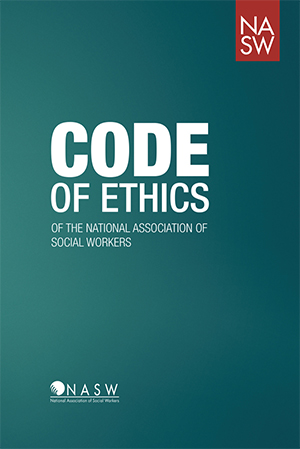
Revised Code of Ethics
- Order a copy of the Code of Ethics
- Order a copy of Código de Ética (Spanish version)
About the Revisions
- 2021 Highlighted Revisions to the Code of Ethics
- Frequently Asked Questions
Home — Essay Samples — Nursing & Health — Birth Control — Free Birth Control: Public Health and Ethics
Free Birth Control: Public Health and Ethics
- Categories: Birth Control Ethics
About this sample

Words: 746 |
Published: Jun 6, 2024
Words: 746 | Pages: 2 | 4 min read
Table of contents
Introduction, public health benefits, economic stability, ethical considerations.

Cite this Essay
Let us write you an essay from scratch
- 450+ experts on 30 subjects ready to help
- Custom essay delivered in as few as 3 hours
Get high-quality help

Prof. Kifaru
Verified writer
- Expert in: Nursing & Health Philosophy

+ 120 experts online
By clicking “Check Writers’ Offers”, you agree to our terms of service and privacy policy . We’ll occasionally send you promo and account related email
No need to pay just yet!
Related Essays
2 pages / 827 words
2 pages / 755 words
3 pages / 1377 words
3 pages / 1486 words
Remember! This is just a sample.
You can get your custom paper by one of our expert writers.
121 writers online
Still can’t find what you need?
Browse our vast selection of original essay samples, each expertly formatted and styled
Related Essays on Birth Control
Oral Contraceptive pills or the Pill as known by many is a type of female contraception that is taken every day to prevent pregnancy. Oral Contraceptives exist in different types including the oestrogen containing pill, the [...]
Based on this information I believe Drug X is more likely to be abused than Drug Y for the following reasons: Drug X has a moderate therapeutic index whereas Drug Y has a low therapeutic index. The higher the therapeutic index [...]
The African Charter on Human and People’s Rights (ACHPR) charter initially highlighted what Human Rights in Africa should look like, and how they should be applied within Africa’s domestic sphere. This charter, also known as the [...]
The Catholic Church has been a large part of our lives for thousands of years, bringing masses of people together through faith in God. Although there has been a decrease in church attendance of all ages in the last century, one [...]
The United States is one of the highest birth rate for teens. If more teens were to take Birth control we would have less abortion rates and less teen pregnancies in the United States. There are many types and the [...]
The accessibility and availability of birth control have long been subjects of debate. This essay explores the question of whether birth control should be available over the counter (OTC). Birth control plays a pivotal role in [...]
Related Topics
By clicking “Send”, you agree to our Terms of service and Privacy statement . We will occasionally send you account related emails.
Where do you want us to send this sample?
By clicking “Continue”, you agree to our terms of service and privacy policy.
Be careful. This essay is not unique
This essay was donated by a student and is likely to have been used and submitted before
Download this Sample
Free samples may contain mistakes and not unique parts
Sorry, we could not paraphrase this essay. Our professional writers can rewrite it and get you a unique paper.
Please check your inbox.
We can write you a custom essay that will follow your exact instructions and meet the deadlines. Let's fix your grades together!
Get Your Personalized Essay in 3 Hours or Less!
We use cookies to personalyze your web-site experience. By continuing we’ll assume you board with our cookie policy .
- Instructions Followed To The Letter
- Deadlines Met At Every Stage
- Unique And Plagiarism Free
- Share full article
Advertisement
Supported by
Guest Essay
Ketanji Brown Jackson Points to a Way Forward for the Court

By Linda Greenhouse
Ms. Greenhouse, the recipient of a 1998 Pulitzer Prize, reported on the Supreme Court for The Times from 1978 to 2008 and was a contributing Opinion writer from 2009 to 2021.
The Supreme Court’s recent rescue of an important federal agency from the hands of a hostile lower court was an exercise in the evolving definition of originalism.
Justice Clarence Thomas, writing for all seven members of a surprisingly lopsided majority, excavated precedents deep in the country’s colonial history for the funding mechanism that Congress chose for the Consumer Financial Protection Bureau. A mechanism that the United States Court of Appeals for the Fifth Circuit deemed unconstitutional was clearly known to and accepted by the Constitution’s framers, Justice Thomas concluded.
Justice Elena Kagan wrote a concurring opinion to say that while the old history was enlightening and adequate to support the agency’s constitutionality, modern practice supported it as well. “All the flexibility and diversity evident in the founding period,” she wrote, has “continued unabated” when it comes to financing government operations.
Notably, two of the court’s conservatives, Justices Brett Kavanaugh and Amy Coney Barrett, in addition to Justice Sonia Sotomayor, joined Justice Kagan’s endorsement of the significance of later, even contemporary, practice when interpreting the Constitution. A true “originalist” would reject such evidence as irrelevant, insisting that all that matters is what the framers did and how people at the time understood their actions. (The two dissenters were Justices Samuel Alito and Neil Gorsuch.)
It was a fascinating development, highly significant if it turns out to mean that the pure originalism invented in conservative think tanks during the 1970s and embraced by judges like Robert Bork and Antonin Scalia is no longer the only interpretive game that a conservative judge can play. The originalist theme was the focus of much of the commentary on the decision, Consumer Financial Protection Bureau v. Community Financial Services Association of America.
However, it is another opinion in the case, one that did not deal with originalism at all, that interests me the most. It was by the court’s junior justice, Ketanji Brown Jackson, and it is a mere five paragraphs long.
A bit of background is necessary in order to understand Justice Jackson’s move. While most federal agencies rely on an annual appropriation, Congress set up the C.F.P.B. differently in order to insulate it from political pressure. Up to a specified cap, the bureau draws its spending money directly from the Federal Reserve system without relying on Congress to grant an annual budget request. In the Fifth Circuit decision that the Supreme Court overturned, a panel of three Trump-appointed judges declared that the Constitution’s Appropriations Clause didn’t permit Congress “to cede its power of the purse” in this way. According to the panel, the bureau’s funding mechanism violated the constitutional separation of powers.
Rejecting this analysis, Justice Thomas wrote that the country’s “pre-founding history supports the conclusion that an identified source and purpose are all that is required for a valid appropriation.” He noted that “under the Appropriations Clause, an appropriation is simply a law that authorizes expenditures from a specified source of public money for designated purposes.”
According to Justice Jackson, that simple definition sufficed to resolve the case. “In my view, nothing more is needed,” she wrote. She then turned to the deeper question of whether federal courts should even involve themselves in disputes of this kind, writing that “an essential aspect of the Constitution’s endurance is that it empowers the political branches to address new challenges by enacting new laws and policies — without undue interference by courts.”
The separation of powers argument actually cuts in the opposite direction, Justice Jackson continued. The trade groups representing payday lenders that challenged the bureau’s constitutionality “would have us undercut the considered judgments of a coordinate branch about how to respond to a pressing national concern.”
Her short opinion is worthy of more attention than it has received. What Justice Jackson is calling for, as a liberal, is what conservatives once said they wanted: judicial restraint. The case is one of several challenges to the modern operation of government that the justices will decide before the end of the current term. One such case asks the court to repudiate a 40-year-old doctrine known as Chevron deference , which requires judges to defer to an administrative agency’s policy choices as long as the choice is plausibly within the boundaries of the agency’s statutory authority. Chevron deference is basically a policy of judicial restraint, even of judicial humility. Even though the doctrine was once embraced by conservatives on and off the court, incumbent conservative justices are impatient for its demise, eager to untie judges’ hands to confront the administrative state.
In her opinion, Justice Jackson quoted from a 90-year-old decision, Nebbia v. New York , upholding a New York law that regulated minimum retail prices for milk. The majority opinion by Justice Owen Roberts was an encomium to judicial modesty. “With the wisdom of the policy adopted, with the adequacy or practicability of the law enacted to forward it, the courts are both incompetent and unauthorized to deal,” he wrote in the passage Justice Jackson quoted. The vote was 5 to 4, with the outcome in favor of economic regulation anomalous for a conservative court that would soon be at war with regulatory aspects of President Franklin D. Roosevelt’s New Deal.
There are many more familiar expressions of judicial restraint that Justice Jackson might have selected. Without presuming to know why she chose this one, I like to think she shares my concern about the collapse of the settlement that emerged from the struggle between Roosevelt and the Supreme Court. The justices, having stared down the president’s “court-packing” plan and newly amenable to upholding New Deal legislation, made a bargain with the American people. It went something like this: We will back off from second-guessing the choices the political branches make about the country’s basic economic arrangements, and we will reserve our strictest judicial scrutiny for legislation that impinges on the welfare of members of “discrete and insular minorities,” to quote a famous footnote in a 1938 decision, United States v. Carolene Products Company .
That approach, having held for half a century, yielded to political reality as courts filled up with anti-regulatory judges and as a societal consensus over which group constitutes a minority in need of special judicial protection evaporated. Is that group defined as straight, white Christian men? Some people, even some justices, may think so.
While concurring with Justice Thomas’s majority opinion, Justice Jackson wrote only for herself. I understand why: Judicial restraint was not a subject the other members of the majority were drawn to at this time. But I take her opinion, modest in its brevity and measured in its tone, as a call to think deeply not only about the lessons of the past but also about the needs of the present.
Linda Greenhouse, the recipient of a 1998 Pulitzer Prize, reported on the Supreme Court for The Times from 1978 to 2008 and was a contributing Opinion writer from 2009 to 2021.
The Times is committed to publishing a diversity of letters to the editor. We’d like to hear what you think about this or any of our articles. Here are some tips . And here’s our email: [email protected] .
Follow the New York Times Opinion section on Facebook , Instagram , TikTok , WhatsApp , X and Threads .
- Search Menu
Sign in through your institution
- Browse content in Arts and Humanities
- Browse content in Archaeology
- Anglo-Saxon and Medieval Archaeology
- Archaeological Methodology and Techniques
- Archaeology by Region
- Archaeology of Religion
- Archaeology of Trade and Exchange
- Biblical Archaeology
- Contemporary and Public Archaeology
- Environmental Archaeology
- Historical Archaeology
- History and Theory of Archaeology
- Industrial Archaeology
- Landscape Archaeology
- Mortuary Archaeology
- Prehistoric Archaeology
- Underwater Archaeology
- Zooarchaeology
- Browse content in Architecture
- Architectural Structure and Design
- History of Architecture
- Residential and Domestic Buildings
- Theory of Architecture
- Browse content in Art
- Art Subjects and Themes
- History of Art
- Industrial and Commercial Art
- Theory of Art
- Biographical Studies
- Byzantine Studies
- Browse content in Classical Studies
- Classical Literature
- Classical Reception
- Classical History
- Classical Philosophy
- Classical Mythology
- Classical Art and Architecture
- Classical Oratory and Rhetoric
- Greek and Roman Archaeology
- Greek and Roman Papyrology
- Greek and Roman Epigraphy
- Greek and Roman Law
- Late Antiquity
- Religion in the Ancient World
- Digital Humanities
- Browse content in History
- Colonialism and Imperialism
- Diplomatic History
- Environmental History
- Genealogy, Heraldry, Names, and Honours
- Genocide and Ethnic Cleansing
- Historical Geography
- History by Period
- History of Agriculture
- History of Education
- History of Emotions
- History of Gender and Sexuality
- Industrial History
- Intellectual History
- International History
- Labour History
- Legal and Constitutional History
- Local and Family History
- Maritime History
- Military History
- National Liberation and Post-Colonialism
- Oral History
- Political History
- Public History
- Regional and National History
- Revolutions and Rebellions
- Slavery and Abolition of Slavery
- Social and Cultural History
- Theory, Methods, and Historiography
- Urban History
- World History
- Browse content in Language Teaching and Learning
- Language Learning (Specific Skills)
- Language Teaching Theory and Methods
- Browse content in Linguistics
- Applied Linguistics
- Cognitive Linguistics
- Computational Linguistics
- Forensic Linguistics
- Grammar, Syntax and Morphology
- Historical and Diachronic Linguistics
- History of English
- Language Variation
- Language Families
- Language Evolution
- Language Reference
- Language Acquisition
- Lexicography
- Linguistic Theories
- Linguistic Typology
- Linguistic Anthropology
- Phonetics and Phonology
- Psycholinguistics
- Sociolinguistics
- Translation and Interpretation
- Writing Systems
- Browse content in Literature
- Bibliography
- Children's Literature Studies
- Literary Studies (Modernism)
- Literary Studies (Romanticism)
- Literary Studies (American)
- Literary Studies (Asian)
- Literary Studies (European)
- Literary Studies (Eco-criticism)
- Literary Studies - World
- Literary Studies (1500 to 1800)
- Literary Studies (19th Century)
- Literary Studies (20th Century onwards)
- Literary Studies (African American Literature)
- Literary Studies (British and Irish)
- Literary Studies (Early and Medieval)
- Literary Studies (Fiction, Novelists, and Prose Writers)
- Literary Studies (Gender Studies)
- Literary Studies (Graphic Novels)
- Literary Studies (History of the Book)
- Literary Studies (Plays and Playwrights)
- Literary Studies (Poetry and Poets)
- Literary Studies (Postcolonial Literature)
- Literary Studies (Queer Studies)
- Literary Studies (Science Fiction)
- Literary Studies (Travel Literature)
- Literary Studies (War Literature)
- Literary Studies (Women's Writing)
- Literary Theory and Cultural Studies
- Mythology and Folklore
- Shakespeare Studies and Criticism
- Browse content in Media Studies
- Browse content in Music
- Applied Music
- Dance and Music
- Ethics in Music
- Ethnomusicology
- Gender and Sexuality in Music
- Medicine and Music
- Music Cultures
- Music and Culture
- Music and Media
- Music and Religion
- Music Education and Pedagogy
- Music Theory and Analysis
- Musical Scores, Lyrics, and Libretti
- Musical Structures, Styles, and Techniques
- Musicology and Music History
- Performance Practice and Studies
- Race and Ethnicity in Music
- Sound Studies
- Browse content in Performing Arts
- Browse content in Philosophy
- Aesthetics and Philosophy of Art
- Epistemology
- Feminist Philosophy
- History of Western Philosophy
- Metaphysics
- Moral Philosophy
- Non-Western Philosophy
- Philosophy of Action
- Philosophy of Law
- Philosophy of Religion
- Philosophy of Language
- Philosophy of Mind
- Philosophy of Perception
- Philosophy of Science
- Philosophy of Mathematics and Logic
- Practical Ethics
- Social and Political Philosophy
- Browse content in Religion
- Biblical Studies
- Christianity
- East Asian Religions
- History of Religion
- Judaism and Jewish Studies
- Qumran Studies
- Religion and Education
- Religion and Health
- Religion and Politics
- Religion and Science
- Religion and Law
- Religion and Art, Literature, and Music
- Religious Studies
- Browse content in Society and Culture
- Cookery, Food, and Drink
- Cultural Studies
- Customs and Traditions
- Ethical Issues and Debates
- Hobbies, Games, Arts and Crafts
- Natural world, Country Life, and Pets
- Popular Beliefs and Controversial Knowledge
- Sports and Outdoor Recreation
- Technology and Society
- Travel and Holiday
- Visual Culture
- Browse content in Law
- Arbitration
- Browse content in Company and Commercial Law
- Commercial Law
- Company Law
- Browse content in Comparative Law
- Systems of Law
- Competition Law
- Browse content in Constitutional and Administrative Law
- Government Powers
- Judicial Review
- Local Government Law
- Military and Defence Law
- Parliamentary and Legislative Practice
- Construction Law
- Contract Law
- Browse content in Criminal Law
- Criminal Procedure
- Criminal Evidence Law
- Sentencing and Punishment
- Employment and Labour Law
- Environment and Energy Law
- Browse content in Financial Law
- Banking Law
- Insolvency Law
- History of Law
- Human Rights and Immigration
- Intellectual Property Law
- Browse content in International Law
- Private International Law and Conflict of Laws
- Public International Law
- IT and Communications Law
- Jurisprudence and Philosophy of Law
- Law and Society
- Law and Politics
- Browse content in Legal System and Practice
- Courts and Procedure
- Legal Skills and Practice
- Primary Sources of Law
- Regulation of Legal Profession
- Medical and Healthcare Law
- Browse content in Policing
- Criminal Investigation and Detection
- Police and Security Services
- Police Procedure and Law
- Police Regional Planning
- Browse content in Property Law
- Personal Property Law
- Study and Revision
- Terrorism and National Security Law
- Browse content in Trusts Law
- Wills and Probate or Succession
- Browse content in Medicine and Health
- Browse content in Allied Health Professions
- Arts Therapies
- Clinical Science
- Dietetics and Nutrition
- Occupational Therapy
- Operating Department Practice
- Physiotherapy
- Radiography
- Speech and Language Therapy
- Browse content in Anaesthetics
- General Anaesthesia
- Neuroanaesthesia
- Clinical Neuroscience
- Browse content in Clinical Medicine
- Acute Medicine
- Cardiovascular Medicine
- Clinical Genetics
- Clinical Pharmacology and Therapeutics
- Dermatology
- Endocrinology and Diabetes
- Gastroenterology
- Genito-urinary Medicine
- Geriatric Medicine
- Infectious Diseases
- Medical Oncology
- Medical Toxicology
- Pain Medicine
- Palliative Medicine
- Rehabilitation Medicine
- Respiratory Medicine and Pulmonology
- Rheumatology
- Sleep Medicine
- Sports and Exercise Medicine
- Community Medical Services
- Critical Care
- Emergency Medicine
- Forensic Medicine
- Haematology
- History of Medicine
- Medical Ethics
- Browse content in Medical Skills
- Clinical Skills
- Communication Skills
- Nursing Skills
- Surgical Skills
- Browse content in Medical Dentistry
- Oral and Maxillofacial Surgery
- Paediatric Dentistry
- Restorative Dentistry and Orthodontics
- Surgical Dentistry
- Medical Statistics and Methodology
- Browse content in Neurology
- Clinical Neurophysiology
- Neuropathology
- Nursing Studies
- Browse content in Obstetrics and Gynaecology
- Gynaecology
- Occupational Medicine
- Ophthalmology
- Otolaryngology (ENT)
- Browse content in Paediatrics
- Neonatology
- Browse content in Pathology
- Chemical Pathology
- Clinical Cytogenetics and Molecular Genetics
- Histopathology
- Medical Microbiology and Virology
- Patient Education and Information
- Browse content in Pharmacology
- Psychopharmacology
- Browse content in Popular Health
- Caring for Others
- Complementary and Alternative Medicine
- Self-help and Personal Development
- Browse content in Preclinical Medicine
- Cell Biology
- Molecular Biology and Genetics
- Reproduction, Growth and Development
- Primary Care
- Professional Development in Medicine
- Browse content in Psychiatry
- Addiction Medicine
- Child and Adolescent Psychiatry
- Forensic Psychiatry
- Learning Disabilities
- Old Age Psychiatry
- Psychotherapy
- Browse content in Public Health and Epidemiology
- Epidemiology
- Public Health
- Browse content in Radiology
- Clinical Radiology
- Interventional Radiology
- Nuclear Medicine
- Radiation Oncology
- Reproductive Medicine
- Browse content in Surgery
- Cardiothoracic Surgery
- Gastro-intestinal and Colorectal Surgery
- General Surgery
- Neurosurgery
- Paediatric Surgery
- Peri-operative Care
- Plastic and Reconstructive Surgery
- Surgical Oncology
- Transplant Surgery
- Trauma and Orthopaedic Surgery
- Vascular Surgery
- Browse content in Science and Mathematics
- Browse content in Biological Sciences
- Aquatic Biology
- Biochemistry
- Bioinformatics and Computational Biology
- Developmental Biology
- Ecology and Conservation
- Evolutionary Biology
- Genetics and Genomics
- Microbiology
- Molecular and Cell Biology
- Natural History
- Plant Sciences and Forestry
- Research Methods in Life Sciences
- Structural Biology
- Systems Biology
- Zoology and Animal Sciences
- Browse content in Chemistry
- Analytical Chemistry
- Computational Chemistry
- Crystallography
- Environmental Chemistry
- Industrial Chemistry
- Inorganic Chemistry
- Materials Chemistry
- Medicinal Chemistry
- Mineralogy and Gems
- Organic Chemistry
- Physical Chemistry
- Polymer Chemistry
- Study and Communication Skills in Chemistry
- Theoretical Chemistry
- Browse content in Computer Science
- Artificial Intelligence
- Computer Architecture and Logic Design
- Game Studies
- Human-Computer Interaction
- Mathematical Theory of Computation
- Programming Languages
- Software Engineering
- Systems Analysis and Design
- Virtual Reality
- Browse content in Computing
- Business Applications
- Computer Games
- Computer Security
- Computer Networking and Communications
- Digital Lifestyle
- Graphical and Digital Media Applications
- Operating Systems
- Browse content in Earth Sciences and Geography
- Atmospheric Sciences
- Environmental Geography
- Geology and the Lithosphere
- Maps and Map-making
- Meteorology and Climatology
- Oceanography and Hydrology
- Palaeontology
- Physical Geography and Topography
- Regional Geography
- Soil Science
- Urban Geography
- Browse content in Engineering and Technology
- Agriculture and Farming
- Biological Engineering
- Civil Engineering, Surveying, and Building
- Electronics and Communications Engineering
- Energy Technology
- Engineering (General)
- Environmental Science, Engineering, and Technology
- History of Engineering and Technology
- Mechanical Engineering and Materials
- Technology of Industrial Chemistry
- Transport Technology and Trades
- Browse content in Environmental Science
- Applied Ecology (Environmental Science)
- Conservation of the Environment (Environmental Science)
- Environmental Sustainability
- Environmentalist Thought and Ideology (Environmental Science)
- Management of Land and Natural Resources (Environmental Science)
- Natural Disasters (Environmental Science)
- Nuclear Issues (Environmental Science)
- Pollution and Threats to the Environment (Environmental Science)
- Social Impact of Environmental Issues (Environmental Science)
- History of Science and Technology
- Browse content in Materials Science
- Ceramics and Glasses
- Composite Materials
- Metals, Alloying, and Corrosion
- Nanotechnology
- Browse content in Mathematics
- Applied Mathematics
- Biomathematics and Statistics
- History of Mathematics
- Mathematical Education
- Mathematical Finance
- Mathematical Analysis
- Numerical and Computational Mathematics
- Probability and Statistics
- Pure Mathematics
- Browse content in Neuroscience
- Cognition and Behavioural Neuroscience
- Development of the Nervous System
- Disorders of the Nervous System
- History of Neuroscience
- Invertebrate Neurobiology
- Molecular and Cellular Systems
- Neuroendocrinology and Autonomic Nervous System
- Neuroscientific Techniques
- Sensory and Motor Systems
- Browse content in Physics
- Astronomy and Astrophysics
- Atomic, Molecular, and Optical Physics
- Biological and Medical Physics
- Classical Mechanics
- Computational Physics
- Condensed Matter Physics
- Electromagnetism, Optics, and Acoustics
- History of Physics
- Mathematical and Statistical Physics
- Measurement Science
- Nuclear Physics
- Particles and Fields
- Plasma Physics
- Quantum Physics
- Relativity and Gravitation
- Semiconductor and Mesoscopic Physics
- Browse content in Psychology
- Affective Sciences
- Clinical Psychology
- Cognitive Neuroscience
- Cognitive Psychology
- Criminal and Forensic Psychology
- Developmental Psychology
- Educational Psychology
- Evolutionary Psychology
- Health Psychology
- History and Systems in Psychology
- Music Psychology
- Neuropsychology
- Organizational Psychology
- Psychological Assessment and Testing
- Psychology of Human-Technology Interaction
- Psychology Professional Development and Training
- Research Methods in Psychology
- Social Psychology
- Browse content in Social Sciences
- Browse content in Anthropology
- Anthropology of Religion
- Human Evolution
- Medical Anthropology
- Physical Anthropology
- Regional Anthropology
- Social and Cultural Anthropology
- Theory and Practice of Anthropology
- Browse content in Business and Management
- Business History
- Business Ethics
- Business Strategy
- Business and Technology
- Business and Government
- Business and the Environment
- Comparative Management
- Corporate Governance
- Corporate Social Responsibility
- Entrepreneurship
- Health Management
- Human Resource Management
- Industrial and Employment Relations
- Industry Studies
- Information and Communication Technologies
- International Business
- Knowledge Management
- Management and Management Techniques
- Operations Management
- Organizational Theory and Behaviour
- Pensions and Pension Management
- Public and Nonprofit Management
- Strategic Management
- Supply Chain Management
- Browse content in Criminology and Criminal Justice
- Criminal Justice
- Criminology
- Forms of Crime
- International and Comparative Criminology
- Youth Violence and Juvenile Justice
- Development Studies
- Browse content in Economics
- Agricultural, Environmental, and Natural Resource Economics
- Asian Economics
- Behavioural Finance
- Behavioural Economics and Neuroeconomics
- Econometrics and Mathematical Economics
- Economic Methodology
- Economic History
- Economic Systems
- Economic Development and Growth
- Financial Markets
- Financial Institutions and Services
- General Economics and Teaching
- Health, Education, and Welfare
- History of Economic Thought
- International Economics
- Labour and Demographic Economics
- Law and Economics
- Macroeconomics and Monetary Economics
- Microeconomics
- Public Economics
- Urban, Rural, and Regional Economics
- Welfare Economics
- Browse content in Education
- Adult Education and Continuous Learning
- Care and Counselling of Students
- Early Childhood and Elementary Education
- Educational Equipment and Technology
- Educational Strategies and Policy
- Higher and Further Education
- Organization and Management of Education
- Philosophy and Theory of Education
- Schools Studies
- Secondary Education
- Teaching of a Specific Subject
- Teaching of Specific Groups and Special Educational Needs
- Teaching Skills and Techniques
- Browse content in Environment
- Applied Ecology (Social Science)
- Climate Change
- Conservation of the Environment (Social Science)
- Environmentalist Thought and Ideology (Social Science)
- Natural Disasters (Environment)
- Social Impact of Environmental Issues (Social Science)
- Browse content in Human Geography
- Cultural Geography
- Economic Geography
- Political Geography
- Browse content in Interdisciplinary Studies
- Communication Studies
- Museums, Libraries, and Information Sciences
- Browse content in Politics
- African Politics
- Asian Politics
- Chinese Politics
- Comparative Politics
- Conflict Politics
- Elections and Electoral Studies
- Environmental Politics
- Ethnic Politics
- European Union
- Foreign Policy
- Gender and Politics
- Human Rights and Politics
- Indian Politics
- International Relations
- International Organization (Politics)
- International Political Economy
- Irish Politics
- Latin American Politics
- Middle Eastern Politics
- Political Theory
- Political Behaviour
- Political Economy
- Political Institutions
- Political Methodology
- Political Communication
- Political Philosophy
- Political Sociology
- Politics and Law
- Politics of Development
- Public Policy
- Public Administration
- Quantitative Political Methodology
- Regional Political Studies
- Russian Politics
- Security Studies
- State and Local Government
- UK Politics
- US Politics
- Browse content in Regional and Area Studies
- African Studies
- Asian Studies
- East Asian Studies
- Japanese Studies
- Latin American Studies
- Middle Eastern Studies
- Native American Studies
- Scottish Studies
- Browse content in Research and Information
- Research Methods
- Browse content in Social Work
- Addictions and Substance Misuse
- Adoption and Fostering
- Care of the Elderly
- Child and Adolescent Social Work
- Couple and Family Social Work
- Direct Practice and Clinical Social Work
- Emergency Services
- Human Behaviour and the Social Environment
- International and Global Issues in Social Work
- Mental and Behavioural Health
- Social Justice and Human Rights
- Social Policy and Advocacy
- Social Work and Crime and Justice
- Social Work Macro Practice
- Social Work Practice Settings
- Social Work Research and Evidence-based Practice
- Welfare and Benefit Systems
- Browse content in Sociology
- Childhood Studies
- Community Development
- Comparative and Historical Sociology
- Economic Sociology
- Gender and Sexuality
- Gerontology and Ageing
- Health, Illness, and Medicine
- Marriage and the Family
- Migration Studies
- Occupations, Professions, and Work
- Organizations
- Population and Demography
- Race and Ethnicity
- Social Theory
- Social Movements and Social Change
- Social Research and Statistics
- Social Stratification, Inequality, and Mobility
- Sociology of Religion
- Sociology of Education
- Sport and Leisure
- Urban and Rural Studies
- Browse content in Warfare and Defence
- Defence Strategy, Planning, and Research
- Land Forces and Warfare
- Military Administration
- Military Life and Institutions
- Naval Forces and Warfare
- Other Warfare and Defence Issues
- Peace Studies and Conflict Resolution
- Weapons and Equipment

Essays on Ethics and Culture

- Cite Icon Cite
- Permissions Icon Permissions
These essays discuss various ontological and epistemological questions in moral philosophy, drawing on ideas from Platonic-Aristotelian ethics, the later Wittgenstein, and Iris Murdoch, though without seeking to weave these into any unified system. The general approach is realist or objectivist, paying some attention to the role of imaginative literature (especially the novel) in ethical formation. The method used can be broadly described as phenomenological; the phenomena in question extend to value-perception on the one hand and to practical reason, including political deliberation, on the other. A common theme is the lived experience of the socially situated subject, including our capacity for engagement with the values present in an inherited tradition or ‘form of life’. Such engagement, once raised to consciousness, may contain elements both of affirmation and of cultural critique. In the book as a whole, the critical theme predominates, with a certain emphasis on discourses of social disruption. But it is always assumed that the right place to stand as an observer of the domain of value is within that domain, and that moral critique will be immanent with respect to the culture addressed—that is, it will make do with just the conceptual and linguistic resources available to ordinary participants in moral, political, or aesthetic conversation.
Signed in as
Institutional accounts.
- GoogleCrawler [DO NOT DELETE]
- Google Scholar Indexing
Personal account
- Sign in with email/username & password
- Get email alerts
- Save searches
- Purchase content
- Activate your purchase/trial code
- Add your ORCID iD
Institutional access
Sign in with a library card.
- Sign in with username/password
- Recommend to your librarian
- Institutional account management
- Get help with access
Access to content on Oxford Academic is often provided through institutional subscriptions and purchases. If you are a member of an institution with an active account, you may be able to access content in one of the following ways:
IP based access
Typically, access is provided across an institutional network to a range of IP addresses. This authentication occurs automatically, and it is not possible to sign out of an IP authenticated account.
Choose this option to get remote access when outside your institution. Shibboleth/Open Athens technology is used to provide single sign-on between your institution’s website and Oxford Academic.
- Click Sign in through your institution.
- Select your institution from the list provided, which will take you to your institution's website to sign in.
- When on the institution site, please use the credentials provided by your institution. Do not use an Oxford Academic personal account.
- Following successful sign in, you will be returned to Oxford Academic.
If your institution is not listed or you cannot sign in to your institution’s website, please contact your librarian or administrator.
Enter your library card number to sign in. If you cannot sign in, please contact your librarian.
Society Members
Society member access to a journal is achieved in one of the following ways:
Sign in through society site
Many societies offer single sign-on between the society website and Oxford Academic. If you see ‘Sign in through society site’ in the sign in pane within a journal:
- Click Sign in through society site.
- When on the society site, please use the credentials provided by that society. Do not use an Oxford Academic personal account.
If you do not have a society account or have forgotten your username or password, please contact your society.
Sign in using a personal account
Some societies use Oxford Academic personal accounts to provide access to their members. See below.
A personal account can be used to get email alerts, save searches, purchase content, and activate subscriptions.
Some societies use Oxford Academic personal accounts to provide access to their members.
Viewing your signed in accounts
Click the account icon in the top right to:
- View your signed in personal account and access account management features.
- View the institutional accounts that are providing access.
Signed in but can't access content
Oxford Academic is home to a wide variety of products. The institutional subscription may not cover the content that you are trying to access. If you believe you should have access to that content, please contact your librarian.
For librarians and administrators, your personal account also provides access to institutional account management. Here you will find options to view and activate subscriptions, manage institutional settings and access options, access usage statistics, and more.
Our books are available by subscription or purchase to libraries and institutions.
- About Oxford Academic
- Publish journals with us
- University press partners
- What we publish
- New features
- Open access
- Rights and permissions
- Accessibility
- Advertising
- Media enquiries
- Oxford University Press
- Oxford Languages
- University of Oxford
Oxford University Press is a department of the University of Oxford. It furthers the University's objective of excellence in research, scholarship, and education by publishing worldwide
- Copyright © 2024 Oxford University Press
- Cookie settings
- Cookie policy
- Privacy policy
- Legal notice
This Feature Is Available To Subscribers Only
Sign In or Create an Account
This PDF is available to Subscribers Only
For full access to this pdf, sign in to an existing account, or purchase an annual subscription.
6 signs you're good at your job, according to an HR executive with over 35 years of experience
- Michael Doolin has worked in HR for 36 years at companies such as PwC, British Airways, and DPD.
- He said employees often don't get the recognition or feedback they want from their bosses.
- The HR veteran shares what signs employees can look for that suggest they are good at their jobs.

This as-told-to essay is based on a transcribed conversation with Michael Doolin, CEO of Clover HR and former human-resources director at PwC, British Airways, and DPD in Ireland. The following has been edited for length and clarity.
After 36 years in HR, you realize a few things about people. I think 50% of the workforce comes to do a good job and simply wants a "Thank you" at the end of the day. Too many employers fail to recognize that simple acknowledgment can go a long way in keeping people engaged.
People don't always know where they stand at work regarding performance. Ambitious people focused on advancement will be looking for recognition daily. Subtle hints, like a boss inviting someone to lunch or spending more time with someone else, might generate a sense of inequality, which, at its extreme, can magnify feelings of stress, anxiety, and insecurity.
Performance management, like appraisals, should be done more regularly than once a year. It should be an ongoing debate between you and your boss. There's a great mantra from a previous boss of mine: There should be no surprises. To ensure that, employers should have discussions and performance reviews throughout the year.
For me, being good at your job is about how much you're growing, how much you're adding value, and how much you're recognized. If your boss isn't vocal about your performance, these are signs you're still performing well at work.
Working efficiently
The ease at which you can do your job — how challenging or awkward it might be — is a good indication of how you're performing. You might find that your emails are going down or you've got time at the end of the day, week, or month because you've overachieved.
Conversely, if you keep more paper in the bottom left-hand drawer because you haven't gotten to it, it may signal that you're underperforming.
That being said, having a never-ending inbox doesn't mean you're doing badly. Automate as much as possible and embrace technology and better practices — these are all signs of a proactive learner. Set up email rules so that you only see the things that are important.
Proper planning
Planning and prioritizing work is a sign that you're working well. Your boss shouldn't be getting any surprises. Leaving things to the last minute and giving rushed responses does not convey competency.
Related stories
You might be giving frequent reports and updates, and you'll be showing up to work on time.
Positive feedback
If you're getting positive comments from colleagues, clients, and customers on work-related matters, it's a sign that you're doing something right.
One of the greatest indications of performance is how engaged you are at work, informally and formally. Engagement can be evidenced in a number of ways: attendance, appearance, collaboration with colleagues, emails going up or down, and general intellectual curiosity or participation in workplace meetings, gatherings, or conversations.
For an employer, getting to know your people and how they operate is crucial. It's underrated.
People operate differently when they're under pressure. Employers can identify those stress points if they have a better sense of that person's motivations and moods. The best way to do this is by spending time with them.
A work environment should not focus solely on the workplace. We need to remember that the individual is someone who brings unique talents. Therefore, seeing the person as a whole rather than only what they bring to their daily tasks is important for the employer and the employee.
Bringing solutions, not problems
If you're performing well at work, you're likely to come up with solutions, not problems. You might turn up to meetings armed with ideas that you've thought about and researched. Coming up with a solution that's well-evaluated is useful. And if you make a mistake, you'll acknowledge it and have a workaround.
An important sign that work is going well is if you're curious. You'll ask questions and be keen to learn. You might question internal processes, like why things are run a certain way, looking to remove roadblocks and create opportunities. This shows that you're inquisitive and that you want to add value.
Ask for feedback if you're still unsure
If you feel you need feedback, ask for it. Ask your line manager or supervisor: How am I doing? What do I do well? What do I not do well? Tell them you'd appreciate regular feedback and suggest grabbing 15 minutes at the end of the day. This can be done informally.
Like running a race, you can always establish what your PBs look like and create your own milestones, whether it's getting your inbox down to zero or taking on a new client. You can do this by keeping a workplace diary or setting your own KPIs.
Take some perspective, too. Many people focus on self-actualization in relation to their jobs instead of their lives. Don't just define your worth and status by your position at work. Consider what a good child, partner, parent, or friend you are.
- Main content

IMAGES
VIDEO
COMMENTS
Ethics essays are similar to other essays based on their format, outline, and structure. An ethical essay should have a well-defined introduction, body, and conclusion section as its structure. When planning your ideas, make sure that the introduction and conclusion are around 20 percent of the paper, leaving the rest to the body.
500+ Words Essay on Ethics. Essay on Ethics - Ethics refers to the concepts of right and wrong conduct. Furthermore, ethics is basically a branch of philosophy dealing with the issue of morality. Moreover, ethics consist of the rules of behavior. It certainly defines how a person should behave in specific situations.
Start with choosing an issue you want to discuss in the paper. Some good ethics essay topics and examples we can suggest are: The aspects of utilitarianism as an ethical theory. Ethical dilemmas in the field of healthcare. Theories that explain human behavior. The significance of the personal code of ethics.
This guide is intended to provide advice for students writing the papers in Ethical Reasoning 15. Most of the paper assignments for the course can be approached flexibly and creatively — there is no single recipe for writing successful papers in the course. But the paper assignments do involve a few common intellectual tasks or operations for ...
The term ethics may refer to the philosophical study of the concepts of moral right and wrong and moral good and bad, to any philosophical theory of what is morally right and wrong or morally good and bad, and to any system or code of moral rules, principles, or values. The last may be associated with particular religions, cultures, professions, or virtually any other group that is at least ...
This essay delves into the significance of ethics, exploring its evolution, principles, and practical applications across various domains, aiming to equip readers with the tools to make informed and ethical choices in their personal and professional lives. Key Concepts in Ethics.
An ethics paper is a type of an argumentative assignment that deals with a certain ethical problem that a student has to describe and solve. Also, it can be an essay where a certain controversial event or concept is elaborated through an ethical lens (e.g. moral rules and principles), or a certain ethical dilemma is explained.
2. Choose a topic for your ethics paper. If you're writing the paper as a class assignment, the topic may already be given to you. If not, choose a topic that is both interesting to you and that you know a good deal about. Your topic should be very broad at first, after which you can develop it into a specific inquiry.
Ethics Reflection Paper: Miss Evers' Boys. 3 pages / 1439 words. Ethics is defined as a moral principle that deals with right verses wrong and ultimately governs an individual's behavior. As members of the healthcare community, we have an obligation to protect the rights of every patient we take care of.
696 essay samples found. Ethics is the branch of knowledge that deals with moral principles. Essays on ethics could delve into moral theories, explore ethical dilemmas in various professional fields, or discuss the impact of ethical behavior on societal relationships and personal identities. We have collected a large number of free essay ...
For ethics papers, such prompts require students to take a stand on an issue of profound ethical or moral implications, such as fraud. In turn, key elements that tell students that they need to write an ethics paper or essay include providing an ethical argument, elaborating on an ethical dilemma, or expounding on ethical and legal implications. 4.
What I want to do in this handout, accordingly, is to describe some of the more important characteristics of such essays, and to offer some suggestions, which you may find helpful. 1. A Clear, Concise, Informative Introduction. A good introduction is short and to the point. You should indicate exactly what your topic is, and the view that you ...
Provocative essays on real-world ethical questions fromthe world's most influential philosopher Peter Singer isoften described as the world's most inf...
Ethics. Below are essays on: contemporary moral issues and topics in applied ethics; ethical theories or explanations for what, in general, makes wrong actions wrong and makes permissible actions permissible; and. metaethics or philosophical theories of whether and how moral judgments are true or false (or neither) and whether and how we know ...
Ethics Essay Writing Guide. Writing an ethics essay involves more than just presenting facts; it requires a thoughtful analysis of moral principles and their application to real-world scenarios. Understanding ethical topics and what constitutes ethical issues is essential for crafting a compelling essay.
Introduction. In science and medical research, ethics is essential in enhancing the safety and well-being of the subjects or participants. Different studies globally expose vulnerable populations or subjects to abuse, affecting their overall health. In the same case, researchers are employing diverse strategies to enhance ethics and reduce ...
First, ethics refers to well-founded standards of right and wrong that prescribe what humans ought to do, usually in terms of rights, obligations, benefits to society, fairness, or specific virtues. Ethics, for example, refers to those standards that impose the reasonable obligations to refrain from rape, stealing, murder, assault, slander, and ...
Essays and videos on philosophy, the history of ideas, ethics and life's big questions Beauty and aesthetics Bioethics Comparative philosophy Cosmopolitanism Death Ethics History of ideas Knowledge Logic and probability Meaning and the good life Metaphysics Philosophy of language Philosophy of mind Philosophy of religion Philosophy of science ...
Slote arranges the essays chronologically by the philosopher under discussion, for no other reason than there is no other overarching theme to the book. So Slote winds his way through Greek ethics, Chinese ethics, Hume, Kant, utilitarianism, and the ethics of care. But he also includes a very personal history of twentieth-century ethics that ...
Research ethics are a set of principles that guide your research designs and practices in both quantitative and qualitative research. In this article, you will learn about the types and examples of ethical considerations in research, such as informed consent, confidentiality, and avoiding plagiarism. You will also find out how to apply ethical principles to your own research projects with ...
In some essays, he analyses the moral implications of the theory of evolution. In other pieces, Sidgwick offers his responses to particular criticisms of the views outlined in his work Methods of Ethics, in which he attempts to identify the various methods of ethics implicit in our common sense moral reasoning.
Now, in Ethics in the Real World, Singer shows that he is also a master at dissecting important current events in a few hundred words. In this book of brief essays, he applies his controversial ways of thinking to issues like climate change, extreme poverty, animals, abortion, euthanasia, human genetic selection, sports doping, the sale of ...
Now that you know the basics, you have the perfect ground to start your ethics essay. 🤔 Ethical Topics for an Essay. Get a plagiarism-free paper tailored to your instructions. Cut 15% off your first order! Grab the Code. Ethical issues are situations in which an individual needs to evaluate which course of action is morally right. Essays on ...
The NASW Code of Ethics is a set of standards that guide the professional conduct of social workers. The 2021 update includes language that addresses the importance of professional self-care. Moreover, revisions to Cultural Competence standard provide more explicit guidance to social workers. All social workers should review the new text and ...
Judge David Tatel of the D.C. Circuit emphasized this fundamental principle in 2019 when his court issued a writ of mandamus to force recusal of a military judge who blithely ignored at least the ...
This essay posits that birth control should be free, arguing that such a policy would yield substantial public health benefits, foster economic stability, and uphold ethical principles related to individual rights and social justice. By examining the implications of free birth control through these lenses, this essay aims to provide a ...
Ms. Greenhouse, the recipient of a 1998 Pulitzer Prize, reported on the Supreme Court for The Times from 1978 to 2008 and was a contributing Opinion writer from 2009 to 2021.
These essays discuss various ontological and epistemological questions in moral philosophy, drawing on ideas from Platonic-Aristotelian ethics, the later Wittgenstein, and Iris Murdoch, though without seeking to weave these into any unified system. The general approach is realist or objectivist, paying some attention to the role of imaginative ...
2 As Mary-Jane Rubenstein argues convincingly in Pantheologies: Gods, Worlds, Monsters (New York: Columbia University, 2018), most—though not all—monistic notions of pantheism are misinterpretations of Spinoza, see especially 32-59. Some pantheists later adopted these monistic interpretations in earnest, but I find them uncompelling and irreflective of the world as we find it in its ...
Engagement. One of the greatest indications of performance is how engaged you are at work, informally and formally. Engagement can be evidenced in a number of ways: attendance, appearance ...